|
NON HEROS: Throughout the Americas, statues, parks, buildings, rivers, etc., can be found in abundance that are named to honour the memories of colonial Caucasian men who, when subjugating and dispossessing the Indigenous populations of the two Continents, committed horrific crimes against humanity . For instance, Nova Scotia British Colonial Governor Edward Cornwallis, who tried to exterminate the Mi’kmaq, is widely acclaimed with such.
REAL HEROS: On Feb. 23, 1954, the first mass inoculation of children against polio with the Salk vaccine began in Pittsburgh, Pennsylvania. Dr. Jonas Salk, through his determination to overcome a deadly disease that ravished humanity for centuries, has saved uncountable lives, where are the statues, parks, etc., named after this great man? There should be a multitude!
Interesting People and Event 1 - December 2016
Mi'kmaw Elder and Historian, Daniel N. Paul, C.M,, O.N.S
Andy Paul, Dan K. Stevens, Mary Lonecloud, Elsie Basque
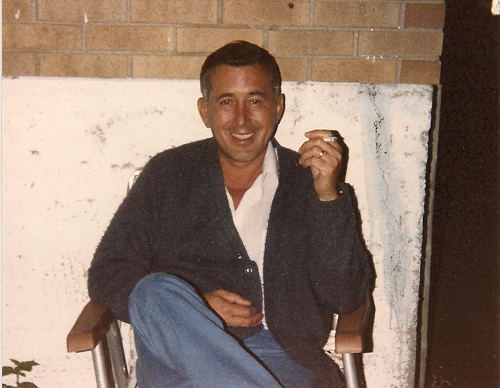
Daniel Paul, 41 years ago
Had Lots of Hair Then
Over the next several months I will be telling short stories, paragraph or two or three, of interesting people I've met since I was born in 1938, don't get me wrong, I really don't have any memories for the first couple of years. During my discourse I shall be using a couple of Mi'kmaq words because they fit the stories. When an Elder is talking to a young boy or younger man the so-called vocative case is used, i.e., kwi's. (pronounced gweees) For a young girl or younger woman it would be tu's. (pronounced dooos) Also, I'll be using Aunt and Uncle for Elders, it was the Mi'kmaq custom then, individuals who in many cases were of no blood relation.
(When an Elder is talking to a young boy or man the so-called vocative case is used, i.e., kwi's. (pronounced gweees) For a young girl or woman it would be tu's. (pronounced dooos) Also, I'll be using Aunt and Uncle, as was the Mi'kmaq custom then, for Elders who in many cases were of no blood relation. Explanation by Bernie Francis)

The National Indian Brotherhood
Renamed: Assembly of First Nations
The first person that comes to mind is Andy Paul, I believe at the time he was the President of the National Indian Brotherhood. He used to comes visit for several days in the early 1940s from time to time. The last time he came, as he was leaving, he told my father that he wouldn't be coming to visit anymore. Not very long afterwards he passed away. He had two brothers who were chiefs, Percy was the Chief of Membertou and John was the Chief of Bear River. Unfortunately, I neglected to get more information about them from my father, William Gabriel Paul.
The first person with a Black skin I met , I don't know his name, was when I was three or four years old, we were living on Brown Hill in a house my father had built on Shubenacadie Indian Reserve, now Indian Brook. He came knocking on our door one cold late fall night appearing to be half frozen, he was dressed in a light summer jacket, and asked if he could stay for the night. Of course my parents invited him in and fed him and he stayed for the night. He told my father that he was walking into Halifax to join the army and fight for his country.
He was a big man, however the next day, my father, a man of small stature in comparison, gave him one of his coats to wear when he was leaving, which was way too small for him. I can still see him walking away with his arms sticking out of the sleeves about six inches. He told my father that if he survived fighting for his country that he would return after it was over with a new coat for him and groceries. In the mid 1980s, while I was visiting my father, the incident came to mind and I asked him if he had returned. His answer was “yes”, with this added “Lord lightening Jesus boy how in the frig do you remember that, you were only about three years old!”
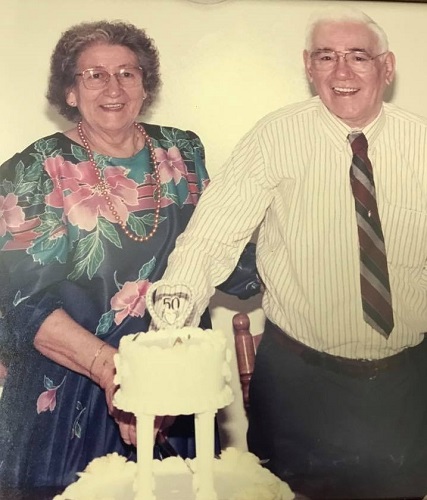
Chief Dan K. Stevens and wife Mary Jane (Gould)
Another regular visitor to our home when I was young was the late Eskasoni Chief Dan K. Stevens, originally from Millbrook, the son of William John and Annie Stevens. I think Annie was some relation to us but I don't know in which way.
Later Dan met and married a lady from Whycocomagh, Mary Jane Gould, and they moved to Eskasoni. I never thought to ask him if the move to Eskasoni was connected to the Department of Indian Affair's cultural genocide Centralization Plan in the 1940s. He later ran for chief and served the community well for several terms.
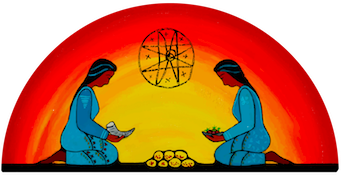
Union of Nova Scotia Mi'kmaq
During a three-month leave of absence from the Department in the mid 1970s I acted as liaison officer for the Union of Nova Scotia Indians (Now Mi'kmaq). Duties included actively participating in negotiations and other exchanges with federal, provincial and municipal governments, their agencies, and also private organizations and businesses.
One day I received a phone call from Dan, after we exchanged pleasantries he made this request:,. “Gweees, set up a meeting with the Nova Scotia Premier and his Cabinet for us.” I agreed and got to work on it, I can't remember what it was about, forestry or water rights probably.
I was very successful arranging the meeting, on the appointed day the Premier and his entire cabinet were waiting with me at 10:00 am in the Cabinet room for Dan and his Council to make an appearance. As there was no show by 10:15 I went and called the Eskasoni band office to see what the delay was. They put me through to Dan who shocked me with this. “Something came up Gweees that needs our attention here and I decided to let you handle the meeting in Halifax.”
At that moment, because I was in no way prepared for an in-depth discussion with the Premier and company about the problem in Eskasoni and other issue affecting all of the province's Mi'kmaq, I could have gladly kicked my friend's ass!
However, I met with the powers that be for over an hour and must of did okay because things turned out okay. On the way back to my office I began to laugh about it. A month or so later I ran into Dan and he commented: “Thanks Gweees, I knew I could count on you.” One of the most positive things about it was that it was a great learning experience for me, how to connect with the provincial powers that be, that was of tremendous help in later years when I was Superintendent of Lands Revenues and Trusts and Executive Director of the Confederacy of Mainland Mi'kmaq.
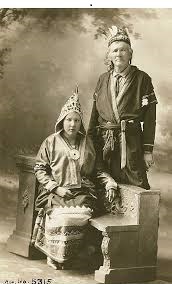
Mary Lonecloud and husband Jerry
Mary Elizabeth (Paul), Jerry Lonecloud's widow, a wonderful kind lady, she lived next door to us when we moved to Brown Flats, my father had built the house where she lived.
She was heavily into producing arts and crafts and she crafted fine baskets. When I was around seven or eight years old she took me with her to Halifax to sell her creations. We traveled by steam powered train on Indian Tickets, which the CNR provided for Registered Indians at a discount.
I think we were selling in the South end of the City, the ritzy district. At every door that I knocked on, or rang the bell, I was greeted with something like this, “A nice little Indian boy, selling baskets, come on in!” Almost invariably they gave me milk and cookies and allowed me to keep the change from their purchases.
I remember laughing with her on the way home about the outcome, with the cut she gave me for helping her sell, and the tips I made, I had made more money than her. I also remember that I didn't want to look at cookies and milk for many moons afterwards!
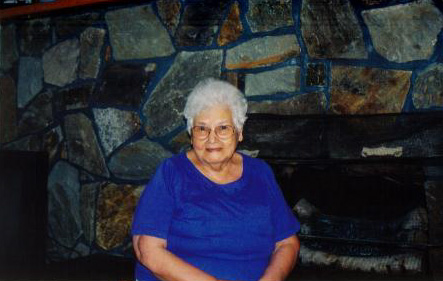
Elsie Basque (Charles)
Elsie Basque, the first Mi'kmaw to graduate from Normal College in Truro (despite the name it was a teachers college) and a lifelong friend. The first time I met her, although she had lived in the community for several years, was when I was around five years old. She had moved to Indian Brook to teach and in 1943 came to our house and knocked on the door. I opened it, the following response I made to my mother as I ran to tell her we had a visitor she and I would get a kick out of until Elsie passed away May 2016. She overheard me yell to Mom “There's an old lady at the door to see you.” She was around 27 at the time.
When they moved back to Nova Scotia from the States in the 1980s, she called me at Indian Affairs's District Office in Halifax to inquire about Indians Status matters, and opened the conversation with: “Danny, the old lady is back!” She is greatly missed by all who knew her well!
Interesting People and Events 2 - January 2017
Mi'kmaw Elder and Historian, Daniel N. Paul, C.M,, O.N.S
(During my discourse I shall be using a couple of Mi'kmaq words because they fit the stories being related. When an Elder is talking to a young boy or man the so-called vocative case is used, i.e., kwi's. (pronounced gweees) For a young girl or woman it would be tu's. (pronounced dooos) Also, I'll be using Aunt and Uncle, as was the Mi'kmaq custom then, for Elders who in many cases were of no blood relation.)
Humans have a tendency to view historical events through eyes that fit present day conditions, therefore, especially for younger readers, I'll set the stage for some of the stories I'll be relating over the next several months by giving a short description of the conditions the Mi'kmaq and other First Nations Peoples were living under in the 1930s and 1940s.
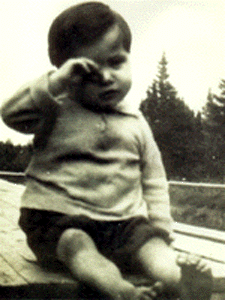
Daniel N. Paul
When I was born in 1938 Registered Indians had the same legal rights as insane persons and drunks, none. We were Wards of the Federal Crown and all our activities were governed by the provisions of the Indian Act, which at that time had some very discriminatory Sections that negatively affected our lives. For instances there were provisions that prevented a lawyer from representing us in lawsuits against the Crown without the permission of the Indian Affairs Superintendent General and we could be barred from entering poolrooms.

Sample - Indian Reserve Shack
Poverty was rampant and most of our homes were borderline uninsulated shacks. Diseases such as TB were very common and malnutrition was the norm for many. Indian Affairs rations were meager and only provided for the bare necessities. Much of our clothing were hand ne down Army and RCMP surplus. I'll put it this way, living conditions on our Reserves today would be a dream of Paradise come true for most of the Folks back then! If you want to learn more about the before-mentioned acquire a copy of We Were Not the Savages and read about it in detail.

William and Sarah (Noel) Paul - Evelyn and Daniel
I'll now give a little background about my roots. My father, William (Bill) Gabriel Paul, was born in Mushaboom, Halifax county, and was, because of it, called by some friends the “Mushaboomer,” he could not read or write. Mom, Sarah Agnes Noel, was born in Enfield, Halifax County, and had a grade 2 education.
At that time many of the mainland Mi'kmaq lived off Reserve, maybe the majority, in what the White man called “squatters settlements.” It puzzles me how the dispossed title holders to the land can be called squatters.
At this time the Department was trying to lure the “squatters” to live on-reserve. To this end it engineered in 1919 the surrender and sale of three Halifax County Reserves, Sambro, Ingram River and Ship Harbour. It then used some of the sale money to purchase a land addition to Millbrook Reserve, and encouraged the Halifax County Mi'kmaq to move there.
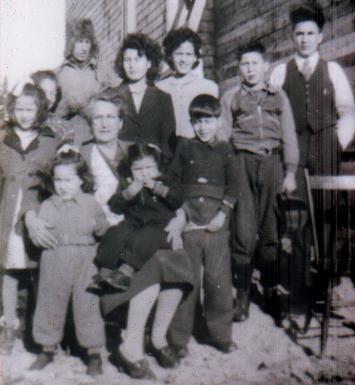
Grandmother Jane Duncan (Cope) and Paul Grandchildren
Back Row - Robert, Rhoda and John
Third Row - Jane, Violet and Lawrence
Second Row - Evelyn, Grandmother and Daniel
Front Row - Rebecca and Rosaleta
My maternal Grandmother, Jane MacDonald, nee Cope, moved there from Enfield. This is where my Mom and Dad met and were married. I was told it was quite a party. As Registered Indians they were prevented from having booze in their possession, internally or externally, by the provisions of the Indian Act, thus, my Grandmother cooked up a healthy batch of home brew.
From there my parents and a great many Mi'kmaq, including my widowed maternal Grandmother, moved to New Brunswick, where many of my 13 siblings were born. Brother Robert was born in a Poor House outside of Saint John, Lawrence, later the Chief of Millbrook for 28 years, was born in Saint John, which later caused many of the Maliseet Chiefs to haze him from time to time about being born in their territory.
They worked in many places throughout the province. The following happened in or near Eel Ground Reserve. They were living in a lumber camp site, where one day my father was walking past my Grandmother's camp, she loved eating wild meat, muskrat, etc., which among her grandchildren, I was the only one who would eat such meats with her, and he smelled a delicious aroma of stew being cooked.

Striped Skunk
He altered course and entered Grandmother's camp and commented about the delicious smell of what he thought to be rabbit stew. She offered him a plate, which, after eating he thought was so good he asked for seconds. After he finished the second helping he told her “Jane, that was the best rabbit stew I've ever tasted.” Her response shocked him “It's not rabbit stew it's skunk stew”, which sent him running outside to throw up. Many years later when he told me about it I asked him why, after all a skunk has a very good diet and you said it tasted delicious, it wouldn't have bothered me. His response “It was a skunk!”
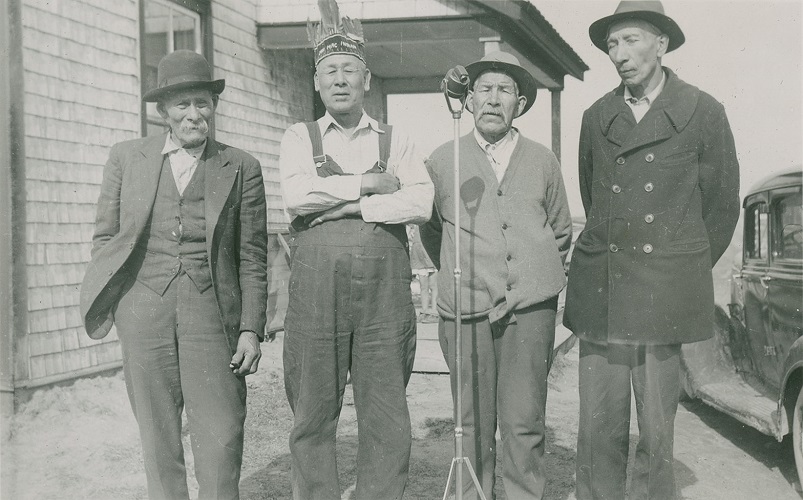
Chief William Paul, Martin Sack, Ben Knockwood and John Knockwood
The first wake I attended was when Uncle Ben Knockwood's wife Rose Anne passed away, I was five or six years old. We arrived at his home and Mom prayed and had tea and goodies and a good gab with the folks that were gathered for the event. After a couple of hours Mom said it was time to go home, to which plan I put up a fuss, I had come for a wake and I wasn't going to leave until they woke her up. The Elders in attendance patiently explained to me that she was gone forever and would never wake up. To this day I find it odd that they call such an event a Wake!
One day a few years later Mom sent me and my sisters Jane and Evelyn to Uncle Ben's, who was hard of hearing, to borrow a cup of sugar. He liked to bug. I asked him for the sugar several times and all I got was “eh, what did you say?” Finally, in exasperation, I turned and whispered to my sisters “the deaf old Bastard”, to which he said “I heard that and I'm going to tell your mother!” I fully expected to get a good switching for my disrespectful comment about an Elder, however, it never happened, he probably got a kick out of bugging me and driving me to do it.
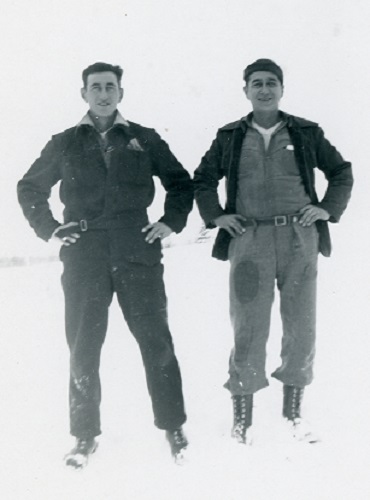
Isaac and Max Basque
Isaac and Max Basque, very nice men, were brothers who lived in Indian Brook when I was young. One Christmas in the 1940s, Elsie and Isaac told me to make sure that I came on Christmas day to see and play with something special that Santa was going to bring to Wilfred. Thus, early in the morning I headed over to their house to see and play with the special toy. It turned out to be an electric train, which, because we didn't have electricity on the Reserve at the time, was powered by battery.
As I recall quite clearly, Wilfred and I had “the time of our lives”, setting on two chairs the adult men situated us on to watch them, his dad Isaac, Max and Raymond Brooks playing with the train, I don't remember if we even got to play with it that day!
Max was a veteran of WWII, he was a great story teller. The one that has stuck with me over the years is the following. He was sitting in a pub in London England on leave when a very Elderly lady, probably in her eighties, walked in and took a seat at the bar. The bartender inquired of her “How are you today Mrs .....” Her response really floored Max “I'm all knocked up.” He wondered how could a women her age be knocked up? The answer was simple, in Canada it meant pregnant, in England it meant tired out.
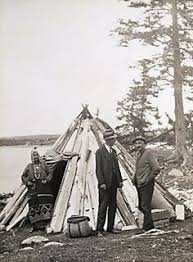
Susan Sack, Harry Piers, Henry Sack (1935)
Over my lifetime I've always had a special liking for Elders and Seniors. Thus, in the mid 1940s, I used to visit quite often with one in particular, Uncle Henry Sack, he was my maternal grandmother's first cousin, and a man who I greatly respected.
I returned home from Boston on vacation in the 1950s, with a hankering for a good feed of porcupine, which I soon hunted and my mother cooked for me. She then told me that Uncle Henry was gravely ill, which caused me hurry to his house to visit him. We chit chatted for awhile then he told me “gweees, before I die I would like to have a good feed of porcupine.” I told him, as chance would have it, that I had harvested one and that there was lots of leftovers, which I hurried home to get for him.
When I left him that evening, for what proved to be the last time, he was having a good feed. He passed away that night. It's always been my hope that he was greeted joyfully by the Creator when he arrived in the Land of Souls with a smile on his face and full stomach of a wild meat that he loved!
Interesting People and Events 3 - February 2017
Mi'kmaw Elder and Historian, Daniel N. Paul, C.M,, O.N.S

Parliament
In the mid 1930s the Great White Father in Ottawa decided that a plan should be developed which would see all the Mi'kmaq and Maliseet in the Maritimes centralized in four locations, two in Nova Scotia, Eskasoni and Shubenacadie, and two in New Brunswick, Big Cove and Kingsclear. The main aim of the proposed program was to solve the Government's “Indian Problem” in the Maritimes by the complete eventual assimilation of our people into the white culture, which goal I call cultural Genocide. Perhaps the Soviet Union was the model used.

Flag of the USSR
The partial removal of potentially trouble-making ethnic groups
was a technique used consistently by Joseph Stalin during his
government; between 1935 and 1938 alone, at least ten
different nationalities were deported.
In late 1935, to get the white supremacist racist inspired project under way, Canada's Privy Council retained Dr. Thomas Robertson to undertake an in-depth study of the living conditions of our People in the Maritimes. Robertson submitted his report to the Superintendent General of Indian Affairs on June 9, 1936. It is quite a document, full of BS and condescending demeaning generalizations. However, it was accepted as gospel by the Canadian Government. It is too large to be reproduced here, but, if interested, you can read the complete document in We Were Not the Savages.
Thus, by the early and mid 1940s the implementation of Indian Affairs' Centralization plan was in full swing. New land additions for the four Indian Reserves of the Bands chosen were being purchased and new Indian Agency offices were being built along with modern fully equipped homes for the staff of the Agency and the Indian Day Schools that were being constructed. No expense was considered extravagant to assure that these people had first class living conditions. I remember looking into the convent's dining room window, probably around 1948, when the Bishop was visiting from Halifax and saw the table set for him with fine china, silverware, and more food on it than I had ever seen before in my life on a table, it looked so enticing I was a hungry boy licking my chops.
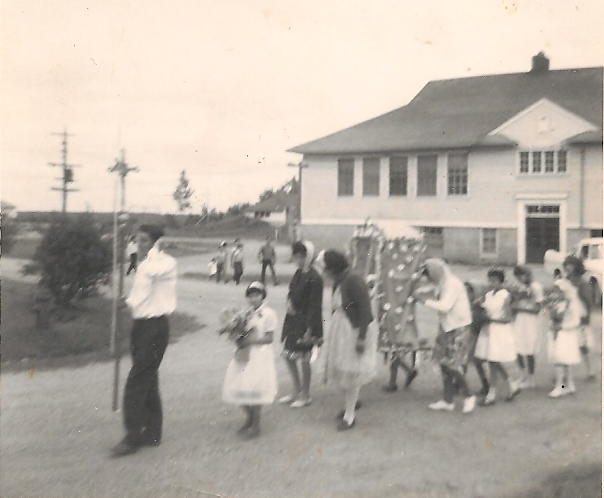
Indian Day School 1964
The new Indian Day Schools, when opened, were operated almost the same as Indian Residential Schools, no Indigenous languages to be spoken etc. The biggest difference was that we could go home at night. In Shubie the priest was the principal and Sisters of Charity were our teachers. Let's be kind and say that these educators made no effort to instill in us pride in our heritage but the opposite; according to them the white way was the right way.
New on-reserve lumber mills were opened and green lumber was produced to build uninsulated houses for the influx of Band Members into the selected Reserves from all over the Maritimes and Quebec. In Shubie the Agency brought in Mi'kmaq families from almost every community in the Maritimes and Quebec, there were even a few Maliseet families. Of course the hundreds of homes built with green lumber soon warped beyond repair and very few still stand today.
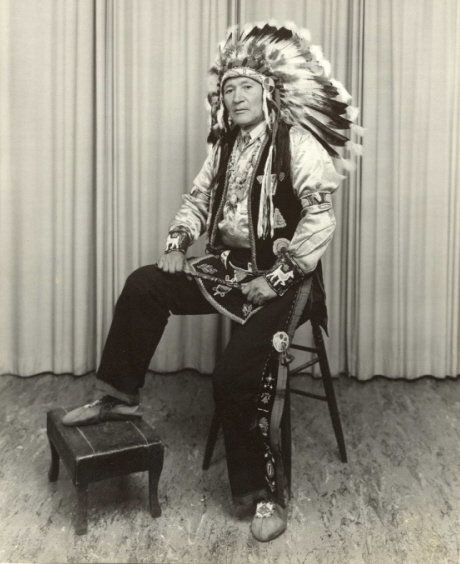
Chief Ben Christmas
Many of our Elders, seeing the evil design of what was to be implemented, were opposed to Centralization from day one. Foremost among them was Chief Ben Christmas of Membertou. When I was doing research for the Centralization portion of We Were Not the Savages I ran across the following quote from an Indian Agent's report to Ottawa that bespoke in Spades the racism that our people had to endure from many of these individuals who were supposed to be there to help us.
"It appears that Ben Christmas, an Indian of Membertou Reserve, Sydney, NS, who is considered to be somewhat more intelligent than the ordinary Indian. . ." [Mr. MacLean obviously had a low opinion about the intelligence of the Indigenous Peoples of the Americas and was amazed Mr. Christmas could rise above his standard.]
He continued: "I have been asked to inform you that no notice should be taken of letters from Mr. Christmas regarding the centralization plan, or from others who may write in this regard, as regardless of whose name may be used as a signature, Mr. Christmas is the man behind the gun."
The late Chief Ben Christmas has a high place among my heros.
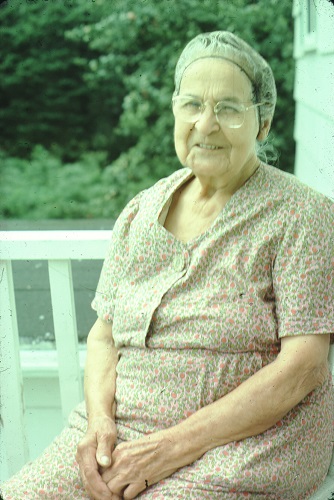
MargaretPhillips
Many others were involved in the opposition to the Plan including my Grandmother's sister Aunt Maggie (Margaret) Phillips. I'll use her to demonstrate how tenacious these people were when opposing things that they thought to differ with.
During her eighty fifth year Aunt Maggie was in Halifax's Victoria General Hospital, close to death, when I went in to visit her one evening.
As I was about to enter her room her doctor was exiting and asked me if I was a relative, I replied “yes, she was my Aunt.” He told me that he was very happy that I came in to visit her because he didn't believe that she would survive the night.
When I entered the room Aunt Maggie was in a bed with railings on both sides, holding on to both of them with a determined look on her face. The following words came out of her that I shall remember until I die: “Did you see that scallywag of a doctor when you were coming in to see me?” I responded “yes.” “Did he tell you I was going to die?” “Yes.” “Well I got news for him, I'll die when I darn well feel like it not when he tells me to!”
I came out of her room laughing and the doctor asked what I was laughing about. I told him that she had told me that she wasn't going to die. He responded “she is.” I told him I thought not and that I would be in the following week to visit her, which I did; by then she was well on her way to full recovery. By chance I met again with her doctor who asked me how I knew that she wasn't going to pass away that night. My response: “She told me so.” She passed away many years latter in her 99th year.
The Mi'kmaq and Maliseet owe a tremendous depth to the Band Members throughout the three Provinces who fought foot tooth and nail to defeat Centralization, for without their hard fought efforts our cultures may not have withstood and survived the onslaught!
By 1950 the Centralization Plan was a dead fish in the water. Perhaps the best testament to the failure of the centralization policy was contained in a report written by the Agent in charge of the Shubenacadie Indian Agency, H.C. Rice, dated March 23, 1949, to Indian Affairs in Ottawa. Therein he seems to suggest that force should be used to centralize all the Mi'kmaq on the mainland:
“It would appear that the time is past due when a hard and fast policy should be laid down respecting the position that the Centralized Reserve at Micmac (Shubenacadie), N.S., is to play in respect to the Indians on the Mainland of Nova Scotia.”
There was some funny, ludicrous and almost unbelievable things that were associated with the Plan. Ottawa bureaucrats decided that our people, without any experience in the vocation, should be seen as first class farmers. Therefore, many families were provided with small barns, cows, goats, pigs, etc., and we must never forget the seed potatoes and fertilizer generously supplied for our parents to reap “bumper” crops planted in soil that wasn't fit for such activity. I must close with this, many families, including ours, found the seed potatoes delicious eating!
Interesting People and Events 4 - March 2017
Mi'kmaw Elder and Historian, Daniel N. Paul, C.M,, O.N.S
Fancy cars were not part of my young life, I thought, at the time that they were something that was only enjoyed by white folks, for us, old clunkers. In this regard I'll always remember the old clunker that the late Ivan Knockwood owned in the early 1940s, it was the only car on the Reserve. It had to be started by a hand crank located in front of it. By the way, Ivan was once the Chief of the Shubenacadie Band.
One Sunday, when I was about six years old, we had gone to mass in the old church that was located at the front of the reserve's Cemetery. I, as usual hungry, after mass took off running for home in Brown Flats to have something to eat.
Upon entering the house I thought I had jammed my right hand little finger when the door was slammed shut by the wind and stuck it in my mouth. I asked my sister Rhoda, who was sweeping the floor in the dining area, what was for breakfast and she told me to wait until Mom got home. She then took her sweeping into the front room where she spotted something on the floor that got her screaming. I went to see what the fuss was about and she was pointing at the floor where lay one third of the flesh and nail of my little finger. I took my finger out of my mouth and had a look and joined her in the noise making.
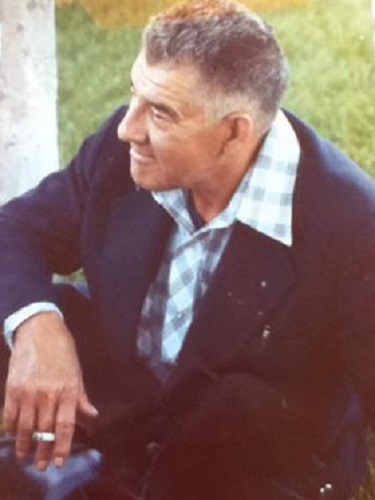
Chief Ivan Knockwood
When my Mom got home, as there was no ambulance services available at the time, and not a telephone on the Reserve to call one if there had been, she took off running for Uncle Ben Knockwood's house to see if Ivan, he would later be elected Chief of the shubenacadie Band, could get his old clunker running to take me to the doctors. After many tries, cranking and diddling with the under the hood gizmos, he finally managed to get it cranked up and running and we took off over the rough dirt roads for the doctor's office in Stewiacke, and then for the hospital in Truro. All in all, the time lapse from the time of the incident until I got medical attention was about six hours.
I mention the incident to point out how primitive our health care services were at the time. Should one have a stroke or heart attack on the Reserve in those days the chances of survival were slim.
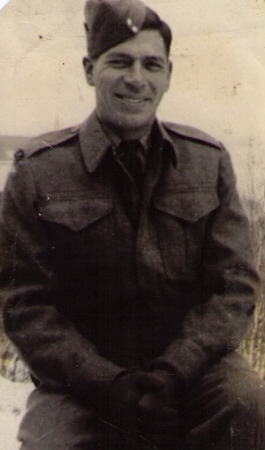
Chief Stephen Knockwood
Ivan was a young man who enjoyed playing pranks on people. I must admit that I helped him pull off a few. My Uncle Steve Knockwood told me this one about him.
After he and his family had moved to Shubie from New Brunswick in the mid 1930s they moved into the old schoolhouse whose yard was covered with old cans, bottles, and other trash. One early morning, after the family got settled into their new digs, he got busy and cleaned the mess up and carried it by the bag-fulls into the nearby woods, then went in to have a nap. When he got up just before lunch he looked out the window and discovered that most of the mess was still there.
Thinking that he may have been just dreaming about cleaning it up he did it again, however, this time he didn't have a nap. After he had been in the house for awhile he happened to look out the window and saw Ivan with a bag full of the garbage he had cleaned up busily spreading it around again. I'll leave it to your imagination what took place after that.
False prosperity was one result of Centralization, the new lumber mills and home construction provided many jobs and for a welcome change the paychecks were putting a bigger variety of food on our tables. In addition, the Canadian government began the family allowance program in 1945, which also enhanced the funds available to families to improve living conditions.
New clothing began to replace the surplus second hand military and RCMP clothing and hand me downs of the past and some new furniture was being purchased to replace the straw mattresses and hand made wooden beds and tables and chairs many of us had known to date. My first real bed and mattress was bought at the sale of departed Elder Tony's possessions.
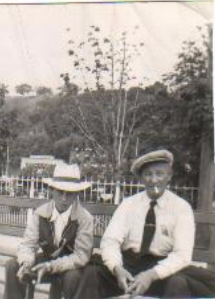
Daniel Paul and William (Bill) Duncan
Around 1948, I was ten years old, we were at
the Shrine of Sainte-Anne-de-Beaupré, Quebec
The kids of the community began to accumulate comic books and traded them among ourselves. Before my sister Violet taught had me how to read my sisters, Jane and Evelyn, and I would get our step-Grandfather, William Duncan (Bill) to read them to us. He would until he got tired of it then he would pretend to be reading in Chinese, French etc. and tell us that was the language they were written in. I suspected that he was pulling our legs and got Violet to learn me how to read. Which soon led me to know, as I had suspected, they were all in English.
Even some new and more modern used cars and pickups were being purchased. And some of the homes that were located along the road to where the new Indian Agency compound was situated were acquiring electricity and, some of them even got party line telephones.

Party Line Phone
For younger readers, and probably some not so young, I'll explain what party line phones were. The crank boxes they hung on were located on a wall. To make a call you had to turn a crank to ring the telephone operator to ask her to get you connected to the party you wanted to speak to. Each member on the party line had a certain number of rings allotted to him/her. When the phone rang, by the number of rings, you could tell if it was for you or another party on the same line.
This didn't allow for much privacy because another person on the line could pick up their phone and hear your conversation. I still chuckle about this one. A lady, wanting to make a call, picked up the phone and heard it was tied up by two other members of the party line. She listened and heard them talking about a personal matter of another person in a not true manner that she had personal knowledge about. Without thinking she blurted out “that ain't true!”
Spontaneous utterances sometimes get a person into a lot of trouble. The following happened at the Indian Day School when I was in grade six.
One of the girl students, although very intelligent, was quite a cheat, or, perhaps just lazy. Anyway, most times she would endeavour to get her tests and other school work done without expending much effort. She happened to have the school desk right behind me.
On an early spring morning, after the religious lesson was over, which had top priority with the nuns, our teacher informed us that she was going to give us a math test. I have a natural aptitude for math and as a result mostly scored 100 on the tests. Soon after the test started I caught my classmate looking over my shoulders trying to copy my answers. With this I wrote down all the wrong answers openly for her to see, which she happily copied. After she turned her paper in I stated that mine was too messy and I would do it over again. This time I put in all the right answers.
The next morning, after the religious class, the Nun said she would read off the results. My classmate's result was zero, mine was 100, which prompted my classmate to shout out “that can't be true, I copied all the same answers that Danny had!” Then, realizing what she had said, the shocked look on her face was classic, it said, “my God what have I done!” Surprisingly, she didn't hold a grudge, we got along fine afterwards, guess she concluded she had got what she deserved.
The moral of the story is use your own brain to get things done honestly, which in the long run will help you succeed in life. If you need help ask for it. Don't try to use the hard work of others to take shortcuts, because, when you have to do it on your own, you won't know how to do it!
Interesting People and Events 5 - April 2017
Mi'kmaw Elder and Historian, Daniel N. Paul, C.M,, O.N.S
NOTE: For my stories, because I was born and raised on Shubenacadie Indian Reserve (Indian Brook), I'm using events from that community for the early part of my stories, however, with some variation, the same kind of events happened in all of the four centralized Indian Reserves, Eskasoni, Shubenacadie, Big Cove and Kingsclear.
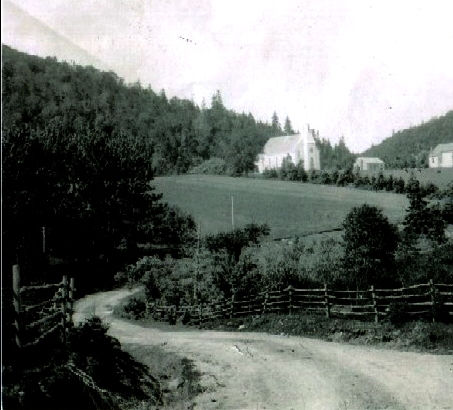
Eskasoni Road and Church - 1930
The following is a Centralization story from Eskasoni that I found to be symptomatic of the Caucasian Indian Affairs bureaucrats paranoid views when it came to the activities of our People. In 1946, the Indian Agent at Eskasoni Indian Agency, in a report to his bosses in Ottawa, regarding labour unrest occurring at the lumber sawmills in Eskasoni and Shubenacadie, stated that, in his opinion "there didn't seem to be any communistic influences.” In retrospect, in that era the Canadian and United States governments saw a communist hiding behind every leaf. The true fact of the matter is that most of our People at that time wouldn't have had the foggiest notion of what the hell communism was!
The false prosperity that Centralization brought to Indian Brook allowed the parish priest, over a number of years, to raise enough money from large multi day annual Saint Anne's Day celebration picnics, pie socials, etc., to build a new larger church to accommodate the communities vastly increased population.
When the new church was completed, for no rational reason known to me, the picturesque Saint Ann's Church was demolished. The inside of the church was beautiful, hand carved finishing, painting, etc. Even then, I was around ten years of age when it occurred, the demolishing of such a building, which could have been preserved and used as a museum, or cultural center for the community, was to me, especially when you could see the pieces of beautiful debris from the destruction laying about, a terrible waste of a historic treasure.
Another interesting event occurred during that period, several of our communities became host to many Inuit, then known as Eskimo, a name many of them find derogatory, suffering and recovering from tuberculosis (TB). The fact that they came from a different climate was evident one very cool summer day at the Saint Anne's picnic, most of us were wearing sweaters or jackets, they were setting in the shade finding it warm! Many of them could only speak Inuktitut, with no translators available communications for them were often difficult.
Centralization was an attempt by the Canadian government to commit cultural Genocide. I strongly believe that our leaders should revisit and review it and then instigate a class action lawsuit against the Canadian Crown on behalf of our Maliseet and Mi'kmaw communities. The sole purpose and reason for it's development and implementation was to completely destroy both cultures.
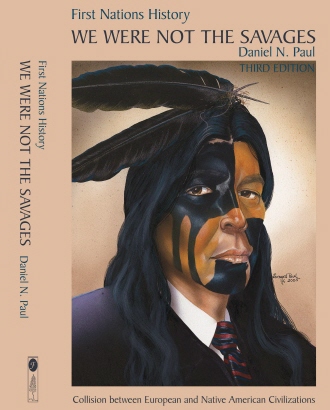
We Were Not the Savages - 2006 Edition
The following quote is from my book We Were Not the Savages:
“Without a doubt the policy of centralization was bankrupt from the day of its conception. It was a blatant attempt to implement cultural genocide! The same horrific practice of herding another race of people to another location in defiance of their wishes was used during the same period by another dictator, Joseph Stalin. During his reign of terror in the USSR, he deported several nationalities to far-flung parts of the former Soviet Union in order to destroy their cultures. However, he failed, just as the Department (Canada) failed in its attempt to destroy the Mi'kmaq and Maliseet Nations.”
With the collapse of the false economies created by Centralization, which were supposed to sustain the four Maritime communities indefinitely, there began, because existence was back to trying to survive on meager food rations, what I term an exodus of our Peoples, in search of a better life to far flung places in North America. Boston was the prime City chosen by the majority of Maritime First Nations People. Among the first families from Indian Brook to make the move to Boston were Elsie and Isaac Basque's, Billy and Mary Sack's, and Sandy and Mary Macdonald's.
In January of 1953, at the ripe old age of fourteen years, the stage was set for my move to Boston by the following incident, which abruptly ended my formal education at grade eight.
After Catechism class was over, Sister Superior turned her attention to giving us a grade 9 math exam, which she allotted one hour for completion. As I stated in another installment, I have an aptitude for math and completed the exam in about fifteen minutes. I turned it in to her and returned to my seat.
A few minutes later she called me up and told me that I had scored 100 on the test, however, as most of the class had not finished she told me to redo the exam, which request I refused to obey. Consequently, she sent for the Priest, who doubled as principal, and he escorted me off the school grounds. All this happened without any consultation whatsoever with my parents.
The following day my father asked the Indian Agent to intercede, which he did, and I was told that if I apologised I could return to class. I refused. Dad then asked the Indian Agent if he could arrange for me to attend school at Mill Village, which was about four walking KM from where we lived, which I would have had to walk every day, and he got this reply, “it would be too disturbing for the rate payers of the area to have an Indian attend their school.”
I then applied for a clerk job at the Indian Affairs Co-op store, which was a still functioning part of the Centralization Program, in due course I was hired at the princely salary of $8.00 per week, six days and one night.
The pay, although meager, did provide me with the means to acquire a few delights such as French Fries. When I was younger I had tasted them once at a restaurant in the village of Shubenacadie and found them delicious. From that experience I developed yen to have a good feed of them again. Thus, on my first payday, I purchased a peck of potatoes and a tin of lard and took them to my sister Violet's house to prepare a feast. We washed and cut the potatoes and melted the lard and fried up a delicious meal, which awoke in me a desire to have more of life's good things.
In early September of 1953, my brother Lawrence and our first cousin John Knockwood decided they were going to Maine to pick potatoes, and I decided to go with them. This decision effectively ended my childhood, for better or worse I was on my own.
After picking for a few weeks I met up with Joe Sack in Houlton Maine and we decided to head for Boston by hitchhiking, factually, we had no other choice because we had less than a dollar between us. Joe's family had lived in the City for several years, thus, for him it was returning home, for me, a boy who had only seen the small city of Halifax once when he was very young, hitting the big time was to be an eye opening experience.
If there ever was a pair of boys ill-suited for such a hitchhiking undertaking it was Joe and I. We were both shy and could no more bring ourselves to bum money and food than we could fly without wings. It was a trip full of hardship and it took us seven fourteen to sixteen hour days, much of it walking, to reach the City.
Most nights we stayed in jails, a few times we slept in hayfields. One night the jailor in Rockland or Belfast Maine, I'm not sure which, gave us some dog biscuits to feed a German Sheppard dog kept there by City's police force. We tried to eat a few ourselves but they were to hard. We did meet some kind people on the way. One day we got a short ride from the owner of a sardine cannery operation in Machias Maine, who gave us several cans of sardines, however, without a can opener they were useless to us.
Several day later, when we finally arrived at the Massachuetts border, a State Trooper stopped us and informed us that we were not allowed to hitchhike in the State and that we would have to walk, which we did.
On our walk into the City limits we took a wrong turn and ended up in East Boston, which added another five miles or so to the trek. We had to retrace our steps to the Mystic River bridge to get to the south end where Joe's family lived. When we arrived at the Sack apartment, at around 9:00 PM, we were in a exhausted dehydrated starving condition, Joe had lost 35 pounds and I, a bean pole to begin with, had lost 25 pounds, I was a walking talking skeleton! Billy, viewing our poor condition, probably with alarm, went to the deli and got a mixture of deli food for us to eat. We dove into it but I guess when a person goes seven days without much food and water the stomach shrinks and it doesn't take much to sate the person's appetite. After a few mouthfuls we could eat no more, however, during the next month or so food wasn't safe around us. When revisiting that hardship journey, I believe another few days of testing our endurance would have resulted in one, or both of us, giving the bucket a good kick, that is how bad off we were.
When I first saw the Beverly Hillbillies going to Hollywood in backwoods hillbilly style I said to myself there goes unsophisticated me going to Boston, without, of course, the oil money.
Interesting People and Events 6 - May 2017
Mi'kmaw Elder and Historian, Daniel N. Paul, C.M,, O.N.S
When I first arrived in Boston the social environment I encountered was almost completely alien to me. To see many homeless women called bag ladies, because they carried most of their possessions in shopping bags around with them, also many winos, beggars, etc., was shocking to my sense of fairness. It was appalling to see so much human misery being ignored in a wealthy society.
Although, I will admit, in some cases what one sees can be very misleading. On walking to work each morning I would encounter a very elderly beggar rooting through garbage cans for food. Each day I gave him a quarter so he could get a coffee and doughnut. Several months down the road he was missing from the scene. I then read an item in the newspaper, under a picture of him, that he had been found deceased in a room in a run down rooming house with over a quarter million dollars stashed away in it. In today's money it would represent several million dollars.
The Massachuetts and Nova Scotia of 1953 had something very nasty in common, which was most unpleasant for the victims of it to tolerate, intolerance. If they did not tolerate it they more often than not would wind up in legal trouble and in jail. In both jurisdictions intolerance ran rampant, and was even mostly acceptable in day to day communications between the powers that be. Hypocritically, both jurisdictions were openly critical and condemnatory of the segregationist policies of the Southern American States.
The main victims of these attitudes, as could be expected, were the Indigenous People native to the Americas and Africa. To hear the degrading terms “Injun” and “Nigger” was as common as hearing hi said today. It was useless complaining about racial mistreatment to officials of both jurisdiction, it fell on deaf ears and many times got one branded a trouble maker.
The vast majority of the hundreds of Mi'kmaq and Maliseet arriving yearly in the Boston area were the same as me, young, undereducated, and carrying a large inferiority complex on their backs. The latter visited upon us by our Caucasian educators and treatment as racial and intellectual inferiors by Indian Agency staff. In later columns I'll be giving many examples of this. The sexual orientation of individuals was also openly scorned, homophobia was widespread, the use of derogatory names for Gays and Lesbians were about as common as was the use of degrading names for us. And they often were subject to being beat up.
This brings to mind the following early 1950s story that involved me and my late good friend Victor Alex. One evening I met a very cheerful and excited Victor on Tremont Street and asked what had put him such a good mood. He replied that he had a date that night with a lady he was crazy about, it might have been Leona, I can't remember. In parting we agreed to meet the next morning at the Dover Street Diner for breakfast, a hangout for so called macho men, construction etc.
Victor's first language was Mi'kmaq, thus, he had some problems with English, and often said him for she and he for she, I have two cousins in New Brunswick that have the same problem. In any event we met for breakfast and I asked him how his date went. Hi response was precious and I thought it would get us trounced. He said, “Oh Danny, he was wonderful...”! The machos, of course, began to give us the look that spelled trouble which caused me to quickly blurt out “Ah, Victor, because of your English language difficulties you've got it mixed up again, you had a date with a she not a he.” Thankfully, they went back to eating.
Because of the advanced arrival of many Mi'kmaq families in Boston by 1953 I never felt homesick, childhood friends such as Richard, Joe and Levi Sack, along with many of my cousins and others that would soon be my friends from many other Maritime Reserves made it feel like home away from home.
Being only fourteen at the time I needed a Work Permit to seek employment. My Uncle Sandy Macdonald solved the problem for me by claiming to be my legal guardian when he signed the application forms.
The first job I acquired was working in a Cafeteria as a bus boy. To try to fill the empty hole left in my stomach by the loss of 25 lbs during our hike from Houlton Maine I would eat breakfast home, eat it again when I got to work, have a big lunch at the Cafeteria and dinner before I left for home then have dinner again at home.
The Cafeteria was where I met my first Jewish person. A very nice and very elderly man came into the restaurant every morning to have breakfast. We would chat about this and that each day. One late September morning he comes in as usual and takes his seat at his favorite table and wishes me a Happy New Year! Without missing a beat, thinking he was kidding, I wished him a Merry Christmas. He got a big kick out of it and then spent about ten minutes giving me a short overview of the Jewish religion. Thus, was the end of the bit of religious intolerance that the Nuns had instilled in me.
Finding work in the Boston of the 1950s was as easy as going to bed a night. Didn't like what you were working at in the morning you could be working somewhere else in the afternoon, one drawback, most of it was at the minimum wage.
At one of the over 100 hundred factories where I had worked I had my first blatant racial experience in the City at a box factory. On a beautiful warm spring day we decided to have our brown bag lunches in the backyard of the factory.
About ten of us were setting around in a circle when the conversation got around to racial origins. The guy setting next to me on my left went first and related his Italian ancestry. Around it went, revealing a wide variety of racial origins, then it came to me. Instead of revealing mine I asked them to guess. Due to my dark complection, which can get very dark during the warm seasons, the guesses went from black Italian, Arab, etc., etc. Finally, in exasperation, one of the guys said there is only one other race you can be, an Indian.
I agreed, and immediately felt a very negative change in attitudes towards me. Individuals who had often chatted with me started avoiding me, it was as if I had admitted to having many highly contagious social diseases. Being young, and still not the human rights fighter I would become, after a few days of it I said frig it and got another job.
Sometime being discriminated against can have a funny side. Around 1957 my Aunt Leta and her Granddaughter Rhoda Bard, and my cousins Florence and Mary Marshall (Millbrook) and I decided that we would travel to New York City to take in the New Year's Eve celebrations.
I drove my Aunt's car into the City and then looked for a parking garage to store it in until we were ready to head back to Boston. After finding a suitable garage we acquired a taxi to take us to the YWCA and YMCA, where we were planning on staying for two nights. As none of us had ever stayed at a Y before, after we boarded the taxi, my Aunt asked the driver if anyone could stay there. He responded in a heavy Brooklyn accent “Yes, anyone but dogs and Indians.” My Aunt responded “well tonight five of us are staying there.” The poor man was so embarrassed and apologetic that he didn't know what to say at first. After apologizing he took us to the Y's and wouldn't accept payment. The next day he picked us up and gave us a free tour of the City's big tourist spots.
In the mid 1950s I read a Boston newspaper item about a racial incident involving a Cherokee and the Ku Klux Klan in South Carolina. The story related that a young Cherokee lad had become engaged to a White lady, an event that the Klan took grave exception to. Thus, one evening they burned a Cross on the lawn of the offending Cherokee. The following night, mysteriously, three Klan homes burned to the ground. The wedding went off without a hitch!
On e of the most devastating life ruining things encountered by many of our Maliseet and Mi'kmaq brothers and sisters in Boston was Muscatel, once it got a good hold it was extremely hard to get it off one's back. Two of my first cousins and an uncle were victims.
The following is John Knockwood's and my experience with it:
“One day we decided to experiment with Muscatel, the favourite alcohol drink of quite a few of our First Nation compatriots in Boston. Which, unfortunately, became the means to the end of the road for many of them. We wanted to satisfy our curiosity about why the drink was so delectable to them. Thus, to obtain the material needed for the experiment we went to the liquor store and bought a case of twelve bottles of the “fine wine.”
Upon our return to our apartment, the test got under way immediately. We each opened a quart and very quickly consumed it. By the time we got four each down the hatch, it was lights out time. When we awoke the next morning, we were the sickest, most dejected, possessors of the worst hangovers we had ever had. In fact, even today, I can't recall ever being so sick. After the passage of a few days, and the slow return to normal health, we concluded that once you drank Muscatel, unless you were able to muster the courage to stop and deal with the mighty ghastly hangover as we had, you had to keep drinking it until the end. From our point of view, it was the only way to avoid the god-awful sickness that came from consuming it.
The remaining four quarts sat on the kitchen counter for many months. Finally, I got sick of looking at them and asked John when he was going to finish them off. His response: “You think I'm crazy, I've been waiting for you to do it, I'll never drink that stuff again as long as I live,” to my knowledge he never did, nor did I. This led to an event that would have cast us in the eyes of the City's Winos as monestrous abusers of what they considered their sacred champagne, we, without ceremony or sense of loss, poured the four remaining down the drain.
Interesting People and Events 7 - June 2017
Mi'kmaw Elder and Historian, Daniel N. Paul, C.M,, O.N.S
After I established myself in Boston I waited, in case they would try to force me to come home, until I turned sixteen before contacting my parents to let them know I was doing okay. Which they probably knew anyway from family contacts.
Working at several jobs I had by the summer of 1956 saved enough money to return home for a vacation. In need of transportation to travel to Millbrook, and other Indian Reserves, and nearby beaches, I hitchhiked to Waverley's used car dealership where I purchased my first car for $200.00, a 1946 standard shift Plymouth.
The salesman asked me if I had a driver's licence and I told him no. He then asked how I planned on getting it home, I informed him I would be driving it. Because I had never driven a car before he showed me how to shift gears etc. I then drove away, kind of snake driving for the first few miles before I got the hang of it.
The next day I went to Reid's Store in Shubenacadie and got a copy of the driver's learning manual, also to make an appointment for a driver's test the following week. When I went for my test I discovered that the store owner, Reid, was the person who was the appointed tester. I answered his questions correctly, then he gave me a remote driving test. He told me he wasn't crazy enough to actually get in a car and go for a drive with a beginner and gave the driving test by looking out of the store's big front window. I left the store and got into the car, drove ahead a bit, backed up a little, parked and went back into the store and got my driver's licence.
I, with the company of many friends, had a great time that summer hitting the beaches, movie drive-ins, etc. I'll just mention one of the crazy things we did. There was an Esso station on the corner of Willow and Prince Streets in Truro which was offering a free coke to every person in a car with any gas purchase. I went to Millbrook and loaded the car with twelve friends and then we did a money collection, which added up to a grand total of thirty five cents. Off to the station we went and made our purchase, then demanded our cokes. The owner took a fit, but, after a heated debate, reluctantly produced the pop as stipulated on his sign! To this day I don't remember what I did with the car when I returned to Boston that late summer, probably gave it away.
Upon my return to the City I decided to get a Massachuetts Drivers Licence. On the day of the test, in comparison to what I had experienced in Nova Scotia, I was to be tested by a qualified state official. After being told by some friends how hard it was I was in a real sweat.
The verbal test went fine until he asked me what a yellow and red light signified. My answer was a super blooper, “you had to stop to allow Presbyterians to cross the street”, which probably gave him and his colleagues something to laugh about for many Moons afterwards. He, in jest, asked me if I ran over Catholics, Baptists, etc. It put him in such a good mood that he, instead of taking me for a long driving test, said “you already have a valid Licence, lets just drive around the block, that will be good enough.”
During the intervening years, between 1953 to 1960, I returned to Maine for Blueberry picking and Potato picking and to Nova Scotia for vacations on several occasions. The following are a few examples of the highlights of those years,
John Knockwood, Lawrence and I were picking potatoes at a farm near Mars Hill, Maine, where an elderly wealthy couple from New York City, who had done just about everything in the world that lots of money permitted individuals such as them to do, decided they would come to Maine to pick potatoes for a few weeks for a change.
It was funny to see them drive up to the potato field from their motel in a big Lincoln Continental each morning. Being novices at picking, although they had only a two barrel section, they were often way behind in picking. At the end of the day I would help them catch up and have long chats with them, we became good friends.
Toward the end of the second week they asked John and Lawrence if they could take me back to New York with them. As an inducement, they informed them, as they had no close relatives, that they would provide me with a good education and leave me everything they owned. My brother and cousin told them it would be up to me.
The next day they asked me if I would be interested and I told them I would think about it for a few days, after which I declined their generous offer. In later years, when I would become aggravated with things at my jobs at Indian Affairs and the Confederacy of Mainland Micmacs Johnny would often say, with his giggle to bug me, “don't you wish you had gone to New York.”
This one happened on route 2 In Nova Scotia, probably around 1958. A little background. There were no super highways in the Province at the time, and not that many cars, and speed limits were quite loose and not well enforced.
CAUTION: Don't even think about doing something crazy like the following in this day and age, with hundreds of thousands of additional cars on the road, it was crazy then, it would be suicidal now!
On a nice warm summer day John Knockwood, Eddy and Pat Paul, Roland Marr and I were In Truro in John's old Dodge, getting some non Indian to go into the Liquor Store to buy us some beer because it was illegal for us to get it on our own. On our way back to Shubie, with John driving, and me in the front passenger seat, we got into a car race with another car full of young lads.
We were barreling along the highway at 100 miles per hour with the other car closely on our tail when we came to the area in Alton where the road from Short's Lake connects to Highway 2. Coming around the bend in the road we could see a pickup truck stopped at the Stop sign.
This is where things got heart stopping. With not a snowball's chance in hell of us stopping the pickup pulled out on the highway. As chance would have it two other cars, doing what we were doing, were coming in the opposite direction.
John leaned on the horn and the pickup pulled over enough to allow us to squeeze through. To this day I'll swear that no more than a cigarette paper separated us. If not for John's excellent driving reflects our near miss would have set the all time record for the worst car accident in Nova Scotia History.
In stunned silence, and at a very reasonable speed, we continued on to the Village of Shubenacadie. The thing that finnally broke the tension I still laugh about to this day. As we were coming into the Village I looked into the back seat and saw only Eddy and Roland. I asked Eddy “where's Pat?” He responded “he's still on the floor curled up with his hands behind his head.” I then yelled “hey Pat, you can get up now we made it!” Pat got to his knees and looked around with a sort of astounded look on his face and stated: “Hey, being dead is no different than being alive, everything looks the same!”
Resulting from this near miss, John Knockwood and I, in recognition that a near miracle saved us that day, never got into a car race with anyone again!
Interesting People and Events 8 - July 2017
Mi'kmaw Elder and Historian, Daniel N. Paul, C.M,, O.N.S
From 1953 to 1960, which was the year when I returned home to Nova Scotia for good, I met many interesting people in both Boston and during my visits home. The following are a few.
First, a little background. Until 1995 there were no superhighways between Nova Scotia and Portland Maine, just Routes 1 and 2, which were routed through every big and little hamlet from Halifax to Portland. The turnpike, route 95, was extended from Portland to Augusta in 1955. Thus, to travel from Indian Brook to Cherryfield or Bangor took approximately 20 to 22 hours, to Boston add another 10 hours. With the superhighways of today the trip to Boston is around 14 hours.
I still laugh about some of the eccentric folks I met in Boston. When I was working at one of the many factories that I had worked in I met and elderly gentleman who had been employed there for most of his life and was nearing retirement. He was a loner and rarely talked to anyone, and other employees mostly left him alone.
One day, when we were working together, I asked him what his retirement plans were, his response was an eyeopener that only a true naive big city born and raised person could come up with. “I'm going to buy some land in New Hampshire and start a chicken farm, and I'm only going to raise roosters because they lay the biggest eggs.” Suppressing my mirth, I gently explained to him that roosters were male and didn't lay eggs. From the skeptical look he gave me, I didn't think he fully believed me, thus, I've often wondered if he followed through with his original plan and got the surprise of his life when the rooster eggs he expected didn't appear!
When I was about eighteen I was working at a hat factory where I met a very robust middle aged Black lady who originated from Mississippi. She was, besides the negative Indian Agent who had made my mother beg for food when I was a youngster, the positive person who helped plant the seeds in my head that would eventually turn my life around.
On the many occasions that I chatted with her she told me many stories about the hardship and humiliation her family had suffered under the State's segregation laws before she moved North. And I told her about some of the racism we suffered as Registered Indians.
Our chats had made her aware of my lack of self confidence and self esteem and she decided I needed a good pep talk. Thus, one day she invited me to have lunch with her and during it she got right down to business. The following is gist of her pep talk. She asked me what I knew about the history of my People, to which which I responded was very little except for what negative things I had been taught in school and garnered from the contents of radio programs, movies, cartoons and other sources, which relayed to us that we were the children of uncivilized bloodthirsty savages, which created in most of our young minds low self esteem and inferiority complexes.
Her response, as near as I can remember: “You walk around here with your head down and give the impression that you think that White people are better than you. Well I suggest that you get your head up off the ground and realize that you are just as good as any of them and in many cases probably much better. Learn the true history of your People and I think you will most likely be very proud of your heritage because what the White man has invented and used to demonize and dehumanize them is more than likely a pack of lies.” I eventually followed her advise, found and collected the historical material needed to refute the historical lies of the European invaders about our ancestors, put it into We were Not the Savages and became extremely proud of my Mi'kmaq ancestors and the culture they created!
During the summer months I often returned home by train or bus for vacations. In the mid fifties Dad bought a car and, as he couldn't drive and didn't want to learn, friends such as Norman Brooks and Stephen Joe Julian (Ekian Joe) drove for him.
During my trips home I often took my parents for visits with relatives. On one such trip I took them to Cape Breton to visit relatives in Waycobah (Whycocomagh) and Potlotek (Chapel Island). First we went to Waycobah and visited with the Sylliboy, Gould, and Googoo families. Grand Chief Sylliboy, who I believe was my father and grandmother Jane Duncan, nee Cope's first cousin, took us on a tour of the Cabot Trail, which at that time was still mainly a dirt road. When we returned we visited with Roderick Gould and family and some of the Googoo relatives.
The next day we travelled to Potlotek to visit Rosie Marshall, nee Googoo, who was my mother's second cousin and her best friend when they worked in Truro as maids and was the Matron of Honour at my parent's wedding. They had a good time chatting about the good old days with relatives they rarely had a chance to get together with!
On a few of my visits home I hung around with Barry Moore, a friend from Membertou. One summer in the late 1950s I went to Chapel Island for the Saint Anne's event and met up with him, Gordon Christmas, and several other friends. To have some fun we acquired food and beer and managed to sneak it all to an Island off of Chapel Island for a party. A good time was had by all.
The next day, which was a beautiful sunny one, Barry and I, just a little hung over, or, as my father used to call it, “overhung”, took the family boat and some beer and set off for a trip around the Bras d'Or Lake. We eventually came to a Lighthouse where the Keeper had racks set up on which he was drying salt cod fish. We went ashore and introduced ourselves and had a few beer with the Keeper whose wife gave us a great dinner.
This is where it got a little crazy. We asked the Keeper how much he wanted for the fish and he told us five cents a pound, which we thought was great and purchased just about all he had.
I can remember this as if it was yesterday. Barry was at the rear of the boat handling the navigation and I was at the front with a huge pile of dried cod fish separating us when Barry stated “We sure got a great bargain didn't we Danny?”. My response “We sure did, now what in the hell are we going to do with it?” Our solution was simple, when we returned to Chapel Island we docked the boat and yelled “on the boat is a pile of salt cod fish help yourselves,” within minutes it was gone!
Another summer I took my parents to New Brunswick to visit relative in Burnt Church, Big Cove and Indian Island. Burnt Church was our first stop.
At the time my father's nephew Frank Paul was the Band's Chief. Frank was a little ahead of the game when it came to lobster trapping and gave us a great feast of the delicacy from what was then, in the White man's view, an illegal harvest. He was the son of Dad's brother John (Jack) Paul and his wife Bernice, nee Augustine.
The next day Frank's nephew John Paul, the son of his brother Wallace, and I, without parental permission, decided we would go out into the Bay in a small aluminum boat to visit several small islands. We had a great time exploring, swimming and fishing.
Late in the afternoon, nearing the supper hour, and being young lads with bottomless appetites, we decided to head back to the mainland to find sustenance. It was a perfectly sunny day.
When we were still a few mile off shore from our destination I looked into the area behind Burnt Church and saw huge black clouds heading towards us. Suddenly the wind was howling, the rain pouring, lightening and thunder putting on a light display and one heck of a noise, and the waves were huge and coming over the sides of the boat.
John was navigating and shouted to me “grab that bucket Danny and bail for our lives”, which I did. We were almost ashore when the boat finally started sinking and several young men, among the large crowd of people watching our struggle for our lives, ran out into the water and dragged us ashore.
Our parents and cousins were so happy to see us make it to safety that they showered us with hugs and kisses. After which, of course, we were subjected to a great deal of reprimanding for our unauthorized and reckless behaviour.
At the time when we took our trip to the islands my late cousin John was about 15 and I 17. During the day, while he was telling me some of his fantasy adventure stories, he had the following as an opening for one them, which I will chuckle about until the day I die: “When I was a descent young man in my moccasins...”
I'll save Big Cove and Indian Island until the next time.
Interesting People and Events 9 - August 2017
Mi'kmaw Elder and Historian, Daniel N. Paul, C.M,, O.N.S
Continuing the story where I left off in my last article. After Esgenoopetitj (Burnt Church) we went to Elsipogtog (Big Cove) to visit my father's niece Rhoda and her husband Mike Francis and their many children. She and her family made us welcome with a feast of fresh fish and eels and her delicious home made bread.
In Shubie, Maine, Boston and New haven, Connecticut, I met three other members of Uncle Jack's family Serena, Hazel and Wallace. Serena was a very pretty young woman who had a very pleasant attitude. I named my youngest daughter after her. Wallace often came to visit us in Indian Brook, an Indian reserve belonging to the Sipekne'katik First Nation. In Hazel's case, I met her in Boston in the early 1950s after her and her husband Louie Martin moved their family to that City from Esgenoopetitj. Before arrival in Boston her only experience with how the White man lived was occasional visits to Newcastle, New Brunswick.
Hazel was one of my relatives who matched my unsophisticated Beverly Hillbillies demeanor with ease when she first hit the big time. In addition she had another problem, her first language was Mi'kmaq, and because of it she had some difficulty conversing in English. The following is one of her experiences that we still laugh about to this day.
Shortly after they had moved to Boston a bunch of relatives from home had arrived for a visit. While they were visiting she got a hankering for a feed of lobster. With very little money in her pocket she went to the Faneuil Hall Marketplace, which at that time was a Farmer's Market and not the tourist attraction it is today, and purchased a two pound cooked lobster.
On her way home to Auburn Street in the West End it dawned on her that if she went there with her prize that the visitors would want some of her delicacy. Therefore she went in search of a suitable place where she could enjoy her feast without interference and without guilt for not sharing with relatives.
Her search took her to downtown Boston where, as she walked by, she spotted this fancy place with tables setup with fancy cutlery etc. What a find! She went in and sat at a table took out the lobster and began to tear into it. This soon brought out some very helpful attendants who helped her and provided some potatoes, salad and other essentials to go with her feast. Needless to say she was very impressed with the generosity of these very fine public servants.
After she finished up she came home and told me about the great experience she had in finding and utilizing such a delightful place. I thought I would piss myself laughing, the place that she thought was a public dining room was none other than Boston's famous Parker House, one of the City's most elegant restaurants! The staff must have recognized her situation and naivety and decided to give her an experience that she wouldn't forget. Which we haven't!
After leaving Elsipogtog we headed to Indian Island to visit with dad's niece Laura and her husband Peter Barlow. In Laura's case I think Dad had, although he didn't say so, an extra soft spot for her because she had been the apple of his late baby brother Jack's eye.
This was an unforgettable visit. Anyone who knew Peter would know that with him there were no stops left not pulled when it came to entertaining visitors. He quickly rounded up some rum for him and Dad and some beer for me and fresh fish for a feast and the party got under way. He and my father hit it off and enjoyed each other's company and some rather loud debates, especially about ancestry. I've got a few tales to tell about my future funny encounters with Peter but I'll leave them to later installments.
In 1960, at 21 years of age, I was working at a Boston wood working factory and making fairly decent money for a change when my brother Lawrence contacted me and asked me to come home and be the best man at his forthcoming August wedding to Angeline Julian. I agreed and made the trip.
The day of the wedding was very hot and muggy, the temperature was 100 degrees Fahrenheit and the humidity was 100%, it was sweltering. I was dressed in a black suit and in my opinion looked pretty sharp, with a white shirt and tie.
On our way to Truro for the wedding we stopped at Herbby Williams Shubenacadie Shell station to get some gas. His wife and their two very young daughters, ten or so, were at the station and they asked their mom who the well dressed young man was, she told them that I was the new minister for the communities United Church. This news of having a young person as their minister got the kids all excited, it lasted until I told them that their Mom was just kidding them.
The Catholic church in Truro was hot, the elderly priest was slow, one and a half hours for the wedding, thus, when it was finally over, I headed for home and quickly exchanged my black suit and tie for chinos and a T shirt. That night, at the wedding reception, I saw something that left me awe, I won't mention any names, don't want to embarrass anyone, but the following is the gist of the story.
A lady asked another very elderly lady, who was helping with preparing the food for the guests, “do you want a drink of whiskey Auntie?” She replied “yes”. The lady then took a very large glass from the cupboard and poured about an inch or so of liquor into it. Auntie commented “I thought you asked me if I wanted a drink, but you're only offering a sip.” The lady passed Auntie the bottle and told her to pour whatever she wanted. Auntie took the bottle and filled her glass to the brim. She then knocked it all back without a pause. I amazed thought, “Lord almighty that should eventually put her out.” It didn't, Auntie carried on helping throughout the evening without batting an eyelash!
A few days later I caught an Acadian bus to Saint John, NB, where I booked a Greyhound trip to Boston. On our way into the City I was looking out the window at the depressing scenery and said to myself “what in the hell am I doing living in place like this and returning to a go nowhere job?” This was the moment when I decided that I would do what the Black lady in the hat factory had advised me to do, get a better education and learn about my people's history.
Upon arrival early that afternoon at Boston's Greyhound terminal I booked a return trip to Nova Scotia. Then I called my boss and told him I wouldn't be back and gave him an address where to send the money he owed me. I also called my aunt Leta and informed her of my plans.
Upon my return home, with the knowledge that my late brother-in-law John Lewis and a good friend, the late Noel Knockwood, had studied there and obtained good jobs afterwards, I journeyed into Truro and applied for admittance to Success Business College. Helen Wright, the principal, approved my application with this caution, “most of our students are high school graduates, or have at least completed grade eleven, so with only grade eight don't expect to do well competing against them.”
With College acceptance in hand I returned home and went to see the Indian Agent at the Shubenacadie Indian Agency for funding and was turned down with great negativity and with a total amount of enthusiasm by my so-called trustee, and a person supposedly dedicated to helping us improve our living standards by improving our level of education with this statement, “Why don't you go get a pick and shovel and do what you're best suited for instead?”
Throughly pissed off by his refusal I went to see my late Aunt Rebecca Pictou, who knew the area's MP, Cyrille Kennedy. She got on the phone with Kennedy and related the tale and by the end of the day I received a message that the Indian Agent wanted to see me, when I arrived he reluctantly informed me that my funding had been approved.
As for Mrs. Wright's caution about my chances against better educated Caucasian students I've always savoured these quotes from a letter of recommendation she wrote for me: “Mr. Paul has a real aptitude for figures. He completed the Introductory and Advanced Sections of 20th Century Bookkeeping and Accounting in record time and in addition, gained a reasonable knowledge of Job Cost Accounting... We believe Mr. Paul could handle a job requiring some judgement and responsibility, and we are glad to recommend him accordingly.”
This was the day I came to believe, and became throughly convinced, in spite of being taught by Caucasian society that we were the children of an inferior culture and somehow intellectually shortchanged, that the First Nations Peoples of Canada would one day overcome, and once again become masters in our own house! I am happy to report that we are well on our way.
The Reverend Martin Luther King Jr. said the following about the creation of the United States of America, which observation is equally applicable to Canada's creation.
"Our nation was born in genocide when it embraced the doctrine that the original American, the Indian, was an inferior race. Even before there were large numbers of Negroes on our shores, the scar of racial hatred had already disfigured colonial society. From the sixteenth century forward, blood flowed in battles over racial supremacy. We are perhaps the only nation which tried as a matter of national policy to wipe out its indigenous population. Moreover, we elevated that tragic experience into a noble crusade. Indeed, even today we have not permitted ourselves to reject or to feel remorse for this shameful episode. Our literature, our films, our drama, our folklore all exalt it.”
Interesting People and Events 10 - September 2017
Mi'kmaw Elder and Historian, Daniel N. Paul, C.M,, O.N.S
After I finished Business College I was informed by a friend that the Shubenacadie Indian Agency had openings for two office clerks. I submitted an application and was hired as was a young White lad who was, as was I, just out of school.
This is another instance where Indian Affairs displayed it's racism when dealing with the People it had a trust responsibility to promote the aspirations of for a better life. I had the better qualification, however, the White guy got hired full time while I was told that I would need to be trained for six months. To add insult to injury the Indian Agent called me into his office and admonished me, assuming because I was a Registered Indian I couldn't be discreet and responsible, that I would be seeing confidential information and must keep my mouth shut. I mulled it over for about fifteen minutes, then walked into his office without knocking, and told him to shove the job up his arse! It kind of left him shell shocked. He was used to calling the shots and being treated like a boss hogg because he controlled the food, housing, etc., distribution when it came to the welfare of our People and could withhold it if he choose, thus, he didn't anticipate that one of us would treat him in such a “disrespectful” manner!
The next day I hiked into Halifax and went to the unemployment office and was referred to a assistant accountant position with the now defunct Nova Scotia Abattoir and was hired. My boss, the Financial Controller, was a math nerd who could add up a column of figures without using an adding machine, unfortunately for me his totals were correct nine times out of ten, in bookkeeping it must be ten times out of ten. Thus, because of his mistakes, I burnt much midnight oil balancing the firm's books of account.
The plant manager, who had been recruited from where he was managing a slaughter house out west, where he had many Cree men working for him, was interested in doing the same in Nova Scotia. He told me that they were his most productive workers and that he would be open to hiring local First Nations people and asked me to see if I could round up a few for him. I went to Shubie that weekend and the only one that was interested, because there was of a lack of transportation, was John Knockwood, who came in on Monday and was hired..
With a job in hand I acquired lodging in a boarding house in the West End and shared a room with a friend, Randy, also a product of the Truro Business College. He was a young guy who did everything in a high strung manner and didn't seem to learn from his misfortunes. He would set his alarm for seven each morning and when it went off he would fly out of bed and land onto a throw rug that the landlady had placed beside each bed on her highly polished hard hardwood floors and quite often he would go up in the air and land on his back, of course, I would have an almost daily chuckle at his expense.
Then he got engaged to his girl and he wanted to, although he had never drank before, have a little toot before heading down the aisle. He invited me to join him and informed me that he had already purchased the beer. As our elderly landlady was a firm teetotaler we had to go down to the rail-yards by Bedford Basin to drink. Upon finding a suitable isolated location he got out and opened the car trunk and got the beer, which was a dozen pints, which I alone could have drank without experiencing much of a buzz.
In any event we got out the church key, opened two and got the “party” under way. After consuming only three pints Randy was as drunk as a skunk and I decided to take him back to the boarding house while he was still mobile to sneak him in.
When we arrived I managed to get him out of the car and he kept telling me not to make any noise because the landlady would throw a fit if she saw us drunk, which I wasn't by a long shot. I helped him into the house and we were about halfway up the steps to the second floor when he slipped and fell back down the steps and made a big racket which, of course, brought out the landlady to investigate. I explained that he had slipped and fell and wasn't hurt, just a bit of wind knocked out of him which she accepted because of his inclination to be a little “clumsy” and returned to her bedroom.
I managed to get him up to our room without further complications, where he soon passed out. The next morning he didn't get out of bed with his usual enthusiasm and, believe or not, was nursing a big and nasty hangover from his consumption of three pints of beer. This is where it really got funny. The landlady, originally from Newfoundland, was a mother hen type who wanted to nurse us if we so much a sneezed. At the breakfast table the next morning she set before him a bowl of oatmeal and two boiled eggs and toast, which he took a look at and nearly upchucked, which, of course, prompted the landlady to make an effort to cure his mysterious bug. Through it all I kept a straight face.
When I look back on this period in my life, the jobs that I had worked at and my social experiences was training for my future employment with the Nova Scotia District Office of Indian Affairs and in the position of the founding Executive Director of the Confederacy of Mainland Mi'kmaq. In particular, I learned the fact that, although there were a great many red necks and white supremacists among the Nova Scotia and Canadian Caucasian population, there was also a great many decent non racist people among them.
Tiring of burning the midnight oil at the Abattoir I started looking around for other employment and spotted an ad in the Halifax Herald advertising the position of Business and Credit manager and Accountant for a furniture and appliance store in Dartmouth, Warner Bros. Ltd, which was owned by the late Wilfred and John Warner, two of the finest gentlemen I've ever met. During all the years I knew them I never ever heard either one utter one intolerant word about race, religions, sexual orientation, etc. I applied and landed the job.
The business was cash starved and asset rich, had outstanding accounts receivables of approximately $75,000, which in today's money would be a considerable fortune, and because of it the business was on the edge of bankruptcy. Up until I came along anyone could walk into the store and obtain an item on credit and walk out without a credit check.
I soon got the account books in order, implemented a credit application procedure and financing, and began the process of collecting the outstanding Receivables. I first wrote letters to the outstanding debtors with many positive results, however, there were many holdouts. To encourage these individuals to pay up I had writs issued for the amounts owing with much success, but, more than a few were a little pissed off, the following is one I still laugh about.
One morning a very robust African Nova Scotia lady from the Preston area came charging into my office waving the writ I had issued her and shouted “Lister here White boy you can't do this to me!”, I responded “I'm not a White boy, I'm Mi'kmaw, and yes I can.” She glared at me and I glared back, then we both started laughing and she sat down and we worked out a reasonable repayment schedule for her.
Also, the brothers owned a corner store on Alderney Drive in Dartmouth named Handy Stand, its financial affairs were also part of my responsibility, including paying it's bills. One of it's suppliers was a company I had never heard of before, The Willet Fruit Company, which name one day supplied a big laugh for me.
I was setting in my office one morning when a young man came to my door and said “Hi, I'm the willet fruit.”, to which I responded “Gosh, you're sure open and crude about it!” He turned beet red and explained that he was the delivery man for the Company, I don't think he ever introduced himself that way again!
Mildred Warner, the mother of Wilfred and John, was the manager of the corner store. She was also, like her sons, generous and sympathetic towards helping the downtrodden to a fault. Unfortunately, this great trait led to her end, one day she assisted young person down on his luck and he responded to her kindness on July 6th, 1973, by returning and murdering her in the store. Stephen Paul Camp plead Guilty on October 10th, 1974 to Sec 218(2) C.C. - Murder and was Sentenced to Life Imprisonment.
To their credit the tragedy never changed her sons generous attitude towards the downtrodden, they treated it for what is was, a random senseless brutality by a deranged person.
Interesting People and Events 11 - October 2017
Mi'kmaw Elder and Historian, Daniel N. Paul, C.M,, O.N.S
The following revelations for younger First Nations readers will probably seem unbelievable and incredible, however, along with many other legislated indignities, that provided Registered Indians with apartheid legal treatment, it was part of our lives until relatively recent times.
Throughout their existence, and well into the 1950s and most of the 1960s the RCMP strictly enforced Sections 94 to 100 of the Indian Act, which governed the use and possession of liquor by Registered Indians. These were the sections that had made it illegal for Registered Indians to enter places that served liquor or sold it, or to be in possession of alcohol, either externally or internally. It was paternalistic racist based white supremacist legislation that humiliated the First Nations People of Canada, it was finally repealed in 1985.
I personally was charged under the Sections on several occasions and on three of them refused to pay the fine and spent 10 day stretches of my vacations as a guest of the Colchester County Jail in Truro. Actually, we got a laugh out of some of the shenanigans by law enforcement officials that happened during these indignities, the following are a few.
One evening Steve Maloney Sr. and his brother Alonzo and I and my brother Bob were at a friend's house having a few beer. When finished with socializing we left to go to our homes. As we were walking along the road toward them RCMP Constable Gallagher came along in his cruiser, pulled over, and asked to smell our breaths.
Upon discovering the smell of beer on our breaths he ordered us into the cruiser and informed us that we were being charged with violation of the liquor provisions of the Indian Act. On our way to the Truro jail Steve, who was in the front seat, needed a pee urgently and told the cop if didn't stop and let him do so that he would have to pee all over the seat. Grudgingly, Gallagher pulled over and told Steve that he would let him out to pee but he would have to hold his left hand while he was outside the car to prevent him from running away, which he did,
After we were booked we related to the rest of the incarcerated guests Steve's peeing experience, which they got a big laugh and kick out of. From that point on when an inmate, who happened to be looking out the window at a time when Gallagher pulled into the jail yard with prisoners would yell out, “hey Gallagher, come in and hold my hand I need a pee.”
My cousin Raymond Cope was one of the favorite targets of the Truro Town Police, who also were into strictly enforcing the Indian Act's liquor provisions.
One day during one of Raymond's guest stays the Jailer, Fraser, sent him out to burn some trash in the jail's incinerator. Raymond got a good fire going, which soon got out of control and sent a huge column of black smoke into the air, which caused a visit from the Town's Fire Department. That evening, and during the night, the RCMP and Town police forces in the areas of New Glasgow, Truro, and Shubenacadie began a crack down on “lawless” Registered Indians daring to violate the liquor provisions of the Indian Act.
By morning of the next day over forty of these nefarious “criminals” were housed in the Colchester County Jail, which prompted Fraser, with tongue in cheek, to tell Raymond that he would never allow him to burn trash again because he had sent out a smoke signal the day before and invited his community to come to the jail and hold a Pow Wow!
The following is one I was involved in. One night in Truro my brother Lawrence and I were partying and playing cards with some friends at a Ford Street residence and had a fairly good snoot full when it came time to walk to the Esplanade to get a Taxi. We were soon spotted and apprehended by Truro's finest, who with much haste made it their business to shelter us for the night in the Jail's drunk tank. When I woke up the next morning, at the time I was a dedicated addicted nicotine gentleman, I was dying for a smoke.
I looked over to the next bunk and saw my cousin Leonard Pictou laying in it. I shook him awake and asked if he had any smokes, which he didn't. However, he told me I could try the cell next door where our cousin Art Cope was being detained, which I did with nil results, however, Art said he would ask his cellmate and cousin, my Uncle Sandy MacDonald, if he had any, which proved negative, then the request was passed on cell to cell to other family members, including my brother Lawrence and cousin Bobby Paul, and with nil results.
Roddy Fraser, the jailer, who I believe was not a happy camper when he had to incarcerate Registered Indians charged under the Provisions of the Indian Act, had a sense of humor and always treated us respectfully, commented: “The next time you guys decide to have a family reunion do it elsewhere!”
Fraser did stand up to the police on occasion when they brought in non intoxicated Registered Indians and refused to do their bidding. One Friday evening, after getting off work in Halifax, I took the train to Truro and arrived in Town at around 9:30pm, from the Railway Station I walked over to the Ponderosa Tavern in Bible Hill. As Taverns at the time had to close at ten o'clock I had time for only two glasses of beer.
After I left the tavern in Bible Hill, while I was walking back to Truro, I was stopped by RCMP Constable Snow, who once was with the Stewiacke detachment of the Force and had hounded me before. He informed me that I was being charged under the Indian Act's liquor provisions. He then transported me to the County Jail and requested that Fraser lodge me in the drunk tank, which he refused to do because of the fact that I wasn't drunk. The Constable insisted and Fraser continued to refuse and stated if necessary he would request that a doctor come to the jail to verify the fact that I was not drunk. With this the Constable backed down and I was housed in the residential section of the jail, but, of course, I was convicted and fined the next day by Judge Crowell for the Indian Act liquor infarction.
To verify that this kind of police conduct was not restricted to Nova Scotia my cousin Laura Barlow's husband Peter, Indian Island, New Brunswick, was often victimized. On a few occasions I arrived for a visit and found him incarcerated, and bailed him out.
For many Registered Indian women, who were charged and jailed under the liquor Provisions of the Indian Act, their incarcerations were not only humiliating but inhumanly debasing. It was not unusual to hear stories that in jails across Canada some of them were gang raped by “law” enforcement officials. To my knowledge not one of the debasing officials were ever charged.
I won't get into all the apartheid Sections of the Indian Act, but the following is one more example, Poolrooms.
140. (a) Where it is made to appear in open court that any Indian, summoned before such court, by inordinate frequenting of a poolroom either on or off a reserve, misspends or wastes his time or means to the detriment of himself, his family or household, of which he is a member, the police magistrate, stipendiary magistrate, Indian agent, or two justices of the peace holding such court, shall by writing under his or their hand or hands forbid the owner or person in charge of a poolroom which such Indian is in the habit of frequenting to allow such Indian to enter such poolroom for the space of one year from the date of such notice.
Any owner or person in charge of a poolroom who allows an Indian to enter a poolroom in violation of such notice, and any Indian who enters a poolroom where his admission has been so forbidden, shall be liable on summary conviction to a penalty not exceeding twenty five dollars and costs or to imprisonment for a term not exceeding thirty days. (It was repealed in 1951)
When I attended Success Business College in Truro during 1960-61, I was told by Mi'kmaw friends that we were not permitted to enter and play at the Town's poolroom because we were Mi'kmaw. This caused an embarrassing experience for me. Not fully believing it I agreed to go to the poolroom with two Caucasian school friends for a few games of pool. While we were picking out cue sticks the manager came running over yelling “Get out, get out, Indians are not allowed in here.” This so outraged my two friends, who were big husky guys, well over six feet two tall and over two hundred pounds, that they were going to tear the place apart. Knowing that they would suffer the legal consequences I persuaded them to let it go.
I didn't know then that the legal right for pool room owners to bar Registered Indians from their premisses had once been mandated by Indian Act Statute. The poolroom operator's attitude was probably a combination of racism and fear of violating a law he may have thought was still in effect.
Interesting People and Events 12 - November 2017
Mi'kmaw Elder and Historian, Daniel N. Paul, C.M,, O.N.S
While working in Halifax in the early 1960s I still maintained my contact with friends from many Mi'kmaq communities. Two of the funniest encounters occurred with two of those friends, the late Barry Moore and Stanley Johnson, who were attending University at the time.
One mid-week I got a call from the Barry, who at the time was studying at Saint Francis Xavier University in Antigonish, inviting me to come home to Membertou for the weekend with him, with a stopover in Waycobah, where he had arranged a date for me with a great looking gal.
Upon arrival at the Reserve Barry took me to a home to meet my greatly anticipated date. Upon entering the home I saw many people milling around, including my mother's first cousin Christi Ann Googoo, who I had not met before but recognized because of her close resemblance to the rest of her immediate family. Barry took me over to her and introduced her to me as my date. We laughed when I told her that the date was off because I didn't date my first cousins once removed. The unexpected wrinkle in the plans didn't spoil the weekend we still had a good time.
In the mid 1960s Millbrook's Stanley Johnson was studying at Saint Mary's University in Halifax for a Commerce Degree. Many times I would pick him up and drive him home to Millbrook for the weekend.
One weekend I got off work at noon, but Stan had an exam that afternoon, therefore, I had to wait for him, which I did at the old Lighthouse Tavern on Barrington Street. At the time I had never driven in a car with Stan driving before, but assumed, because he had a driving licence, that he was an adequate driver. Thus, assured in the knowledge I had a good chauffeur to take us to Millbrook, I indulged in quite a number of draft beers.
As there was only Route 2 at the time between the two destinations, we had to take it. The drive out of Halifax along the Bedford Highway was uneventful, however, when we got to the twist and turns of the open highway, after leaving Bedford, things got very interesting.
Stan began to wander from time to time across the white line, which was fine on a straight stretch, however, it had possible fatal prospects on curves in the road, which began to make me a little nervous. Then we came around a sharp turn with Stan on the wrong side of the line and almost met head-on with a tractor trailer travelling in our direction.
To say that my heart was in my throat would not be an exaggeration! I yelled for Stan to get on his own side and grabbed the wheel to help move the car over, thankfully, by the skin of our noses we missed what would have been a fatal head-on collision! I then told Stan to pull over and I would drive because even half drunk I was a better driver than him! I stayed out of Taverns while waiting for him after that.
That Stan was a terrible driver he freely admitted. The following is a tribute that I wrote on October 16, 1998, in the Halifax Herald in his honour, after he had passed away, where I relate one of the funny driving experiences he related to me and my wife.
Chief Stanley Johnson: he made a difference
The late Stanley Gordon Johnson, who died this summer, was born August 17, 1944, on Millbrook Indian Reserve to the late Andrew and Mary (Sylliboy) Johnson. He was the oldest son in a family six girls and four boys.
After completing grade 10 in 1961, Stan acquired a machinist designation in 1962, from New Glasgow's Junior Technical Institute; then he completed high school at St. Joseph College, College Bridge, NB. He went on to Saint Mary's University, graduating in 1969 with a Bachelor of Commerce degree. He thus joined a very small group of Mi'kmaq who had managed to obtain degrees in spite of racial obstacles.
On July 22, 1967, Stan married a lady from his band who was a graduate of Mount Saint Vincent Academy, Jane Julian. The union produced four girls and two boys. The children inherited from their parents appreciation for a good education: Three have university degrees, one is in a diploma program, and the two youngest are in the process of completing high school.
From 1969 to 1971, Stan was employed by the Department of Indian Affairs in various positions. He went on to become secretary-treasurer of the Union of Nova Scotia Indians (1971-73). From 1973 and 1975, he was Millbrook's economic development co-ordinator and president of the Abenaki Motor Inn. From 1975 to 1982, he held various positions with First Nation's organizations: many at the same time: Vice President and Executive Director Union of Nova Scotia Indians, Chief of Millbrook Band for two terms, President of Union of Nova Scotia Indians, Assembly of First Nations Regional Vice Chief. From 1982 to 1984, he was Union Of Nova Scotia Indians's Community Health Co-ordinator, after which he became self-employed.
The nature of Stan's self-employment led to taxation conflict with federal and provincial governments. The stage for battle was set by the provisions of the Indian Act which state that Registered Indians, under certain conditions, are exempt from taxes. Stan contended that these exemptions, combined with the provisions of mid-18th century treaties between Great Britain and the Mi'kmaq, gave Mi'kmaq merchants full tax exemption. The legal battles centered around the sale of cigarettes, dubbed "butt-legging" by the media.
For his belief in the rightness of his cause, Stan did a few years in jail, paid huge fines, and spent at least $2 million for legal representation. Lawyers must have viewed him as either a patron Saint or a gold mine. Whatever one's opinion of Stan's tax battles, his tenacity in defending and promoting his position has to be admired.
Stan won a few battles but, overall, couldn't compete - the Feds and Nova Scotia. Governments have a formidable advantage over citizens in litigating against them - unlimited access to the public purse. However, despite all the court cases and legislative actions taken by governments, the issue is still largely unresolved. Treaty negotiations will probably be the vehicle that will bring about a final resolution.
The province, in its zeal to convict Stan, resorted on several occasion to harassment. One disgraceful incident still sticks in my craw. Officials picked up Stan's wife and held her in jail for several hours on suspicion of attempting to defraud. There was no evidence to indicate that Jane was ever involved in Stan's cigarette business. Jane's main interest in life is, was, and probably always will be her family's welfare. And, emphatically, Stan would not have, under any circumstances, put her in a position where she would have been subject to criminal charges. Upon releasing her from custody, the police apologised.
Stan loved a good laugh, and a story about him without a laugh included would not be complete. The one I'll tell involves his terrible driving and the fact that Lady Luck protected him.
Several years ago, my wife and I ran into Stan at a (Nova Scotia lieutenant governor's) function. He recited the details of a near accident that he had had a few days before while driving to Sydney - details that would be deemed incredible by any who didn't know his driving.
He had dozed off at the wheel, causing the car's tires to hit the soft shoulder sending it out of control. He awoke to find that he was headed directly for a power pole. Without thought, he jumped into the back seat and huddled on the floor. After a few moments passed without a crash, he looked over the seat and found that the car had missed the pole. He quickly returned to the driver's seat, drove back onto the highway and continued on his way to Sydney. Familiar with his poor driving, I never doubted the truth of this tale. (The gut busting laughter that he, my wife and I engage in raised eyebrows and curiosity among the gentry gathered, which we passed off as being about a private personal funny experience!)
Stan was a generous man who gave much to the Mi'kmaq community and readily supported individuals when asked. Several years ago, I had applied for a superintendent's job with Indian Affairs. Shortly before the interviews, a top departmental official informed me, off the record, that some of his colleagues had decided that I shouldn't get the job. I tracked Stan down in Vancouver - he was then president of the Union of Nova Scotia Indians - and told him that without his presence on the selection board the next day, I wouldn't get the job. He agreed to come immediately to Halifax. Because of his presence on the board - albeit, groggy-eyed from a long overnight flight - I got the job.
Husband, father, son, brother, friend: Stan lived all these roles with zest. In his lifetime, he made a difference. May his eternity with the Great Spirit be filled with peace and tranquillity!
Interesting People and Events 13 - December 2017
Mi'kmaw Elder and Historian, Daniel N. Paul, C.M,, O.N.S
Before I left home on Shubenacadie Indian Reserve when I was fourteen, which later was also known as Micmac, then later Indian Brook, at Christmas times many of our Holiday meals consisted of stuffed Porcupine. This was not by choice but by necessity, it was all we had to eat. I remember a few of them when we had a chicken and one where we had a Goose. Turkey was a luxury that we had no knowledge of.
The Santa business was also a world of difference from what we have today. One year Santa was sent to us by my father's sister Aunt Leta who lived in Chelsea, Massachuetts, and arrived in time for Old Christmas in January. My father also made some toys by hand.
From the time the British invaders assumed control of our land in 1713, the food supply of our ancestors gradually shrank to a level of starvation existence. After the Peace and Friendship Treaties of the mid 1700s were signed starvation among many Mi'kmaq continued until Canadian Confederation. At which time it slowly rose to a level of serious malnutrition, which left most of the People potential victims of even mild deceases such as colds, which for a well fed person would have been more of a nuisance than life threatening. Thus, the Mi'kmaq population (1,500) in Nova Scotia remained virtually the same from around 1760 to the late 1940s, when medical care and food rations began to improve.
The following is Indian Affairs rations when I was young, 1930s and 1940s.
“It is not expected that drastic reductions can be made in the monthly rations authorized at present for the support of aged and physically incapacitated Indians. An attempt should be made, however, to reduce items such as tea or commodities imported from other countries.
The new lists should be submitted in due course for Departmental approval.
Relief allowances in the case of physically fit, able-bodied Indians should be cancelled not later than July 1. It is not the policy of the Department to provide able-bodied Indians with relief. All such Indians must undertake certain tasks either on the reserves or off the reserves. The cultivation of gardens, farm work, clearing land, road construction, drainage projects, wood cutting, etc. in certain districts are all tasks that might be undertaken.
Rations may be supplied to Indians engaged in such work. In no case, however, will it be permissible to supply relief to an Indian who refuses to undertake the task assigned him by the Agent; and the character of the work in which the Indian is engaged must be clearly stated on relief vouchers sent forward to the Department for payment.
We are attaching hereto a ration list to which you must strictly adhere. No payments will be made in future for commodities other than those included in the official list, except in cases of sickness, where special authorization has been secured from the Department.
A number of Indians have enlisted in the Canadian Active Service Force and the wives and dependents of these men are in receipt of government allowances. Care should be exercised by our Agents to prevent overlapping and duplication in Indian welfare effort.
Scale of Monthly Rations for Indian Relief
No. of Adults 1 2 3 4 5 6
Ration Lbs. Lbs. Lbs. Lbs. Lbs. Lbs.
Flour 2nd grade 24 36 49 61 80 98
Rolled Oats 6 9 12 15 18 18
Baking Powder 1 1 3/4 1 3/4 2 2 2
Tea 1 1 ½ 2 2 2 3
Sugar 2 4 5 7 8 10
Lard 3 5 8 10 10 13
Beans 5 5 7 7 8 8
Rice 2 3 5 5 7 7
Cheese 1 1 ½ 1 ½ 2 2 3
Meat or Fish $1.00 $1.50 $1.75 $2.00 $2.00 $2.25
Salt .10 or .15 per month per family
Matches .10 to .20 per month per family
NOTE: Indians under the age of 12 years shall be considered children, and over that age as adults. Issues of rations for each child, of flour, rolled oats, sugar, lard, beans, rice, cheese and meat or fish, shall be one half of the ration for an Adult.
Departmental approval must be secured for special rations recommended by the Medical Health Officer in cases of sickness, and milk that may be necessary in the case of infants.
Storekeepers should be warned that if they vary without authority the items contained in this list they are subject to immediate removal from the list of firms authorized to do Government Business. [These rations were purchase orders made out to specific stores whose owners were affiliated with the federal political party in power, this kind of appointment also applied to doctors and dentists.)”
Now here is my Christmas Gift to you, read the following books and learn about our People's history. The Maliseet can also use them because they and their ancestors have suffered the same conditions and consequences as the Mi'kmaq. Having this information is vital for any of us to have informed discussions about the past with Caucasians and among ourselfs.
We Were Not the Savages, which some critics have called Canada's Wounded Knee, We Were Not the Savages
My book influenced history Professor Geoffrey Plank to write An Unsettled Conquest, which spells out in detail many of the barbarities committed by the British against the Mi'kmaq, Maliseet, etc. An Unsettled Conquest
Chief Lightening Bolt, by Daniel N. Paul Mi'kmaq lifestyle before European invasion.Chief Lightening Bolt,
Jon Tattrie's Cornwallis, the Violent Birth of Halifax the Violent Birth of Halifax
Jon Tattrie's bio of me, Daniel Paul Daniel Paul
And last, 1491, by Charles C. Man 1491
I can guarantee that after reading all the before mentioned you will have the required information at hand to help you refute the demonizing dehumanizing propaganda that the European invaders manufactured to use to steal our lands and attempt to exterminate our ancestors! When in doubt refer the questioner to an Indigenous expert, do not try to answer questions about complex Indigenous matters that you do not have the expertise to deal with.
All the best for the holidays and the New Year!!!
Interesting People and Events 14 - January 2018
Mi'kmaw Elder and Historian, Daniel N. Paul, C.M,, O.N.S
After leaving Warner Brothers I went to work for many different outfits. For instance I took a job as a machine foreman in the mid-1960s at Moir's chocolate factory, which, at the time. was located in downtown Halifax, the place where I met my wife and best friend Patricia. A positive thing about working in such a place is that the smell of processing it soon lowers your desire to eat chocolates.
Racism. During the sixties, although white supremacist thinking was waning somewhat, discrimination against people of colour was still quite open and tolerated by Nova Scotia society. (The nova Scotia Human Rights Act was passed into law in 1967, however, the Mi'kmaq were not covered by it until 1991.) The following are a few of my experiences with racist behaviour during that time period.
One day a female Caucasian Moir's employee expressed to me a desire, as she had never visited one, to visit an Indian Reserve Community. In response I provided her with directions to Indian Brook, where she journeyed over the weekend. (By this date the RCMP were easing off on their strict enforcement of the Liquor provisions of the Indian Act.)
Shortly after I arrived at work on Monday morning she sought me out to report her experience. It went something like this “I had heard that Indians were drunks and when we arrived at the Reserve it proved to be true, all we saw was drunks.” I asked her how many drunks she had seen and she said four. I knew who there were, four young alcoholic men who quite often hung around together and walked around the community when in their cups.
I told her that to see these men and erroneously conclude that the whole community was populated by drunks was understandable, because I was guilty of the same erroneous conclusion when I first came to Halifax. I explained that I had concluded that the Town was populated by winos because when I disembarked the train at Halifax's Canadian National Railway's South end Station and started walking down Hollis Street all I saw was winos and bums.
She turned red in the face and apologised for making her racist stereotype statement.
At the same time I was working at Moir's my brother Lawrence and a friend, Norman Brooks from Indian Brook, and I were attending upgrading classes at the old sugar refinery building on Pleasant Street in Dartmouth - we were boarding in Halifax. One afternoon we got off early and decided to go to Halifax's old Picadilly Tavern on Argyle Street to have a few beer. After we ordered a round we were speculating how we could come up with a few more bucks for a couple more.
Upon entering the tavern Lawrence sat at the table we selected with his back to the wall. While discussing our prospects for getting funds for a few more beer, I looked over his shoulder and read a statement on the wall that stated “Bounty for Micmac scalps.” I then told Lawrence I didn't know where he was getting his but I knew where Norman and I were getting ours.
The laughter ended when I got up and read the entire document and discovered that it was an exact replica of the Proclamation issued on October 2, 1749 by British Governor Edward Cornwallis for the scalps of Mi'kmaq men, women and children. Which planted the seeds that would propel me to do something about it in the future.
At the time, besides the chocolate factory there were two fish plants located on Halifax's waterfront with scores of fishing draggers using it as a home base. Add to this two breweries and the sewage of the two cities and surrounding smaller communities flowing into the Harbour and I can relate that the smell of downtown Halifax was quite often unforgettable.
I worked at a store in Truro for a short while and got this response when I asked a White lady if I could help her “No Indian is going to wait on me!.” She almost messed her pants and stormed out of the store when I responded “Why not, I'm perfectly willing to come down to your level!” To his credit the store's owner fully supported my response.
One rainy evening, while working in Truro, my brother Lawrence and I went to a African Nova Scotian friend's house on Ford Street to play poker with African Nova Scotian friends and drink some beer. Around midnight, because it was a downpour, we called a taxi.
When he first arrived the driver was friendly enough and asked us where we were headed, we told him Willow Street. After we passed the hospital he inquired how far out we were going. When we told him to Millbrook, he then pulled over and told us we would have to pay first before he would take us to the Reserve, which we refused to do. He then told us he would drop us off in Town and we would have to get another taxi.
We should have suspected something was amiss when he dropped us off on Prince Street in front of the police station. We got out of the taxi and started walking in the downpour up Prince Street toward the Esplanade to get another taxi when all of a sudden I landed face down on the sidewalk with the Taxi driver on my back. And presto, Truro's finest were on the scene and arrested me and charged me with common assault, even though the taxi driver had me face down and was pounding at the back of my head. Lawrence took off and they didn't pursue him, one First Nation guy captured and ripe to be railroaded must have sated their desire punish an Indian.
The next morning I went before Judge Crowell who read of the charge and asked for my plea, which of course was innocent. However, although the judge thought otherwise and told me so, he set a date for trial. Keep in mind that when the incident happened it was during a drenching downpour.
For the trial I retained David Gruchy, who later became a Nova Scotia Supreme Court Judge, as my legal rep. The prosecution called two witnesses, who believe it or not, were out after midnight casually strolling around Town in a drenching downpour and had seen it all. This delighted the judge who quickly found me guilty and fined me $200.00, which was a considerable sum at the time. Gruchy was so pissed off with the racism that he didn't charge me anything and paid the fine! In my opinion, a great man!
One of the more enjoyable ones happened when I acquired a job one summer as an assistant paymaster with a construction company in Halifax. Over the next week or so I often saw the female paymaster peeking at me then quickly looking away when she thought I saw her looking.
In the middle of my second week, working hard on getting the payroll ready for the following day, she called me into her office and asked “You're an Indian aren't you?” I responded “Yes.” She retorted in words that went something like this “If I had known that I would never have hired you, however, you seem to know what your doing, so if no one makes any objection about your employment here you can stay.”
I returned to my desk and stewed for about fifteen minutes then walked back into her office without knocking and told her she could shove the job up her ass. All I could hear as I was walking away was “My God, what am I going to do about tomorrow's payday?” Her lament nearly “broke” my heart!
The last non Canadian Public Service job I had, before my Department of Indian Affairs employment was with Non Public Funds at Halifax's Stadacona Navel Base, the position was Chief Bookkeeper. The position entailed supervising five employees and preparing accounting material for entry into a complex bookkeeping system.
Non Public Funds was set up to manage the profits from over thirty stores, bars, exchanges, clubs, etc, located on military installations around the Metro Halifax area for the special needs of qualified military personal. I'll just mention the following because it will become relevant when later in this series I get to discussing my employment with the Department of Indian Affairs and Northern Development. We had only one bank account, but prepared separate financial statements for each independent outlet and assisted the Controller with bank reconciliations.
Besides myself the staff consisted of four other non-Caucasian employees, which prompted one of the military non commissioned officer to call us behind our backs the United Nations. He, not aware that I knew about his racist comment, was assigned to my unit. He was perplexed by the fact that I assigned him most of the boring mundane work!
The Base Commander was an officer with the name John Paul. Some of the sailors stationed at the base jokingly spread the word that he was my Uncle. This prompted a young Lt., who harboured hopes of moving upward in the ranks, to become a brown nose for me. When in the mess he would get me a coffee, etc. without being asked, and “yes Sir” me whatever I said.
The fun ended one evening in the Officer's mess when a ship Captain, who wasn't aware of the false perception that had spread around the Base that John was my uncle, spilled the beans by telling the Junior Officer “One would swear to God, by the way you brown nose around him, that Commander Paul was Danny's uncle.”
Interesting People and Events 15 - February 2018
Mi'kmaw Elder and Historian, Daniel N. Paul, C.M,, O.N.S
Chief Noel Doucette. I first met the late Chief sometime in the 1950s, in either Boston or Nova Scotia, I don't remember which, we were both born in 1938. Occasionally, over subsequent years, we would get together and have a few beers and have some interesting conversations about the state of Mi'kmaq affairs, the paternalism of the Great White Father in Ottawa, and future prospects for our People.
I was reminded of Noel and his contribution to the ongoing revival of Mi'kmaq culture once again this past Christmas (2017), as I have been each year since I acquired them, by my wife, Patricia, when she unpacked the Christmas ornaments for the annual decking out of our home and brought out for display again the precious basket bells that he and his wife Jean had had for sale when they were operating a stall at an Arts and Crafts exhibition at the Halifax Convention Center in the late 1980s. When I first saw the bells at the exhibition I was quite intrigued with them, because of the fine basketry involved I viewed them as a work of art. Noel, seeing my avid interest, presented them to me as a gift.
In the following Halifax Herald newspaper column, which I wrote in 1996, in tribute to Noel, I mention a Saint Anne's medal that he had given me as a keepsake. I kept it until another friend, Adrian MacDonald, a member of the Sipekne'katik Mi'kmaw Community, who had introduced me to computers in the early 1990, on a visit to our home informed me that he had terminal cancer. He had previously expressed an interest in the medal, I therefore presented it to him to keep for any comfort he might derive from having it in his possession while awaiting his passing into the Land of Souls.
October 4, 1996 Halifax Herald
Chief Noel Doucette, 1938 - 1996: Inspirational Role Model
This column was originally meant to pay tribute to a living Noel Doucette but sadly, the Great Father, in His wisdom, has intervened. Chief Noel Doucette, a dedicated man and founding president of the Union of Nova Scotia Indians, passed away on July 24, 1996.
Noel Jr. was born to Noel and Cecilia (Christmas) Doucette at St. Rita's hospital in Sydney on March 16, 1938. With the exception of five years spent at the Shubenacadie Residential School and one year in Moncton, he resided in Membertou until his 16th birthday.
Noel's education began at Membertou Indian Day School, then on to Shubenacadie for five years; returning home from the residential school at age 13, he attended Sydney Academy for two years and then went on to Moncton for a year of study at St. Joseph's University. Although he attended a variety of education facilities afterwards, including courses at St. F.X. and at the Nova Scotia Agriculture College, Noel considered himself to be a man who was primarily self-educated.
I can say from my personal observations of his demeanour at meetings we both attended that his lessons from the University of Life were well absorbed; he was a true diplomat when dealing with people.
In 1954 Noel joined the RCAF, serving until 1964 at various posts across Canada. During that time, on October 28, 1958, he married Jean Doris Johnson of Chapel Island. Over the years they became the proud parents of 12 children. Upon his release from the service, they set up housekeeping in Chapel Island, of which community he was chief for several terms.
With 12 children to provide for, it amazes me that he found the time to involve himself in far-flung political and voluntary activities. His example in this regard provides an inspirational role model for us all!
I met with Noel at the old Ponderosa Tavern in Bible Hill in 1967. During our chat, over a few beer, he laid out plans to organize the Union of Nova Scotia Indians and asked me to join in the effort. Due to educational, and other commitments at the time, I had to decline; but I did support the concept with enthusiasm. Stemming primarily from his labours, and with the full support of the Mi'kmaq community behind it, the Union was registered in 1969 and he became its founding president.
During a long conversation we had last winter, Noel and I discussed the advancements that were made by the Mi'kmaq since the Union was founded. On the down side, we agreed that our people's dependence on government assistance for sustenance had increased substantially over the past 27 years, and that this dependence was a major negative factor in efforts to realize Mi'kmaq self-rule.
Perhaps a quote, attributed to the famous American author John Steinbeck by D. H. Raddall, best describes our feelings about the Great White Father's paternalistic intervention in our affairs: "The Indians survived our open intention of wiping them out, and since the tide turned, they have weathered our good intentions towards them, which can be much more deadly."
But, in spite of the before-mentioned, we did conclude that substantial progress had been made in some areas. For instance, our communities have much more control over education, housing, etc.; and, perhaps most important, our people have acquired the skills needed to fight the open discrimination which, for the better part of five centuries, has caused so much grief and pain. Therefore, we agreed, the Union had made a difference.
At the end of our talk, Noel presented me with a Saint Anne's medallion which hangs above my desk. Then he told me that his greatest personal loss, and the one which caused him his greatest trauma in life, was the untimely death in a car accident on February 25, 1989 at Ben Eoin, Cape Breton, of his beloved son of 28 years, Cecil Stephen. I offered words which I hope comforted a father still grieving over a tragic loss.
Noel and I disagreed at times in regards to the methods the Mi'kmaq Nation should employ in pursuing its return to self-government. But I believe we held each other in mutual respect, and respected each others right to have views that sometimes differed. With this in mind, and with the knowledge that he always had the best interests of the Mi'kmaq Nation at heart, I have no hesitancy in stating that Nova Scotia society has become a much more welcoming place for our people because of his efforts.
His active participation in Mi'kmaq politics, his work as a commissioner with the Nova Scotia Human Rights Commission (1973 -1989), his work with service clubs and other activities too numerous to mention here, and his unselfish devotion to the cause have helped change things radically for the better for Nova Scotia's Mi'kmaq. For this he is esteemed!
During his career, Noel was involved in many firsts, such as the Union, but the deed he was the proudest of was that he, as a member of the Indian Advisory Council in 1967, led the way in insisting that the Shubenacadie Indian Residential school be shut down. Later in the same year, he was the person who made the successful motion at a council meeting which saw this mission accomplished!
Joe B. Marshall, the present President of the Union, says of Noel: "The way I remember him was that he was always very resourceful. No matter how difficult things got, Noel would find a way...He always carried a hope that self-reliance would come for our people through economic development. Whenever there was an economic development venture being contemplated...you could be sure Noel was there.”
May the Great Spirit grant Noel peace and tranquillity in the Land of Souls, and reunite him with Cecil for a joyful reunion!
A few pictures of Noel can be viewed at the following URL: Chief Noel Doucette
Interesting People and Events 16 - April 2018
Mi'kmaw Elder and Historian, Daniel N. Paul, C.M,, O.N.S
In 1970 the Department of Indian Affairs and Northern Development decided to spread out administrative responsibilities from the Regional Office in Amherst by opening District Offices in Halifax, Nova Scotia and Fredericton, New Brunswick. This was to coincide with a new policy that was initiated by it to Indianize the Department.
By early 1971, office accommodations had been acquired at the Federal Ralston Building on Hollis Street in Halifax. By May I had received several calls from an old friend, Rod Brown, who was Indian Affair's Regional Director in Amherst, enticing me to leave my position as Chief Bookkeeper for Non Public Funds at Stadacona and come to work at the new District Office in Halifax, which he indicated would enable me to help my People.
At first, because of my failed employment experience at the old Shubenacadie Indian Agency in 1961, I refused to give it any consideration. However, Rod, being quite persuasive, finally talked me into it and I applied and was hired. Thus, I joined Barbara Brooks, Stella Paul and Adrian Morris, who worked out of the Sydney Sub Office, in what I thought were to be the first hires in the Indianizing process.
It didn't take very long for disillusionment to set in. I soon discovered that there wasn't even a position for me to occupy, that I was there more for show and tell than anything else. To get a measure of what I had got myself into I didn't say anything for the first six weeks, I just sat around daily reading the newspaper and twiddling my thumbs, until the boredom finally got to me.
One morning in late July I walked into Cecil Thompson's office, the District Manager, and told him “What the fuck did you guys hire me for, it appears that I left a senior position at Stadacona, with a lot responsibility to come here for nothing more than for the Department to show it was hiring Indians.”
This resulted in me being appointed Construction Clerk. The following year the Senior Financial Clerk position became vacant and I applied for it and was appointed to the position. My responsibilities included: reconciling monthly computer statements and imprest accounts, preparing vouchers and maintaining batch control, etc. Also, within a short period of time new duties were added, I was required to perform Band audits, set up bookkeeping systems for Band council operations, and review Band financial and administration activities.
This is when I became aware of the high level of incompetence of the Caucasian employees who had been retained to oversee the devolution of Programs to Bands. It was unbelievable, none had any accounting qualifications for the job!
Almost in the realm of believe it or not, the Department was in the process of turning over tens of millions of dollars to Bands for administration and did not have in 1971, with the exception of myself, any employees on staff with private sector accounting and administrative training and expertise in the entire region. Thus, the Department employees, who were advising the Band staff in the initial stages of devolution, were bureaucrats with only knowledge about how to account for public funds.
Their lack of expertise about how to manage funds in the private sector set the stage for the shit to hit the fan in buckets by 1973. Bands were trying to manage without any ability to know how much money they had at any given time, no budgets, balances, etc. Because of overdrafts, cross over expenditures, etc., the Banks were getting very concerned about continuing to deal with the Band Councils and were expressing their concerns to the Department.
In the middle of 1973, Thompson asked me to go to Cape Breton to see what was ailing the bookkeeping, accounting and administrative practices of the five Cape Breton Bands. I spent a week on the Island visiting the Bands and assessing what they had in bookkeeping capabilities and talking to their accounting clerks. With what I had gathered I reported back to the District Manager that because of the lack of expertise of their previous bureaucrat advisors that they didn't have any reliable bookkeeping systems and their record keeping was in tatters.
I'll now give an account of how "well" the Department "insured" that "financial accountability" was in place at the Band level for responsible program management at the start of the devolution process. If you're a hurting taxpayer, this should really blow your mind!
The following is quoted from We Were Not the Savages:
“In the summer of 1973, because of my accounting background, I was recruited by the District Manager to go into the field to assist the Bands with setting up reliable bookkeeping systems. This was approximately four or five years after the so-called devolution process had gotten under way in this region. Up to this point the Bands had been receiving financial advice from the District Superintendent of Finance and Administration, the office manager and a clerk. Beyond what these bureaucrats knew of departmental financial systems, none of them had any expertise in accounting. This didn't stop them, however. They ploughed ahead, dispensing financial advice as if they were experts, and in the process doing tremendous damage to Band Council prospects of the ever becoming truly efficient and effective managers of their Band's affairs.
On my first trip to Cape Breton I was shocked to find that the Bands had been operating all that time without any kind of reliable or informative bookkeeping systems. As an example of the lack of expertise among their "teachers," the bureaucrats had advised the Bands that a bank account had to be set up for every program and sub-program taken over from the Department. With no knowledge of accounting practices, they had taken the Department at its word and created multiple bank accounts. The record, if memory serves me correctly, was fifty-five at Whycocomagh. (A good friend Marie Syliboy, the late Grand Chief Ben's widow, was the Band's accounting Clerk at the time)
I spent the next six months setting up simple bookkeeping systems for these Bands and consolidating bank accounts. However, because accountability had been given such low priority by the Department when devolving programs, the Bands did not appreciate the need for reliable accounting systems, including the need for one of the most essential practices for good business management-budgeting. Further, because supplementary funds to cover over-expenditures were there for the asking, they had no need to be good managers. Thus, during the 1970s and early 1980s, financial bailouts by the Department were many and across the board.”
Guess who got the blame for the resulting financial mess at the Band level across Canada? The Band Councils of course.
By 1999 the mismanagement of funds by many Band councils across Canada had become so widespread, because of the Departments loose financial arraignments, that the mess was hitting the headlines, and, of course, we were scorned and blamed because of it. Which caused me to write a Halifax Herald column about it, July 9, 1999. The following are a few quotes from it.
Government to blame for band council problems
“First and foremost, First Nations need a new funding system because the present system, with its anything-goes rules, has proven totally inadequate. The atmosphere of corruption it begets tars all Natives with the same brush. I've been asked so often by non-Natives, after an alleged incident of Band Council corruption hits the headlines, "are all your people into the cookie jar" that I no longer respond. They truly believe we created the mess.
The truth, however, is that the loose financial system, which has caused so many band members and members of the general public alike to believe that band governments are rife with corruption, was created and imposed upon band councils by the Department of Indian Affairs. Accordingly, the full blame for the shortcomings of the system and the negatives derived from it lies not with us, but on the doorstep of the Department. I'll explain why.
In reality, there is very little blatant Band Council corruption. The reason for this startling statement is that under the loose accounting rules laid out by Indian Affairs for expenditure of public funds by Band Councils, there are very few things which could be construed as misappropriation. The rules are so wide open that Band Councils can use public funds for practically anything, including paying themselves huge salaries, double-dipping, etc.
Without question the Department's loose system has created a cloud of suspicion over all Bands. Brent DiBartolo, Assistant Deputy Minister Indian Affairs, gave credence to such a charge when he responded to a reporter's question about accountability by stating that “Indian Affairs continues to do everything possible to improve accountability and investigate allegations of wrongdoing.” After the passage of approximately 35 years, the Department, in 1999, is still trying to "improve" accountability? Get real.”
This did have a funny moment. Sydney audit firms were retained by the Department to train band staff to do accounting. In 1973 I went to Eskasoni and asked the Accounting Clerk to see the books of account. She got out a general journal and told me that is all she had and told me her duties were to write checks and record them in the Journal. I asked where the General Leger was and who did the bank reconciliations and she said the Auditor had them and that he did the bank reconciliations.
Noting that there wasn't much training going on I went into Sydney to visit the auditor. I asked him why the Eskasoni Clerk wasn't doing bank reconciliations? His answer, “Mr Paul, bank reconciliations are very difficult to do.” Up to this point he had been dealing with bureaucrats who knew beans about private sector accounting and he thought he was dealing with the same.
I stopped him in his tracks when I told him that if he found doing bank reconciliations so hard to do perhaps he was in the wrong business. I then clued him in on my financial background and then he gave a promise that he would get on with more vigorous training of the accounting clerks!
Interesting People and Events 17 - May 2018
Mi'kmaw Elder and Historian, Daniel N. Paul, C.M,, O.N.S
Head Chief Peter Barlow, Indian Island, New Brunswick
August 20 1920 - November 17, 2000
Peter was Chief of Indian Island, New Brunswick for forty nine years. He was a veteran of WWII, and was in on the D-Day landing.
He was given the title of Head Chief by the Chiefs of New Brunswick. In addition to the many caps he wore he was a founding Chief and member on the Board of Directors of the Union of New Brunswick Indians, and an Ambassador on behalf of First Nations Peoples.
Peter was the husband of my first cousin Laura, nee Paul, originally from Burnt Church Mi'kmaq First Nation Community. He was a barrel of fun and I have many fond memories of our adventures together. I imagine many individuals from the Mi'kmaq/Maliseet communities have heard about the time he thought he had killed his wife's cousin Danny Paul by running into a snow bank, I'm the cousin. The following are the details as related by Peter, which I still chuckle about.
It was either in January of 1963 or 62 when it happened.
My sister Leta and I decided to travel to Indian Island to visit Laura and Peter and children on a weekend trip. Coincidently, it so happened that an abundance of snow had fallen in that area and was almost up to the roof tops. In fact it was the most snow that I've ever seen.
Our transportation was a Mini Minor that I owned. The care was very small and it was kind of dilapidated, it looked like an overgrown beetle. The heater didn't work properly and a few more items were amiss, which were due to a weird accident I had been in Indian Brook. The main road into the Reserve at the time was a dirt road and while traveling over the meadow part of it I hit a large pothole and it rolled over on it's top.
It happened that Frankie Pictou, driving Nancy Christopher's car, was coming behind and had this comment to make before he helped me roll it back on it's tires. “You got it on it's back Danny, why don't you just kill it?” My niece Starlene was with me.
Back to the story. Of course Peter and I had a few beers upon arrival, and due to the fact that the Indian Act's provisions against Registered Indians having in their possession alcohol, internally or externally, was still in force and being strictly enforced by the RCMP at the time we soon set off to visit several of Peter's bootlegging Acadien friends.
After we left the house of one friend and were heading for another a distance away I told Peter he could drive and that I would get in the back seat and have a quick nap en route because I had been up late the night before. I quickly fell asleep. As it would be quite awhile before I regained consciousness the rest is how Peter told it.
He was driving along at 60MPH when he hit an icy spot and slammed into a huge snowbank on the roadside, at which time I came hurtling over the front seat and slammed headfirst into the glove compartment side of the car, denting it in about three inches, knocking me out cold and cutting my scalp where a bleeder vien was, which caused me to bleed profusely. The only part of the car that was sticking out of the snow bank were the tail lights.
Two young Acadien men dug out the rear window and asked if anyone was hurt. Peter responded “No, I'm alright but my friend is dead.” They then helped get the car out of the snowbank and told Peter to get me to the hospital.
In a panic, expecting that Laura would kill him for killing her cousin, he decided to continue on to the friend's house and buy a bottle and drive my corpse to Nova Scotia.
Upon arrival at the bootleggers house he told the gent's wife, who was an RN, that he was on his way to Nova Scotia to deliver my remains to my parents. She asked where the body was and he told her out in the car. As the heater was barely working and it was minus ten Fahrenheit I was icy cold. She came out to the car and opened the door and saw all the blood and felt my icy face and told Peter to get me out of there pronto, as she didn't want the RCMP to happen by and find a dead body close to their house.
He then changed his mind and took me back to his house. When I regained conciseness I opened my eyes to find that I was stretched out on a cot with Laura, Peter, Leta, and all their kids standing around looking like they were attending a wake.
I took a look down at myself and saw the blood all over me and asked “what the hell happened?”
Peter had me almost peeing my pants when he used his skill at story telling to fill me in.
The next day, with me driving, we returned to the bootlegger's house and his wife was quite pleased to see that my corpse was functioning once more!
This one happened in Moncton.
We were attending an Indian Affairs meeting at Moncton's Beausejour hotel and after lunch went up to Peter and Laura's room to have a few beer before returning to the meeting, which we were both dreading because these meetings were as boring and as exciting as watching an Earth worm crawl across a driveway.
Because my name Daniel Paul can be used as two first names or two surnames I've often been addressed as Paul. I was complaining to Peter and Laura about an individual at the meeting who kept calling me Paul and told them that I often wished, because of this kind of happening, that my Mom and Dad had named me Paul Paul, when someone knocked on the door. Peter answered the door and guess who walked in, a gentleman from Woodstock named Paul Paul which caused a little chuckle.
We finally decided to return to the meeting. Upon entering the meeting room we took our seats and tried to look interested. I soon saw that Peter was so enthralled by the “exciting” meeting that he was falling asleep. Within a short while his head fell on his arms on the table and some gentle snores could be heard from time to time.
At approximately four PM he awoke and sat up straight and said: “I move that we adjourn this damm meeting I'm sick of listening to it!” We all had a good laugh and many of us quickly seconded the motion and speedily took our leave.
My cousin Anna Laura (nee Paul), born November 15, 1921 joined Peter in the Land of Souls on October 28, 2013, I miss them both!
Interesting People and Events 18 - June 2018
Mi'kmaw Elder and Historian, Daniel N. Paul, C.M,, O.N.S
DONALD MARSHALL JR:
1971 WRONGFUL MURDER CONVICTION
My personal tribute to a man of great courage, the late Donald Marshall Jr.
The determination the late Donald Jr. and his late father Grand Chief Donald Marshall Sr. displayed in proving his innocence and finding justice for him never wavered throughout his wrongful conviction ordeal, it was rock solid. They finally persevered and, as history relates, Jr. was exonerated.
The outing of the systemic racism prevalent in Nova Scotia, and Canadian society in general, that was responsible for Donald's wrongful conviction in 1971, has been, and still is, and will continue to be, the most positive outcome from his horrific ordeal. The revelations turned the Canadian and Nova Scotia justice systems on their heads, and caused major reform in both systems. The reforms have made it far less likely that another First Nation Person will be convicted in Canada of a major crime because of his/her racial origins.
For their courage in taking on the Nova Scotia's Justice system, a formidable opponent, and causing such great positive change in it, we owe Donald Jr. and Sr. a great debt. Springing from it we have a binding obligation to pick up the mantel and continue the battle against systemic racism until such time as it becomes a sour memory.
I have a suggestion to make, that I'm sure would honour Donald's memory properly, and please him tremendously. There is a Cornwallis park in Halifax, which is named in memory of a British colonial Governor Edward Cornwallis who made an attempt to exterminate the Mi'kmaq, which could be renamed in his honour. It's continued existence with it's current name, because it is named in honor of a man who tried to wipe out a race of people of colour, is a symbol of the residual systemic racism that is still alive and well in this province and is a blight on the Province's good name. Changing it would be a signal by Nova Scotia that it is serious about ending forever systemic racism in the Province. Therefore, rename the park Donald Marshall Jr. Memorial Park, a fitting memorial to a man wrongly victimized by racism and of great courage!
Donald Marshall Jr., when charged, tried, and convicted, for a murder he didn't commit, was guilty of only one thing, presumably not a crime, being a Mi'kmaq. The Marshall Report issued by the Royal Commission on the Donald Marshall Jr. Prosecution in December 1989 castigated the Nova Scotia justice system, and society in general, for the injustices carried out against an innocent and defenseless Mi'kmaw boy.
However, in the final analysis, it wasn't the justice system that failed Junior, it was society. For without the racism that was all too prevalent throughout the province, and country, the justice system would not have dared to do what it did to him in the first place. As an example of how warped it was by racist views, hearing his appeal in the 1980s, the Nova Scotia Supreme Court Appeal Division's judges felt compelled to blame and humiliate Junior, telling him that he was the author of his own misfortune.
As a human rights activist, I consider his case to be the most significant milestone in the battle for human and civil rights by First Nations Peoples during the Twentieth-Century. The most positive fallout in Nova Scotia from it has been the transformation of the Province's antiquated justice system into a highly equitable modern system.
In response to my request, Anne Derrick, Q.C., Co-counsel to Donald Marshall Jr. at the Royal Commission of Inquiry into his wrongful conviction, offers the following comments about The Marshall Inquiry. (Anne Derrick is now a Justice adjudicating on the Nova Scotia Court of Appeal)
"On January 26, 1990, the Royal Commission of Inquiry on the Donald Marshall Jr. Prosecution released its much-anticipated report on Mr. Marshall's wrongful conviction for murder. (Commissioners' Report – Findings and Recommendations 1989) For the Mi'kmaq community the most significant finding of the Inquiry's three years of work (public hearings, roundtables and independent research studies) was the conclusion reached by the Commissioners that Donald Marshall Jr. was "convicted and sent to prison, in part at least, because he was a Native person." The Commissioners described the evidence supporting this “inescapable conclusion” as “persuasive” and said, “That racism played a role in Marshall's imprisonment is one of the most difficult and disturbing findings this Royal Commission has made.”
On May 28, 1971 Donald Marshall Jr., walking through Sydney's Wentworth park, met up with Sandy Seale, a Black youth from Whitney Pier. Marshall and Seale were casually acquainted. Proceeding through the Park together they encountered two men who struck up a conversation. One of these men, Roy Ebsary, described by the Commissioners' Report as “an eccentric and volatile old man with a fetish for knives” with no provocation or warning, fatally stabbed Sandy Seale in the stomach. He died on May 29, 1971. On June 4, 1971, Donald Marshall, only 16 and still living at home on the Membertou reserve was arrested and charged with non-capital murder. The Royal Commission of Inquiry found that the fact that “Marshall was a Native is one reasons why John McIntyre [the Sydney Police Chief heading the Seale murder investigation] singled him out so quickly as the prime suspect without any evidence to support his conclusion.”
Donald Marshall's journey through the criminal justice process proceeded with breath-taking speed, unthinkable today. Arrested on June 4, 1971, his preliminary inquiry occurred in one day on July 5, 1971 and his trial was heard over only three days from November 2 – 5, 1971. The justice system took only that short time to convict Mr. Marshall, by then just 17, and sentence him to life imprisonment for a murder he did not commit.
Mr. Marshall's wrongful conviction occurred because of police and prosecutorial misconduct, the incompetence of his defence counsel, perjured testimony, jury bias and judicial error. It took 12 years for his wrongful conviction to be overturned and a total of nearly 20 years to exonerate him because, as the Royal Commission of Inquiry found: “The criminal justice system failed Donald Marshall, Jr. at virtually every turn, from his arrest and wrongful conviction in 1971 up to – and even beyond – his acquittal by the Court of Appeal in 1983.
Donald Marshall, Jr. never relented in his struggle to free himself and clear his name. His courage and resilience are a beacon of inspiration to all Canadians, and especially to First Nation Canadians who knew long before the Royal Commission report that justice in Canada has not been indifferent to colour or social status. The 82 Recommendations of the Royal Commission dealt with - wrongful conviction, - Mi'kmaq and the criminal justice system, - Blacks and the criminal justice system, - police and policing. The findings and conclusions of the Commission have been cited in subsequent Commissions of Inquiry, scholarly articles and by the Supreme Court of Canada. The struggle and integrity of Donald Marshall, Jr., has left an indelible mark on Canadian criminal justice.” Anne Derrick April 10, 2003
A royal commission of inquiry later criticized that finding as “a serious and fundamental error.” In a seven-volume report delivered in 1990, it said police incompetence and “systemic racism” infecting the police department, the court system, the government bureaucracy and even Mr. Marshall's own lawyers were to blame for the conviction.
“The criminal justice system failed Donald Marshall Jr. at virtually every turn, from his arrest and wrongful conviction for murder in 1971 up to and even beyond his acquittal by the Court of Appeal in 1983,” the report stated.
A subsequent Supreme Court case, citing Mr. Marshall's ordeal several times, led to changes in evidence disclosure rules. Prosecutors had withheld information from the defense in the Marshall case, judging it irrelevant. The prosecution and the defense must now share evidence fully, regardless of their opinions on its relevance to a case.
“It was the first commission of inquiry into a wrongful conviction in Canada,” said Anne Derrick, a provincial judge who, as a lawyer, represented Mr. Marshall during the Royal Commission's work. “It stripped away a lot of the assumptions that people had about the criminal justice system.”
On February 7, 1990, the Nova Scotia government officially apologized to Donald Marshall Jr. for his wrongful conviction.
There are among us white supremacists who still believe that Marshall, despite the preponderance of evidence to the contrary, was guilty as charged. However, such is understandable when one considers that many among them, despite the preponderance of evidence to the contrary, state that the Holocaust never occurred and that Governor Edward Cornwallis did no wrong when he decided to exterminate the Mi'kmaq.
Donald has departed to the Land of Souls, where he will keep company, in tranquility and for eternity, with the Great Spirit and family members and friends who preceded him. Although he will be missed by family and friends, he will be with us forever in spirit as a symbol of courage!
Using his ordeal as a precedent several other wrongfully convicted have been freed.
Interesting People and Events 19 - December 2018
Mi'kmaw Elder and Historian, Daniel N. Paul, C.M,, O.N.S.
Twenty two years ago I wrote a newspaper column paying tribute to the good works of one of my very good friends, Sister Dorothy Moore. Since then she has added substantially to her achievements, however, I think you will enjoy my 1996 tribute to a great Lady!
January 12, 1996 - Halifax Herald
Sister Dorothy Moore: Native Nova Scotian effective advocate in human rights struggle
On October 13, 1933, Mary and Noel Moore of Membertou Reserve welcomed the arrival of the third-borne of their seven children, a baby girl. Christened Dorothy, she was destined to become the first Nova Scotia Micmac to be inducted into a Roman Catholic religious order. But, before becoming a Nun, she would discover the trials of being born a Micmac in a hostile white society.
I'll set the stage for this tribute to Dorothy, by pointing out that she was born in an era where the majority of white Canadians still considered natives to be racially inferior. Legally speaking, "Registered Indians" were still caught somewhere between being "Wards of the Crown" and having citizenship - their right to vote in Canada's elections was still 28 years down the road.
However, natives across the country were beginning to stir and take up a non-violent struggle to achieve the same measure of civil and human rights as enjoyed by other Canadians. In adulthood, Sister Dorothy would join the struggle and come to be viewed as one of its most effective advocates. Her ability as an advocate was enhanced by her own experiences as a victim of racism - which also provided much of the material for many of her lectures on the subject. For instance, she delivered a lecture at Dalhousie University in 1988, entitled "Growing up in a Racist Environment."
In youth, Dorothy attended several diverse educational institutions. She first attended the Indian Day School at Membertou; then did a stint at the Indian Residential School at Shubenacadie - of which her memories are less than fond; then in 1949, she became the first Micmac to attend an off-reserve school in Sydney. This phase in her life ended at Sydney's Holy Angeles Convent in 1954.
That was also the year Dorothy made a lifetime commitment - she decided to dedicate her life to the service of God. In order to carry out her commitment, she would apply, and be accepted, as a Nun with the order of the Sisters of Saint Martha at Antigonish. This move was not received with jubilation by her father, a man who was very proud and protective of his cultural heritage; he felt it was alien to the values of the Micmac and that it would alienate her from the culture. Noel did not rigorously oppose Dorothy's vocation but, in his lifetime, he never accepted it with open arms.
Advancing her educational dreams, Dorothy attended Teacher's College and graduated with a Teaching Certificate in 1958. She later attended classes at Saint Francis Xavier University and was awarded Bachelors of Arts and Education degrees in 1974. Then, in 1984, she received her Masters of Education Degree from Mount Saint Vincent. I don't know if she has any ambitions to someday go for a Doctorate but, knowing her determination and tenacity, if she goes for it, there is no doubt in my mind that one day we will be calling her Doctor Sister Dorothy Moore!
Between 1958 and 1972, Sister taught Elementary school courses in such diverse places as Sampsonville, Nova Scotia and Picture Butte, Alta. During her three-year stint at Picture Butte, she was also the basketball coach. In 1974, Dorothy began teaching at the Federal Elementary Junior School in Eskasoni; she would rise to the position of principal by 1980.
After being awarded her Master's degree, Sister applied for and subsequently was appointed Native Studies Counsellor at the University College of Cape Breton. In 1992, she became the University's Director of Mi'kmaq Student Services. Today, she is employed by the Department of Education as native consultant.
During this time, Dorothy became involved with the movement to find equality and justice for the oppressed in Nova Scotia. Although her emphasis would be directed towards overcoming the Micmac's racial problems with society, she shares with me a belief in this principle: To labour for the rights of only one discriminated-against group is an exercise in futility. Only by working together can we find a way, if not to end intolerance completely, to at least reduce it to a minor problem in society!
In promoting the Micmac drive for social equality, Dorothy has been involved in many activities, organizing anti-racism forms to setting as a board member on the Nova Scotia Human Rights Commission.
Related to her work in education and human rights, Dorothy has received many awards. Two of the most prominent are: In 1990, she was recognized as the Atlantic Innovator of the year, education category, by the Atlantic Canada Plus Association and the Atlantic Provinces Economic council. In 1991, related to her work in education - particularly for her work with native students in Cape Breton, she was given a Governor General's citation for Citizenship.
Regrettably, the struggle for equality and justice for natives in Canada is yet a long way from being won. However, notable progress has been made, and my good friend Sister Dorothy Moore's major contribution to this end is gratefully acknowledged and appreciated!
Interesting People and Events 20 – January 2019
Mi'kmaw Elder and Historian, Daniel N. Paul, C.M,, O.N.S.
Twenty four years ago a British Columbia Reform Party of Canada Member of Parliament, Herb Grubel, rose in the House and made a speech that displayed how deeply imbedded in the sub-conscience of most non Indigenous Canadians the British colonial propaganda fabrications that marked First Nations Peoples as savages and dehumanized them was still at the forefront. It pissed me off to no end at the time, the following is a newspaper column I wrote in rebuttal!
June 17 1994 Halifax Herald
Education vital to wiping out racism in Canada
When MP Herb Grubel recently delivered his outrageous lazy Natives speech, in the protective atmosphere of the House of Commons, he was spouting the stereotypical image of our people now afoot in the minds of a multitude of Canadians.
In my mind, the words of Mr. Grubel reflect the fact that he, like so many of his compatriots, will make every effort to shift the blame to Canada's Native American citizens for the mess that has resulted from the less-than-honourable conduct of his European ancestors towards these Nations. This statement is backed up by a recent study released by the C.D. Howe Institute, which shows that a majority of Canadians believe minorities are to blame for the disadvantages they suffer, and that discrimination isn't.
In formulating their debasing opinions, Mr. Grubel and his ilk will studiously ignore the fact that the White man - by enacting racist laws and setting outlandish policies which were designed specifically for the degradation of Canada's First Nations citizens and the destruction of their cultures - is the architect of the bind that the People are in today. He and his followers will not acknowledge that the modern day dependence of our peoples upon handouts from governments for survival is caused by the fact that they were effectively excluded, by negative racist attitudes, from participating in the economic life of the country for the past three centuries.
Why have these reprehensible attitudes in white society been prevalent for such a long time? Racism and ignorance, that's why! The economic plight of the citizens of Canada's First Nations can be traced, by anyone willing to make the effort, directly to the laws and policies previously mentioned. These laws and policies, combined with white supremacist attitudes, have kept our people undereducated and poverty stricken in the midst of plenty.
In an attempt to justify the unjustifiable, a lot of people would like to point the finger at the tenets of Native American cultures when apportioning blame for the current state of affairs. It seems in their sub-conscious they feel that, if it isn't White, then it's inferior and must be shuffled off into oblivion. These dated attitudes are, to put it mildly, NUTS. Prior to the European invasion of the Americas, Native American civilizations responded in a very responsible manner to the human needs of their citizens for tens of centuries. In the process, they developed some of the highest standards of living then existent in the world. What's inferior about that? If the modern world could do only as half as well as these civilizations did in wiping out poverty among their peoples, it would be quite an accomplishment.
It's time for this country to accept the fact that it is the keeper of a deplorable sickness that needs long-term intensive treatment. A realistic plan to wipe out overt and systemic racism needs to be adopted and implemented. Education, education and more education has to take place. We must teach our population, once and for all time, that there were no superior civilizations in the world. All had superb values and must be recognized equally.
To begin the process of developing a positive attitudinal change in the minds of whites towards our people, it is imperative that Native American civilizations be recognized for what they were: great human accomplishments. Bring out of oblivion and dust off for discussion the positive assessments of these civilizations by such great men as Thomas Paine and Thomas Moore. Who knows? With the dissemination of knowledge to such people as Mr. Grubel, this country may become, in fact as well as in fiction, a great place for a multinational population to live!
Interesting People and Events 21 – February 2019
Mi'kmaw Elder and Historian, Daniel N. Paul, C.M,, O.N.S
During my employment with Indian Affairs I met many outstanding and knowledgeable individuals. Many of them became close and dear friends, the late Charlie Labrador was one of the best. I still miss his many phone calls, which often started with, “Dan I was thinking.”
Looking back. In 2000, we presented at a youth event in Saint John NB, the following highlighted Charlie's aversion to Cities. Patricia and I invited him to have dinner with us and agreed on a fine restaurant to have a bite at. We arrived around five and Charlie soon arrived by walking. I asked him why he didn't come by his vehicle. His response “I parked it at the Ferry terminal, (Digby-Saint John Ferry) I wasn't going to drive it around this big city.”
I laughed and told him that we would drive him back to his hotel after dinner, but first I would take him for a drive around Saint John. The drive around the core of the city took about eight minutes, in true Charlie type response he said, “Is that all there is too it?”
I wrote the following two Halifax Herald columns about him, the first about his life 1998 and the second after he passed away at 70 in 1972.
April 17, 1998 - Halifax Herald Limited
Chief Charles Labrador: well-respected Elder
Charles Labrador, nicknamed "Bob" by his sister Marion, was born July 11, 1932 to the late Beatrice (Jeremy) and the late Louis Labrador. At the time of his birth, the family lived a few miles up the LaHave River from Bridgewater.
In 1933, Louis passed away. A year or so after his untimely death, Beatrice moved the family to Wildcat Reserve. At Wildcat, Charlie come under the strong influence of his Grandfather Chief Joseph Jeremy. Jeremy taught him how to hunt and fish and the traditional ways of the Mi'kmaq. During these years, he formed a lifelong friendship with Frank Jeremy, who is now a Band Councillor with the Acadia Band.
Charlie's early life experiences were typical of the experiences suffered by the era's Mi'kmaq. The family was poverty-stricken; wild meat and fish were a large part of their diet; and discrimination was a cross to bear. However, besides the pain, Charlie remembers and cherishes a lot of fond memories of camping, fishing, hunting, and so on with his grandfather and friends.
Molega Mines, a few miles walk through the woods from Wildcat, is where Charlie attended school. This changed in 1947 when his mother moved the family to Millipisitale to accept employment as a cook by the Queens Mines Co. Beatrice remained with the mining company until it closed in 1951. During these years, Charlie attended a company school, completing grade 9. From there he went on to the “University of Life.” He now has an education which, in many ways, can hold its own with one acquired from a University.
After leaving school, Charlie took up wood harvesting as a vocation. A few years later, on December 15, 1956, he married Jaunita Croft. The marriage was blessed with three children. Today, three cherished grandchildren often keep them company.
Charlie moved back to Wildcat in 1969 and, by Band custom, became chief of the Acadia Band of Indians. How the Department of Indian Affairs unilaterally formed the Acadia Band without the consent of the people, combining the Wildcat and Yarmouth Bands, is a tale too long to relate here. Suffice it to say that the forced marriage is still a hot bone of contention among many band members.
It was in the early 1970s that I, as the Department's District Construction Clerk, first became acquainted with Charlie. By 1973, with a new designation, Local Government Advisor, I began to work full-time with several Band Councils, including Acadia. This is where I began to fully appreciate Charlie's good nature, generosity and honesty.
I'll never forget my first visit to his home on Wildcat Reserve, which also doubled as a band office. It was the day I became fully aware of the Department's "generosity" towards small bands. The administration budget Indian Affairs allotted to Acadia was so small that you almost needed a magnifying glass to find it; for example, the Chief was permitted to make three phone calls per month to see how things were going on the Yarmouth Reserve. If there were problems at Yarmouth or Wildcat, because of the Band's low budget, Charlie often had to dig into his own very limited resources to help people out. Charlie still has a souvenir from 1969, the "office equipment" Indian Affairs gave him: a stapler.
One of stupider of the stupid things which Indian Affairs pulled in those days was to give the Acadia Band one quarter of a housing subsidy per year. By the time I became Local Government advisor, they had increased it to one-half. Charlie and I had devised a plan to threaten Indian Affairs with building the half, and calling in the press to view and publicize it. This possible scenario quickly encouraged Indian Affairs to give the band a full subsidy.
There were many other such games we had to play with Indian Affairs to get a fair shake for Acadia. After a struggle, we managed to get the band a small office and enough funding to hire a part-time band manager. When Charlie resigned as Chief of the Acadia Band in 1977, the financial affairs of the band were in excellent shape. It should be noted that Charlie is to this day, the Chief of the Wildcat Band; from this position he has never resigned.
Indian reserve lands in Nova Scotia have often been classified by Mi'kmaq and non-Indians alike as being some of the most worthless in the province - bogs, mountains, clay pits, etc. Here is a short story about Charlie and this assessment.
One early morning in the spring of 1976, I arrived at Charlie's home to find him at the kitchen table, in a pensive mood, having a cup of tea. I asked what was on his mind. His response: "Over the weekend, the wife and I were over to Peggy's Cove to see the place and, ever since, I've been trying to figure out why the government didn't make it into an Indian reserve. It's a barren, rocky, isolated piece of land that would have made an ideal addition to the barren pieces of our land they so generously returned to us. The only answer I can come up with is that they somehow foresaw the tourist potential and saved it for themselves!"
Today, Charlie is semi-retired. He still spends some time working in the woods, but most of it is spent at less physically trying activities. This includes traveling to various locations to give talks on Mi'kmaq spiritualism and medicine. At home, he amuses himself by trying his hand at building a birch bark canoe and by fashioning other Mi'kmaq crafts. On October 1, 1997, Charlie received the Grand Chief Donald Marshall Memorial Elder Award. Hats off to a valued friend and a true gentleman!
Thursday, August 8, 2002 The Halifax Herald Limited
Labrador: great role model
ON JULY 28, Pat and I journeyed to West Caledonia, Queens County, to attend the traditional Mi'kmaq burial of a good friend, Chief Charles Wilfred Labrador, who had passed away suddenly, two weeks after turning 70, on July 25. As I watched his birch-bark shrouded remains being lowered into Mother Earth, in the company of his family and several hundred of his friends, many thoughts went through my mind. Foremost among them was that we were bidding goodbye to what's becoming a rarity in this age of greed for self-enrichment: an exceptionally decent, generous man.
Charlie, a devoted husband, father, grandfather and friend, was - among many other things, including an elder who taught the traditional way - the father of the Acadia Band of Mi'kmaq. This designation came about because, in the early 1960s, he had grown tired of the fact that his band, whose members had been left on a general list after Nova Scotia's other Mi'kmaq bands were recognized under the Indian Act in 1958, had no representation.
The task Charlie undertook to achieve Indian Act recognition for his band, especially the lobbying of Indian Affairs, was not easy because it required him to do things not in keeping with his nature. Being an unassuming man, he didn't relish being assertive, in the limelight, or the intrigues of politics.
The task also created financial hardship for his family. Besides the time he had to take away from the forest work he loved, and resultant loss of income, all travel expenses connected with realizing recognition had to come out of his already strained income. However, he and his wife and three children bore the burden without complaint. This may come as a surprise to many Acadia Band members, especially the younger generations, but much of what they have today is the result of the early sacrifices of Charlie and family.
Financial matters didn't ease up for the family after Acadia Band, comprising Gold River, Wildcat, Medway, Ponhook Lake and Yarmouth reserves, was accorded recognition in 1967. Charlie, now chief, still had to dig deep into his limited resources to keep the band going.
I first met Charlie in 1971. He had come to Indian Affairs' Halifax district office to discuss with me the band's capital budget; I was then the department's district construction clerk. However, it wasn't until 1973, as newly designated local government adviser for Acadia Band Council, that I really got to know him well and began to appreciate his good nature, generosity, honesty and hospitality.
I'll never forget my first visit to his home on Wildcat Reserve - which doubled as band office - and the reception he and his wife Juanita gave me. The conversation and food were great. It was also the day I became fully aware of the department's "generosity" towards small bands.
In Acadia's case, the administration fund allotted by Indian Affairs was so "generous" that the chief could only afford to make three long-distance phone calls per month to Yarmouth Reserve. If problems arose at Yarmouth or at Wildcat, he often had to dig into his own very limited resources to help people out. Charlie kept a souvenir from those days: the "office equipment" Indian Affairs had given him in 1969, a stapler.
Because he was a true Mi'kmaq, being generous and compassionate wasn't out of character for Charlie. He lived by the time-honoured principles that our pre-Columbian ancestors had lived by. Examples:
Honour: You didn't need a written contract with him; his word was his bond. Not to live up to it was unthinkable to him.
Greed and corruption: They weren't in his nature. In fact, the knowledge that so many of our people have embraced this imported-from-Europe sin troubled him greatly. Mi'kmaq tradition requires that all members of the extended family share equally; he firmly believed that enriching oneself at the expense of the community is offensive to the roots of the culture.
Gossip: He was a true believer in this dictum: Don't believe anything nasty about another person, especially a friend, that you hear until you verify it personally. All people should take such advice to heart. Believing the worst of anyone without that person having a chance to defend himself/herself is not the Mi'kmaq way, and should not be modern society's way either.
Charlie wasn't rich in worldly goods; however, he was immensely rich in things that really count: He had impeccable integrity and self-respect; a devoted, loving family; a legion of loyal friends and admirers; and he was gifted with all the great traits that the ancient Mi'kmaq held dear. The honourable way he lived his life is a role-model standard that all humans should aspire to emulate.
Although Charlie is now happily enjoying the company of our ancestors in the Land of Souls, the generosity of his gifts and the memories of our pleasant encounters with him shall be with us always. I join with his family and legion of friends in this prayer: May the Great Spirit assure him contentment and tranquillity for eternity!
Interesting People and Events 22 – March 2019
Mi'kmaw Elder and Historian, Daniel N. Paul, C.M,, O.N.S
The Nova Scotia of the 1930s, the era when I was born, was a society that freely discriminated against our people, African Nova Scotians, Jews, etc. Although this was the norm for racial discrimination Caucasians also freely discriminated between themselves, especially Catholics and Protestants. There were separate schools, hospitals, etc for both Sects. Jews and Muslims were largely shunned by both Christian Religions. Thus the following.
In May 1939, German ocean liner MS St Louis left Hamburg with more than 900 Jews fleeing the horrors of Nazi persecution in search of a safe haven for themselves and their families. Canada, the USA, Great Britain, among other countries, turned them away. According to historians and the American Jewish Joint Distribution Committee (JDC), 255 of them were later killed in World War II, most of them in concentration camps.
In the late 1980s, and early 1990s I got to know the late Leonard Kitz, a Jewish Nova Scotian quite well, at the time we were members of the Nova Scotia Court Restructuring Task Force. The Task Force was mandated to make recommendations to overhaul and modernize the Nova Scotia Justice system by the recommendations of the Marshall Commission, its report was issued in March 1991.
Also, when I was a lay member of Nova Scotia Barristers' Society's self-governing body, Leonard provided guidance, which helped tremendously when I was appointed to three committees: Discipline subcommittee "A" - along with its companion subcommittee "B," are entities charged with overseeing the ethical conduct of Nova Scotia Bar Members. Race Relations Committee - its responsibilities were to find means to establish equitable racial relationships within the Society and between the Society and the public at large. Nominations Committee, selecting candidates for the Society's executive.
I also got to know his wife Janet, who was very instrumental in helping me get We Were Not the Savages published.
The following is a slightly edited newspaper column I wrote in memory of my late friend.
May 30, 1997 Halifax Herald
Leonard Kitz, 1916 - 2006: human rights trailblazer
It was on April 9, 1916, during the age of religious segregation in Halifax, when our story's Jewish trailblazer, Leonard Arthur Kitz, was born to Harry and Yetta (Lesser). He and his older siblings, a brother and sister, were reared in the city's North end.
Leonard's first encounter with religious discrimination was when he was enrolled in school. There were no publicly funded separate schools for non-Christian children in Halifax, so the children of non-Christians were lumped in with Protestant children. Thus, his early education was acquired in the city's Protestant school system. When reminiscing about those days, Kitz often lamented that many friends were prevented from attending schools together because of Catholic, Protestant or other religious affiliations.
Leonard rounded out his basic education at the Halifax Academy and then went on to Dalhousie Law School, from which he graduated in 1938. He became a member of the Nova Scotia Bar in 1939. After graduation, Kitz spent a short stint in Europe - financing it with returns received from a fictional piece he wrote about Captain Kidd and the treasure of Oak Island.
With the outbreak of the Second World War, Leonard joined up and was commissioned a Captain with the Princess Louise Fusiliers; he was named a staff officer with the 12th Canadian Light Brigade.
Nobody can dispute that wars are evil, but sometimes they lead to a few good things. While serving in Europe, Leonard met and married in 1945, a Scottish lady, Dr. Alice Duff. The union saw them become the proud parents of three children. Sons John and Alan are today residents of Halifax, while his daughter Hilary lives in the United States. His beloved wife Alice passed away in 1969.
At war's end, Kitz spent most of 1946 working with the European court Marshall tribunals. He then returned home with Alice and started a law practice in 1947. Shortly afterwards, Robert Matheson became a partner and Kitz/Matheson was born. Established in business he turned his efforts towards public service and began making what can only be described as remarkable contributions.
Kitz's public service achievements were all the more remarkable because his successes were realized in an era when the level of racial, religious and other forms of intolerance in Nova Scotia was very high. Jewish people, as well as Mi'kmaq, Acadians, Blacks and others, were not generally welcomed by Anglo society into their clubs, homes, etc.
Leonard, who in his early years was himself barred from many entities, also recalls quite vividly instances where members of his family and other Jews faced blatant discrimination by different sectors of society.
Kicking off his public service activities, Kitz first ran for city Alderman in 1948, and won. He served in the post, with the exception of one year, until 1955. In 1955, he ran for Mayor and was victorious.
Prior to his election, the mayor's office had alternated between Catholics and Protestants who served one-year terms. During his term, in 1956, the province enacted legislation which extended the Mayor's term of office to three years. Leonard re-offered was again the victor.
I'm told that up to this point in time, the dividing line between Catholics and Protestants was so well-defined that it even extended to the appointment of city staff - i.e, if the fire chief was Catholic, then the police chief had to be Protestant. Leonard's wins broke the Catholic/Protestant succession order, and signaled that the days of segregated religious hospitals, schools, universities and so on in Halifax would soon be over.
It boggles one's mind when one stops to think about how much petty intolerance this province's citizens once harboured within. By today's standards, its almost unbelievable!
Leonard returned to Scotland in 1971 on a business trip, where he met his second wife Janet (Brownlee). They liked to joke that Leonard knows where good Scotch and good women came from, and always returns to the source when in need. Janet is quite an accomplished person in her own right. She is an author, her most prominent production to date being Shattered City.
Among other public service contributions, Leonard is a former president of the Nova Scotia Barrister's Society, former director of the Canadian Council of Christians and Jews, former member of the boards of governors of several universities, former chairman of the Art Gallery of Nova Scotia, former president of the John Howard Society and a former director of the Nova Scotia Red Cross Society.
Like all good and intelligent men, Leonard had a quirk: He was a true-blue Liberal. As a matter of fact, in 1957, he lost his senses completely and resigned as mayor to run for the Liberals, and lost. He didn't get any the wiser from the experience because he still toted around a Liberal card until his passing!
Seriously, by having the courage to kick down the doors to forbidden places, Leonard made Halifax and Nova Scotia much better places for citizens of all walks of life to live. Granted, the province's Jews, Mi'kmaq, Blacks and other minorities still face measurable discrimination; however, because of the efforts of courageous people such as Leonard Kitz, we no longer can be barred from membership in clubs, denied access to public buildings, etc.
Kitz received many well-deserved accolades for his lifetime of public service; foremost among these is an honourary Doctor of Law Degree granted by Kings College in 1980.
Hats off to you, Leonard; you are, indeed, a courageous and remarkable Nova Scotian memory!
Interesting People and Events 23 – April 2019
Mi'kmaw Elder and Historian, Daniel N. Paul, C.M,, O.N.S
Late friends, Bear River Chief Richard McEwan and his wife Marge
In the 1970s, when I was Local Government Advisor with Indian Affairs, my area of Nova Scotia to cover was the southern part of the Province, which included the Annapolis Valley, Acadia, Bear River and Shubenacadie Mi'kmaq Communities.
Richard was the Chief of the Bear River Mi'kmaq Band for part of the 1970s and before. The communities main location, Bear River Indian Reserve, is located on a hill overlooking the Bear River valley. It affords a person, from several key locations, an unimpeded view of some of the most magnificent scenery in the province. The scene includes a village, and Bear River's meandering way through the valley to the Bay of Fundy's scenic Saint Mary's Bay.
In the Spring the Cherry tree and other blossoms, such as apple, are abundant and add to an already awesome scenery. Richard had many photos of them and took me on a tour or two of the area to show them off. The fact that it is called the "Switzerland of Nova Scotia" is an indication of the visual treat that it is.
In fact, the location is so picturesque that during the Vietnam War it attracted quite a few American draft dodgers and quite a few Hippies, most of whom were having an ongoing love affair with the “Weed”. Because of it, one resident told me, in jest, when the wind was blowing in the right direction from the hills you could get a good high on!
I had many happy visits with Richard and enjoyed his company immensely. He was a great fiddle player and told me many stories about his past adventures. Sometimes he would entertain for an hour or so with his fiddle before we got down to Band business.
On one occasion he told me about the time, after being first elected Chief, when he attended his first all Chiefs meeting. A man, might have been another Chief, probably assuming because he came from Bear River and had some Caucasian features in his appearance that he could not understand and speak the language, went on a rant in Mi'kmaq about the so-called Indians like Richard coming in and getting on the gravy train. He would soon wish that he had done his homework before he spoke and hadn't ranted!
I would love to have been there when Richard, having his turn to speak, stood up and started responding in fluent Mi'kmaq. He told me his critic felt and looked very uncomfortable, especially when his colleagues burst out laughing. NOTE: There was, at the time, a long held misconception among many of our people that our brothers and sisters, who resided in the southern half of the Mainland, had long ago lost their language, which was not true. During the 1970s I met many of them who were living both on and off Reserve that spoke it fluently.
A former Chief of the Band, the late John Pictou, who was also fluent in Mi'kmaq and was a widower and a believer in traditional ways and practitioner, often joined us for a chat. He was, when the urge hit him, very funny. I'll always remember him being very critical of young Mi'kmaq males who married non Indians.
Years later, when he became incapable of managing on his own he had to go into a Seniors citizen's residence in Windsor I thought I had him on that critique. Shortly after he moved in he met a very nice elderly Caucasian woman and they fell in love, soon they were married.
After hearing the news I jumped in my car and went to Windsor to visit him, where I reminded him of his opposition to Mi'kmaq males marrying non Indians. His response was classic, in an indignant voice he responded, “Of course I didn't marry a non Indian, I made an Indian out of her first before I married her!” He did not elaborate on how he accomplished it.
Greg, the late son of Richard and Marge, followed in his father's footsteps and served several terms as chief of the Band. And their daughter Judy was often my deputy electoral officer at the Band's elections. Even for a small Band's election, in keeping with the requirements of the Indian Band Election Regulations, the poll had to be kept open between 8:00 AM and 6:00 PM. At the time the Band had about 24 electors, who all voted within the first few hours after the poll opened. It was a boring experience. During the course of an election day Judy and I must have played hundreds of games of crib while we waited for the time to crawl by to closing time!
After the entertainment and tending to Band business was over we would proceed to the McEwan home where Marge, who was and excellent cook, would have a meal fit for royalty prepared for culinary pleasure. Just thinking of it gets my mouth to watering!
Richard and Marge were a fine couple of friends who are now with the Creator in the Land of Souls, while traveling their path on Mother Earth they provided me with a lot of great memories to cherish, and I will always be grateful for it!
Interesting People and Events 24 – May 2019
Mi'kmaw Elder and Historian, Daniel N. Paul, C.M,, O.N.S
Waycobah Chief Wayne Googoo: 1945 - 1976
Wayne was from Wagmatcook, however, when he was six years of age Michael P. and Mary Googoo moved him to Waycobah and raised him. When a young man he found the love of his life and married Mary Helen (Molly) Googoo. She told him that she would give him a son for his birthday, she was right on, on October 26, 1968, his birthday, their son Morley was born. They also had a daughter Doris. At the age of 26, in 1971, he was elected Chief of We'koqma'q (at the time the Band was known as the Whycocomagh Band). He served until his death in 1976. His beloved Molly went to join him in the Land of Souls on March 7, 2007.
Their son Morley, which would have made Wayne a very proud father, was elected Chief of the Waycobah Mi'kmaw community for nine terms, one term as Councillor, and is now in his third three year term as AFN Regional Chief for Nova Scotia and Newfoundland. He would also be proud of his daughter Doris, who is involved in helping to preserve the Mi'kmaq language, she teaches it at the Mi'kmaw Community of Lennox Island, P.E.I.
In 1972, I was sent to Cape Breton by the Department of Indian Affairs's Nova Scotia District Office to set up bookkeeping systems for the five Cape Breton bands. Waycobah was one of my first stops. During the several weeks I spent there I met Wayne. At the time Marie Sylliboy, the widow of Grand Chief Ben Syliboy, was the bookkeeper for the Band, she and I worked quite closely for several weeks overhauling the Band's practically non existent accounting system.
The band office was located in the old community hall, it lacked most modern conveniences, including a washroom. If Marie, or other employees, or elected officials were around when I needed to go I would use theirs, if not I had to run over to the Village and use the restroom at Vi's restaurant, and, to be kind beyond reason, it couldn't even be classified as being as good as an old fashioned outhouse. I only mention this to give an example of the primitive operating structures and working conditions most Bands had to house their Band offices and employees in at the beginning of the Department's devolution of programs to Band's process in 1969.
In 1973, I applied for and was promoted to Economic Development Officer, to which position I will readily admit I had very little qualifications, but, that lack of qualifications was also applicable to most of my Caucasian colleagues working in the Program. In fact, I had one up on them, I could do cost analysis and set up financial and administrative record keeping systems.
It was probably in the spring of 1974 when the following happened. I was on a trip to Cape Breton to visit several individuals, who were applying for economic development assistance, including Margaret Johnson, an Eskasoni lady who in later years would be known as Doctor Granny. I remember my appointment with Margaret because when I called to let her know I was coming to discuss her proposal she informed me that she would have a yummy four-center to put into the frypan when I arrived, she did, and yummy it was!
After seeing and interviewing Margaret and several others in Eskasoni that day, I returned to Sydney for the night and early the next day I started the trip back to Halifax, with a planned stop at Waycobah to get Wayne to sign some papers in connection with the Whycocomagh Oyster Farm, or it might have been the Lucky Dollar Store, I don't recall for sure which one.
The weather was great when I left Sydney, it promised to be a beautiful cool sunny windy late April spring day for my drive home. As I came to, and was traveling along the shore of the Bras d'Or Lake, I noticed it was still covered with ice in many places, which was an element combined with the wind that would soon give me one of the biggest scares of my life.
Driving my Volkswagen Bug at 60 MPH on a completely dry Trans Canada highway I came to the big bend in the roadway that is located just before coming into Whycocomagh Village, as I was driving around it I encountered an icy patch that was caused by snow blowing unto the road from the Lake. When I hit the icy patch, at the before-mentioned speed, my Bug went into an uncontrollable spin, round and round it went, with a 22 wheeler heading in my direction.
With my heart in my throat I didn't panic and seconds before the huge truck would have splattered me and my Bug all over the Highway I finally regained control. Arriving at Wayne's I still had my heart in my throat and must have looked like I has seen my end. He asked what was wrong and after I told him he went and got a bottle of Canadian Club and poured me a generous drink that had the effect of calming my nerves somewhat.
After we got the signing matters out of the way we began to chat about Indian Affairs and its many shortcomings. The conversation was becoming quite interesting, however, I finally said I had to get going and he, wanting to continue dissecting the subjects we were discussing, invited me to call him in the near future to arrange a fishing trip to Lake Ainslie for the purpose.
The next day I called and we made arrangements for a date in mid May for the fishing trip and the continuation of our discussion. On the appointed day, arriving at the Lake, we picked up the talk where we had left off during my last visit and were soon deep into discussing the Department of Indian Affairs, its programs, the future of our people, and the blatant racist treatment that the Mi'kmaq were still enduring from non-Indigenous society, which was a burden we both felt that needed to be overcome before our People could make real progress. It wasn't a chat between a Band Chief and an Indian Affairs bureaucrat, but between friends who saw the need for the start of a new way forward for our Mi'kmaq Communities.
Wayne, although lacking much of a formal education, was a very intelligent man. His aptitude for how businesses operated and were financed was impressive. In my opinion most MBA (Master of Business Administration) graduates were not in his league.
One of the first questions he asked me was “what did I think of the Department's devolution of programs to Bands effort.” I told him, based on what I had seen over the previous two years, especially where the Department's incompetent financial “experts” had advised band staffs to set up separate bank accounts for each program and sub program that they assumed administration of, including Whycocomagh, which had approximately 55 bank accounts when I started to look into the Band's accounting practices, that my take on it was that it was set up to fail, or, if not to fail, at least to take decades to get to the point where there wasn't a need to have an army of Indian Affairs bureaucrats trying to keep the financial mess, that was destined to happen because of the lack of checks and balances, under control.
We agreed that what should have occurred before any programs and funds were turned over to the Bands for administration was that the Department should have contracted with a Business College to train band staff in bookkeeping and other good financial practices such as budgeting and setting up necessary administrative procedures. Also, as all governments have in place to govern their operations a charter, which mandates how they carry out their governing and financial responsibilities, that there should have been a model administration and financial by-law prepared for the Bands to adopt before any transfer took place. And, very importantly, good office accommodations for the Bands to operate out of and up to date office equipment for them to conduct Band Business with. Also, instead of DIAND having employees, who didn't know beans about local government operations on staff, it should have had competent professional staff who had the wherewithal to provide sound financial and administrative advice when needed.
In the area of believe it or not, with financial responsibility being transferred to Bands, I was at the time the only employee in the Atlantic region with the capability of managing and setting up a full bookkeeping system. In view of this, we agreed that in the future, when the shit hit the fan from the financial mess that would surely be the product of the before mentioned, that the Bands alone would be blamed for the mess, which prediction would in future years prove to be right on the button.
Caused by the fact that at the beginning of the transfer of programs process our communities had very few Band members with qualifications needed to manage our own affairs most of the Bands had to hire non Indigenous employees to perform the required work. The problem with this was that Band member management employees, not able to perform the work themselves, didn't have the knowledge and expertise needed to evaluate the performance of these individuals, who in many instances weren't capable of performing the work they were hired to do. We figured the solution for this state of affairs lay in the future when we would be managing our own education needs and see more Band members graduating with the needed qualifications.
We viewed as a farce the Department's new Economic Development Program, predicted it would see a few stores, basket shops and gas stations established and not much more. The main beneficiaries, in our opinion, were the many bureaucrats that the Department had hired to manage its new program.
With great foresight, Wayne saw the need to have our treaties legally recognized as valid, which would be the road to real economic Development in future years, especially in the area of commercial fishing. We agreed that the two Bands that would have the best possible chance in future years of achieving success in other economic development fields, because of their prime locations, were Millbrook and Membertou.
The conversation went on for hours and included an examination of the racism that our People had endured for centuries. I told him that I saw a need for the exposure of the hidden racist history of Nova Scotia, which would reveal and detail the mistreatment of our People because of their Mi'kmaq heritage, and that I hoped one day someone would do it. Little did I think at the time that I would be the one to expose it in We Were Not the Savages.
Russell Marshall wrote a story about Wayne's dissatisfaction with the way the Union of Nova Indians was operating back then entitled Chief Googoo Resigns (from the Board of UNSI). I quote these words “the young outspoken and sometimes controversial Chief” which to me defined Wayne's way of thinking to a tee. Unbeknown to Russell at the time, he was putting to paper a label “controversial” that most of the movers and shakers of Caucasian society of the day would use to brand those in our community that were speaking out and expressing that they were sick and tired of the status quo and were demanding recognition and acceptance of our great civilizations, equality, justice and a decent standard of living. In many of their minds we were not viewed as reformers wanting positive change but, because we dared to speak up, “shit disturbers”.
Most of what we discussed that day has transpired, unfortunately for his beloved family, friends and the whole Mi'kmaq community, Wayne would not live to see it. He was killed on June 29, 1976 in an accident at the Bill Lynch Show at Port Hawksbury, it happened as he was saving his son Morley, who had fallen off of a ride called The Parachute. No greater sacrifice can a man, or a woman make, than to sacrifice their life to save the life of another person, especially that of a beloved child!
This is written as a tribute to a man who, in my considered opinion, would have been a very powerful force in helping the Mi'kmaq community, and the other First Nations of Canada, achieve the successes we have. There is no doubt in my mind that he would have been a staunch ally of my brother Lawrence Paul, the late Chief of Millbrook, Membertou Chief Terry Paul, the late Chief of Potlotek Noel Doucette, Nora Bernard and hundreds of other movers and shakers from Canadian First Nations, far to numerous to mention by name here, who said enough is enough and demanded and eventually saw radical positive change begin to take place.
May Wayne rest in peace and tranquility with family and friends for eternity in the Land of Souls!
Interesting People and Events 25 – June 2019
Mi'kmaw Elder and Historian, Daniel N. Paul, C.M., O.N.S.
Cathy Martin, Then and Now
On Friday, March 29, 2002, I had published in the Halifax Herald a column I wrote about the achievements of Millbrook Mi'kmaw Community member Cathy Martin. After you've read the column I'll update you on some of her awesome achievements since.
Martin: pursuing her film making dream
ON MARCH 8, 1958, while residing in Pompano Beach, Fla., Ben and Jean (Johnson) Martin welcomed Cathy, the third of their eight children, three boys and five girls. Her birth in this subtropical land resulted from Ben leaving Nova Scotia in 1949 - during the mass exodus of Maritime Mi'kmaq to Boston and other faraway places - in search of a better life. After working for a few years in Beantown, Ben joined the United States Marines and was based in Florida by 1958. The family returned to their Nova Scotia roots in 1973.
At that time, Cathy's top priority - amidst acclimatizing to a new lifestyle in the country of her roots, with the goal of a career in communications at the forefront - was to acquire a quality education. Her dedicated resolve was rewarded in 1979, when she graduated from Dalhousie University with a bachelor of arts degree, with majors in drama and theatre arts. Not satisfied with this, she later returned to school, graduating in 1998 from Mount Saint Vincent University with a master of education degree.
During 1981, Cathy began a two-and-a-half-year stint with Parks Canada, and was posted for training purposes in several locations across the country. The position was among several successive jobs that kept her occupied while trying to open the door to becoming a film-producing storyteller.
Cathy's luck changed in 1985; she finally got the opportunity to get involved in what she describes as the love of her work life, film making. With the completion of the six-minute documentary entitled Minqon Minqon, a profile of Maliseet artist and feminist Shirley Bear - in collaboration with Kimberlee McTaggart - she became Nova Scotia's first Mi'kmaq filmmaker.
Minqon was one of 16 short films that appeared in Five Feminist Minutes, a nationwide collection of work by young women filmmakers. It received a Moonsnail Award for best short documentary at the 1990 Atlantic Film Festival, and has been shown around the world at film and video festivals.
Her next effort was also in collaboration with Kimberlee. They co-directed KWA!NU!TE: "Mi'kmaq and Maliseet Artists" for NFB's Atlantic Centre. The film, which won an Award for Excellence at the 1991 Atlantic Film Festival, was aired on CBC TV in May 1992. In 1993, adding to the lustre, it was the winner of a Silver Apple Award, Visual Arts category: "Profiles of Artists," at the National Educational Film and Video Festival, Oakland, Calif. It also received honourable mention in the category of Fine Arts: "The Artists," at the 35th American Film and Video Festival, Chicago, Ill., in 1993.
It seems that a "Why not keep a good thing going?" attitude now came into play. After completion of KWA!NU!TE, Martin and McTaggart collaborated on the independent production of Initiations, a short drama with an anti-drug and alcohol message for native youth. During this period, they formed a production company, Matues Productions ( Mi'kmaw for "porcupine"). Cathy then directed Mi'kmaq Family/Migmaoei Otjiosog for the NFB's Atlantic Centre. The film grew out of a search for Mi'kmaq family values, which took on a new meaning for her after her second child was born.
The effort was rewarded with the Andris Slapinsh Memorial Prize for Best Indigenous Film at the 9th International Visual Anthropological Festival, Parnu, Estonia, in 1995. It was also accepted by the Palm Springs International Short Film Festival for consideration in August 1995, and the National Museum of the American Indian Film and Video Festival in New York in September '95. On May 18, 1996, it received the Silver Apple Award at the National Educational Film and Video Festival, Oakland, Calif. It has been aired on CBC, CTV, Ontario Vision TV and APTN (Aboriginal Peoples TV). For Mi'kmaq Family, Martin received a Certificate of Honour for High Standards of Excellence from the American Indian Film Festival, San Francisco, Calif.
Several other projects have since been completed, including this gem. It's a documentary for Vision TV called, SPIRIT WIND. It details the efforts of a Mi'kmaw chief and his crew of warriors who built a birch bark canoe and paddled it from Conne River, Nfld., to Nova Scotia, as part of a vision that the chief had towards healing and strengthening of their community. It took three years and three attempts before the crossing and journey was completed. Martin not only produced, directed and wrote the project, but she did the shooting as well. After it was screened in Washington, D.C., it was nominated for and received, in October 2000, the Andres Slapinsh Award - an international award from the Smithsonian Institution. It's awarded annually to the best native northern filmmaker; it was the second time Cathy won it.
Martin's works in progress include The Final Journey, a video about a Listuguj, Que. (Restigouche), Mi'kmaw's final struggle with HIV/AIDS; and Seven Days of Healing and Mourning, about the suicide healing and prevention crisis in Big Cove in 1993. She is also shooting a documentary with the National Film Board about the life of Annie Mae Aquash, a Mi'kmaw woman from Nova Scotia who became actively involved with the American Indian Movement in the mid-1970s. Aquash was shot and killed, execution style, in South Dakota in 1975; 27 years later, her murder has yet to be solved.
In addition to her film work, Cathy is employed by the Confederacy of Mainland Micmacs as university education counsellor. However, her fondest dream of becoming a full-time filmmaker and storyteller some day has not dimmed.
She resides with her husband, Frank Clifford, and their children, Natalie and Thomas, in Blind Bay, N.S.
Keep up the great work, Cathy. We're proud of you. May the Great Spirit be with you and help you realize your dream!
NOW - 2019: Cathy did keep up the great work, the following is an overview of some of her remarkable achievements since 2002, and of personal losses that visit us all from time to time.
Cathy was appointed the Nancy's Chair (Championing Awareness, Education and Advocacy) at Mount Saint Vincent University 2015 - 2017. The Nancy Rowell Jackman Chair in Women's Studies was established at the University in the mid-1980s. The rational for it's establishment was to raise awareness of women's issues by bringing to campus distinguished scholars in women's studies and activists who have contributed to the advancement of women. Duties associated with the Chair include teaching, research, and public presentations on campus and around the Atlantic provinces.
On March 6, 2015 Cathy received the Wave Award for Film making The WAVE Awards honour women in the screen industry in Atlantic Canada. They are given out at the Women Making Waves conference. The WAVE Awards recognize noteworthy women in the local film and TV industry. The awards have no categories, they exist to salute women in the region's screen industry for their contributions, accomplishments, emerging talent, vision, leadership, dedication and behind-the-scenes support.
On June 5, 2018, in Quebec City, Cathy received the highest civilian honour that Canada can award, The Order of Canada. Cathy comments: My mom Jean, husband Frank, daughter Natalie and sister Anne Marie from Massachuetts came to the ceremony. It was a very moving and proud moment for me, especially because my mother and family were there. I thought about my late Dad (Ben) and how proud he would be. I was humbled to be among some fine recipients including three other Indigenous Canadian women Margo Kane, Lee Maracle and Jane Ash Poitras.
On March 26, 2019 Cathy received the Senate of Canada 150 Medal. A Note from Senator Bernard: “It is with great honour that I write to inform you that you have been selected to receive a Senate of Canada 150 Medal. Receiving such a revered medal is a well-deserved honour. I am very pleased that your positive contributions and dedication to the community have been recognized by the Senate of Canada.” - Sincerely, The Honorable Senator Wanda Thomas Bernard
The list of activities that Cathy is now involved in could go on for several pages, however, as space is short the following is a small example.
Presently the Chair for recently formed NSITEN Nova Scotia Indigenous Tourism Enterprise Network. Board member of Board of Governors, University of Kings College. Advisory committee for the Ceremonial MACE at Dalhousie Univ. 2017 - 2019. Board member for Women of the First Light Group for traditional teachings of Indigenous. Women of the Atlantic Member of the Peace and Friendship Gatherings Advisory committee since 2005. She also drums and sings at funerals and other community events.
Film to be released shortly. Basketmaker, a film about the contribution of Mi'kmaw Women basket makers to traditional arts and the culture of the people and their contribution to the economy. It was funded by the Samuel Foundation of Canada and Princes School of Traditional Arts, London England. It is a collection of Cathy's personal film footage of basketmakers from Nova Scotia, New Brunswick and Prince Edward Island. Cathy, “it is like a good visit and cup of tea with many of those amazing basketmaker of the past and present.”
Films she has in the works.
Canoe Journey with Elizabeth Penashue, 8 days along the Churchill River, in Labrador.
Canoe Journey 2004 from Miawpukek Newfoundland to Michelon France in a sea going birchbark canoe with Chief Mise'l Joe and crew including Cathy's son Tom and her nephew Sean Osborne ( Louise's son), it was for the Canada France 2004 Celebrations.
To be completed this summer 2019: Boat Harbour and the Journey of the women from Pictou Landing who worked with scientists on a study to answer the question : IS BOAT HARBOUR MAKING US SICK.
On September 8, 2011, tragedy struck the family, Cathy and Frank's beloved son Tom passed away suddenly. And, on February 5, 2013, her father Ben also passed and went to keep company in the Land of Souls with his Grandson Tom and friends and relatives who had preceded them. May they abide in peace and tranquility with the Creator for eternity
I'll close with, keep up the great work Cathy, we're proud of you, may the Great Spirit be with you and help you to continue on the road to continuing your dream and making it happen!
Interesting People and Events 26 – September 2019
Mi'kmaw Elder and Historian, Daniel N. Paul, C.M., O.N.S.
Photo: Courtesy of the Smithsonian, National Museum of the American Indian
Hampering the effort to contain global warming, and starting the process of reversing its negative environmental effects, which are occurring with increasing frequency, before it's no longer is possible to do so, one of humanity's worst sins, blind greed, is taking precedence over common sense. When the naysayers one morning wake up and find that their millions and billions cannot buy food do they think that to set the environment back to sustainability will be as easy as turning on a light switch, if so, they will be in for a big surprise, they will be as vulnerable to Mother Nature's wrath as the poorest of the poor. Food and clean air are necessary to sustain human and other animal life, a plateful of money and jewels and cannot sustain it!
The following is a speech Chief Seattle gave in 1854 that lays it all out in stark detail:
"The Great Chief in Washington sends word that he wishes to buy our land. The Great Chief also sends us words of friendship and good will. This is kind of him, since we know he has little need of our friendship in return. But we will consider your offer. For we know that if we do not sell, the white man may come with guns and take the land.
"How can you buy or sell the sky, the warmth of the land? The idea is strange to us. If we do not own the freshness of the air and the sparkle of the water, how can you buy them?
"Every part of this earth is sacred to my people. Every shining pine needle, every sandy shore, every mist in the dark woods, every clearing and humming insect is holy in the memory and experience of my people. The sap which courses through the trees carries the memories of the red man.
"The white man's dead forget the country of their birth when they go to walk among the stars. Our dead never forget this beautiful earth, for it is the mother of the red man. We are part of the earth and it is part of us. The perfumed flowers are our sisters; the deer, the horse and the great eagle are our brothers. The rocky crests, the juices in the meadows, the body heat of the pony, and man- all belong to the same family.
"So when the Great Chief in Washington sends word that he wishes to buy the land, he asks much of us.
"The red man has always retreated before the advancing white man, as the mist of the mountain runs before the morning sun. We know that the white man does not understand our ways. One portion of land is the same to him as the next... the earth is not his brother, but his enemy, and when he has conquered it, he moves on. He leaves his father's graves behind, and he does not care. He kidnaps the earth from his children...His appetite will devour the earth and leave behind only a desert.
The air is precious to the red man, for all things share the same breath- the beast, the tree, the man, they all share the same breath. The white man does not seem to notice the air he breathes. Like a man dying for many days, he is numb to the stench...The air is precious to us, the air shares its spirit with the life it supports. The wind that gave our grandfather his first breath also receives his last sigh.
"This we know: The earth does not belong to man; man belongs to the earth. This we know.
"Whatever befalls the earth befalls the sons of the earth. Man did not weave the web of life; he is merely a strand in it. Whatever he does to the web he does to himself.
"Even the white man cannot be exempt from the common destiny. One thing we know, which the white man may one day discover- our god is the same god. You may think that you own him as you wish to own the land but you cannot. This earth is precious to the great spirit, and to harm the earth is to heap contempt on its creator. The whites too shall pass; perhaps sooner than all other tribes. Continue to contaminate your bed, and one night you will suffocate in your own waste.
"Your destiny is a mystery to us, for we do not understand when the buffalo are all slaughtered, the wild horses tamed, the secret corners of the forest heavy with the scent of many men, and the view of the ripe hills blotted by talking wires. The end of living and the beginning of survival.
"When the last red man is vanished from this earth, and his memory is only the shadow of a cloud moving across the prairie, the shores and forests will still hold the spirits of my people. For they love this earth as the newborn loves its mother's heartbeat. So if we sell you our land, love it as we've loved it. Care for it as we've cared for it. Hold in your mind the memory of the land as it is when you take it. And with all your strength, with all your mind, with all your heart, preserve it for your children, and love it... as the Great Spirit loves us all."
To read about American Indian Genocide place the following in your browser:
http://www.danielnpaul.com/AmericanIndianGenocide.html
Interesting People and Events 27 – October 2019
Mi'kmaw Elder and Historian, Daniel N. Paul, C.M., O.N.S.
Picture: by Vernon Gloade
October 2, 2019, will be the 270th anniversary of the time when the British military governemnt offered a bounty for the scalps of the Mi'kmaq. The following is a column I had published in the Halifax Herald in 1995 exposing the barbarity.
June 16, 1995 - Halifax Herald
Governor Edward Cornwallis: you be the judge
When giving the convocation address to a September 27, 1989, meeting of the Atlantic First Nations Chiefs in Dartmouth, I used the occasion to break the silence that has prevailed in Canadian historical circles and society about the genocide suffered by the Mi'kmaq at the hands of the British. Since then, I've occasionally come under attack from those who believe firmly in the notion that all British leadership posts have traditionally been filled by leaders blessed with saintly characteristics.
One comment which will live with me for the rest of my days is this one: "You creature, you. How dare you be critical of those who have done so much for your people! My ancestors educated yours and made their lives complete." How this person could equate the horror felt by a people who saw their country invaded by a foreign state, whose ultimate goal was their civilization's total destruction, and which reduced them from a high standard of living to a starvation existence, as being an improvement in their lifestyle is a mystery of the deepest proportions to me. Other dillies have been sent my way since 1989, but none have approached the awesome ignorance and stupidity shown by that one.
I'll now lay before you the conduct of Edward Cornwallis as a perpetrator of genocide.
In 1744, after decades of fighting an undeclared war, the colonial governments of Massachusetts and Nova Scotia formally declared war upon the Mi'kmaq Nation. Part and parcel of this declaration was a bounty placed upon the heads of the Mi'kmaq - also for any whites who may be aiding them. Prices varied for the scalps of men, women and children.
In early 1749, under the direction of Commissioner Lord Halifax, the Lords of Trades and Plantations implemented a plan to settle more Protestants in Nova Scotia. The Lords named Edward Cornwallis to lead the effort. Upon having his appointment as Governor of the colony confirmed, Cornwallis, with a large contingent of settlers, and military personnel, set sail in May for Nova Scotia. Upon arrival in mid-summer at Chebucto harbour, they set about establishing a settlement which they named Halifax in honour of the Commissioner.
Shortly after arrival, in an effort to establish his authority over the colony, Cornwallis contacted the Maliseet and renewed with them the treaty of 1725. With the Mi'kmaq, because of his arrogant approach, peace efforts failed - at that time, the Mi'kmaq were still a military force to be reckoned with. If Cornwallis had chosen to deal with the Mi'kmaq in a respectful manner, it is my firm conviction that peace would have prevailed.
On October 1, 1749, in what appears to be ignorance of the existing state of war, Cornwallis called a meeting of Council to deal with the Mi'kmaq situation. They decided that to declare war against the Mi'kmaq would acknowledge them as a free and independent people, whereas they should be treated as criminals, or as rebels to His Majesty's government. They would raise a company of up to fifty volunteers locally for immediate field action against the Mi'kmaq, and further would raise during the winter a company of one hundred bounty hunters in New England to join with Gorham's Rangers to hunt the province for human prey. They would pay the bounty hunters a fee for every Mi'kmaq taken or killed.
In keeping with the course decided upon, Cornwallis, on October 2nd, issued this proclamation:
"WHEREAS, notwithstanding the gracious offers of friendship and protection made in His Majesty's Names by us to the Indians inhabiting this Province (a list of acts of war was made)...
“FOR, those cause we by and with the advice and consent of His Majesty's Council, do hereby authorize and command all Officers Civil and Military, and all His Majesty's Subjects or others to annoy, distress, take or destroy the Savage commonly called Micmac, wherever they are found, and all as such as aiding and assisting them, give further by and with the consent and advice of His Majesty's Council, do promise a reward of ten Guineas for every Indian Micmac taken or killed, to be paid upon producing such Savage taken or his scalp if killed to the Officer Commanding at Halifax, Annapolis Royal, or Minas."
Cornwallis, reporting to the Lords of Trade in London, wrote:
"When I first arrived, I made known to these Micmac, His gracious Majesty's intentions of cultivating Amity and Friendship with them... (He then listed the actions taken against the Micmac and his peace treaty with the Saint John's Indians etc.)
The Saint John's Indians I made peace with...tho' Treaties with Indians are nothing, nothing but force will prevail."
The governing powers of Great Britain responded thus to his report:
"As to the measures which you have already taken for reducing the Indians, we entirely approve them...you will be better able to judge whether measures of peace will be effectual or not; if you should find that they will not, we do not in the least doubt your vigour and activity in endeavouring to reduce them by force."
The Lords had another caution for him and the council: "by filling the minds of bordering Indians with ideas of our cruelty" they might cause the Tribes to unite and carry out a general continental war with the Europeans. You now have as much details as one can give in a limited space. You be the judge!
A month later, November 4, 1993, 26 years ago, the first edition of We Were Not the Savages was published, a review by historian Geoffrey Plank describes the book as:
“…unique, in chronological scope and the story it tells, covering the last three centuries of Mi'kmaq history in detail. It is also extraordinary in the way it presents a distinctive voice [for] the Mi'kmaq…Prior to the appearance of …this book it was common for historians to downplay or even deny the violence inflicted on the Mi'kmaq…by European and Euro-American colonizers. …it is important to recognize that we have far too few histories written by Native American authors – very few indeed that cover as extensive a time span as this book does.”
Interesting People and Events 28 - November 2019
Mi'kmaw Elder and Historian, Daniel N. Paul, C.M., O.N.S.
Disrespecting Women, not a Mi'kmaq Cultural tradition
If we are to follow the great example set by our ancestors we males must have the highest respect for the contributions of the female members of Mi'kmaq society and, for that matter, for women of all societies. To demean women and treat them as if they are servants of men is showing total disrespect and disregard for the fact that they are the people who assure that ours and all other societies will continue to exists!
Prior to the invasion of the Americas by Europeans in 1492, Mi'kmaq women and children enjoyed high status in Mi'kmaq culture, they were the bearers of future generations and were the assurance of the Nation's continued existence. The culture was adjudged by many of the early male European invaders as being to permissive with its women and children, allowing them to do their thing without strict male supervision. In comparison, in most Caucasian societies, up until relatively recent times, women and children had practically no rights, were subject to the whims of their men, and their status was almost the same as property owned by men.
With the incursion of these alien beliefs into our society many Mi'kmaw men began to adopt some of the worst practices of the Europeans, even arranged marriages in some cases. An example of the alien beliefs: In English society, in many cases, future marriages were arranged while the babies were still in the cradle, also, in many cases, baby girls were promised to older men at birth in order to enhance future financial and social status.
Such beliefs as the before described do not match up with the following Mi'kmaq cultural practice described and recorded by Chrestien Le Clercq:
“If the father finds that the suitor who presents himself is acceptable for his daughter ... he tells him to speak to his sweetheart in order to learn her wish about an affair which concerns herself alone. For they do not wish, say these barbarians, to force the inclinations of their children in the matter of marriage, or to induce them, whether by use of force, obedience, or affection, to marry men whom they cannot bring themselves to like. Hence it is that the fathers and mothers of our Gaspesians [Mi'kmaq from Gaspé] leave to their children the entire liberty of choosing the persons whom they think most adaptable to their dispositions, and most conformable to their affectations.”
It always astounds me that citizens from many European societies of that era, with a straight face and the utmost sincerity, would be so blind as to brand our People barbarians when, at the same time, their societies were burning people at the stake and torturing and executing many with the most cruelest horrific tools imaginable.
To demonstrate that women have been a driving force in Mi'kmaq society I will now list prominent Mi'kmaw women and one Mississauga woman, who is included because of what she managed to do, who, through their accomplishments, have made a huge difference. Do not feel slighted if you are not listed or someone you think should have been listed is not listed because space limitations does not permit a full list.
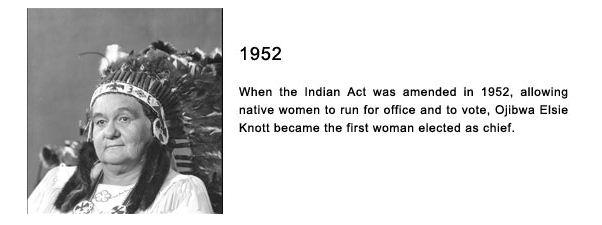
Chief Elsie Knott
In 1954, the late Elsie Knott, September 20, 1922 - December 3, 1995, was elected chief of the of Mud Lake Indian Band (now Curve Lake First Nation). At the age of 33, she became the first elected female chief of a First Nation in Canada
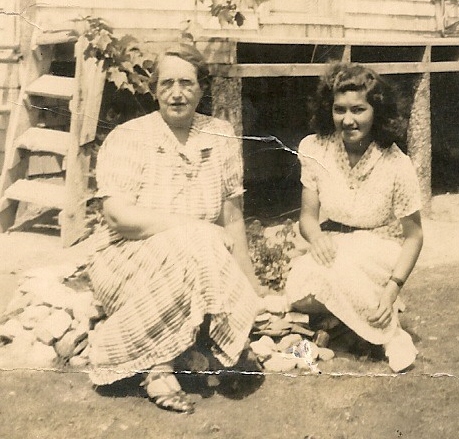
Jane Duncan (Cope) and Elsie Basque (Charles)
Photo mid 1940s
The late Elsie Basque, May 12, 1916 - Apr 11, 2016 (aged 99): In 1937, she became the first Nova Scotia Mi'kmaq woman to earn a Teacher's Certificate from the teacher training Normal College in Truro, NS. (A normal school is an institution created to train high school graduates to be teachers by educating them in the norms of pedagogy and curriculum.)
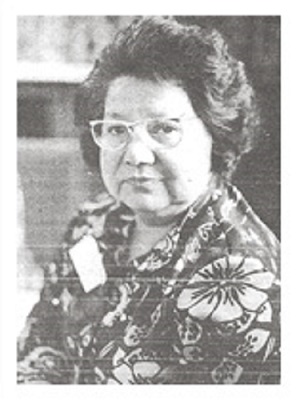
Helen Martin
The late Helen Martin, passed away December 31st, 1993: She was elected the first president of the Native Women's Association in 1972, a position she held for many years. Throughout her lifetime she was actively involved with securing the rights and fair treatment of Native Women.
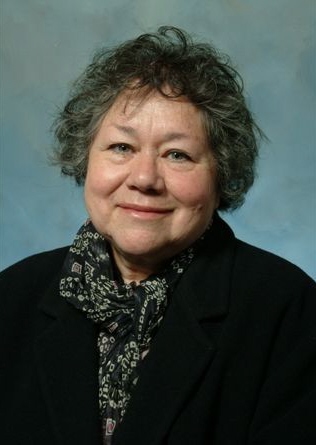
Joan Glode
Joan Glode: Founder and first Executive Director of Mi'kmaw Family & Children's Services in Nova Scotia. She was driven by her desire to see that neglected and abandoned Indigenous children were relocated to Indigenous homes and not shuffled off to non Indigenous homes.
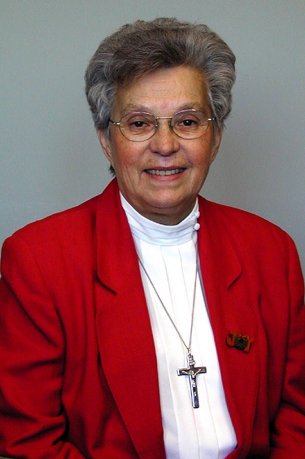
Sister Dorothy Moore
Sister Dorothy Moore: An educational leader and a respected Elder who has devoted many years to the preservation and restoration of the Mi'kmaw language and culture. Largely because of her efforts, the Nova Scotia Department of Education has developed a provincial Mi'kmaw language curriculum and other changes.
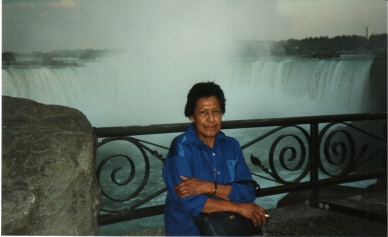
Chief Rita Smith
The late Annapolis Valley and Glooscap Band Chief Rita Smith, June 10, 1918 - October 27, 1996: A lady who didn't take no from the Department of Indian Affairs as a proper answer, and made sure, through determined effort, that the Department came up with the right one.
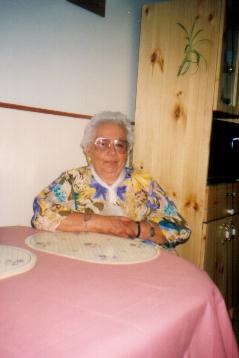
Chief Rachel Marshall
The late Millbrook Chief Rachel Marshal, 1909- 1997: She was the second woman to be elected a Band Chief in Nova Scotia and had the same approach with Departmental officialdom as Rita had.
I still get a chuckle out of this. As the only women Chiefs in the Province at the time Rita and Rachel worked closely together. In the 1970s a meeting was to be held in Ottawa with the Mi'kmaw Chiefs and the two ladies were not informed of it by their male colleagues. However, they found out about it and were in Ottawa to meet and greet the male Mi'kmaq Chiefs when they arrived!
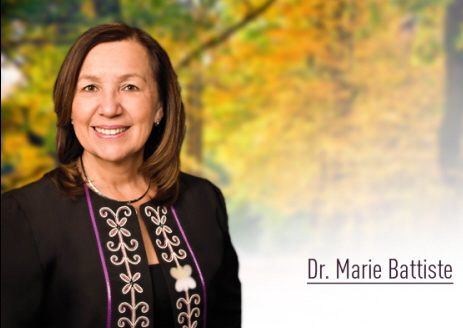
Professor Marie Battiste
Marie Battiste: Professor, College of Education, University of Saskatchewan. In 1984 she graduated with a doctor of education in curriculum and teacher education from Stanford University. The first Mi'kmaw woman to earn a PHD.

Clara Gloade
The late Clara Gloade, July 14, 1935 - April 16, 2015: She was a member of the Nova Scotia Native Women's Association and served as its President for over 20 years and served on the Board of Directors of the Native Women's Association of Canada. She was also Band Manager for the Millbrook Band for 23 years.
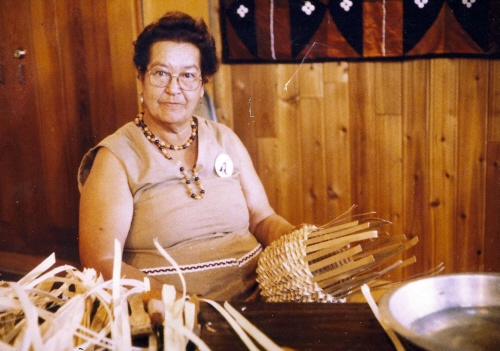
Dr. Granny - Margaret Johnson
The late Margaret Johnson ( Dr. Granny), August 11, 1915 – October 16, 2010: An expert in basket making, bead work and sewing, she taught these crafts in Eskasoni, N.S., Lennox Island and Morell, P.E.I., Gesgapegiag, Quebec, Conne River, Nfld. and surrounding Mi'kmaq communities. Also made the best pan fried fore-center I ever tasted!
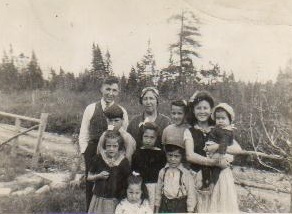
Sarah Paul and nine of her 14 children,
From the Back to the Front
John, Sarah, Rhoda, Violet, Rosaleta,
Lawrence, Evelyn, Jane, Danny, Rebecca
The late Chief Leona Pictou: The first woman Chief of Bear River and she made the best bread I ever tasted. I'm an early riser and so was she. I would arrive at her place at around five in the morning and be treated to a feast of bacon and eggs and fresh home made bread!

Sarah Paul and nine of her 14 children,
From the Back to the Front
John, Sarah, Rhoda, Violet, Rosaleta,
Lawrence, Evelyn, Jane, Danny, Rebecca
Chief Andrea Paul: The Pictou Landing Band Chief who has persuaded the Nova Scotia Provincial Government to start the process of cleaning up the toxic mess in Boat Harbour by January 31, 2020, which was, and still is, caused by the industrial waste flowing into it from the Abercrombie, Pictou County, pulp mill. As the late Pictou Landing Chief Raymond Francis was determined to see this happen, since the industrial polluting got underway in the mid 1960s, I believe that he is giving a big thumbs up from the Land of Souls!
The following expresses my strong belief that intolerance of any sort is not acceptable behaviour by anyone.
I encourage all to be tolerant and forgiving towards our human brothers and sisters. When you view your co-workers and others do not let race, colour, religion, sexual orientation, etc., demean him/her in your eyes, but see him/her as an equal, and always treat all fellow humans with dignity and respect. Your reward will be a happy and prosperous lifetime.
With the exception of Elsie Knott and Helen Martin, two ladies I never met, I know and knew all the others listed and counted and count them as among my friends, whose efforts I have the greatest respect for and have great pride in seeing the results of their dedicated work!
Interesting People and Events 29 - December 2019
Mi'kmaw Elder and Historian, Daniel N. Paul, C.M., O.N.S.
The following is a December 24, 1998 - Halifax Herald column I wrote about some of my memories of Christmases past. As a present to, at the end of it, I've included a reciept for my late Mom's Christmas pudding, enjoy!
Christmases past: a trip down memory lane

Christmas
The arrival of the Christmas season puts most folks in a mood to celebrate with good cheer. They, as the holiday nears, empty store shelves with purchases of gifts for family and friends, and prepare loads of great food. All the abundance and glitter which surrounds the celebration brings home how fortunate most Canadians are.
But the majority's affluence tends to obscure the fact that there are many poor Canadians who cannot spend lavishly preparing for the holidays. Sadly, some of these good people turn bitter because they believe that money is a must for a happy Christmas. However, those who haven't got loads of cash should not pine for what they haven't got; lavish spending is not a requisite for having a memorable Christmas, nor for happiness. With this in mind, I invite you to travel down memory lane with me.
Shortly after my birth in a small log cabin, our family moved into an uninsulated home that was barren of modern conveniences. Indoor toilets, water, central heating, electricity, etc., were things to dream about; in far to many instances, so were adequate food and clothing. However, despite living conditions which bespoke Third World poverty, it was mostly a happy life.
And, despite our material poverty, we were wealthy in many ways. One important blessing was that we did not live a life filled with rancour because of our lot in life. Neither of our parents complained or rightly laid the blame for our lack of material goods upon the doorstep of Canada's racist society. Even if they had and had spoken out against it, in those days of open racism, their only reward would have been humiliation. Thus, their attitude was to make the best of what they had and thank the Great Spirit for it.
It was in this spirit that our Christmases were celebrated. When material things were sparser than normal, it didn't take away from the enjoyment of the holiday - we appreciated what we had. I remember times when a stuffed porcupine, rabbit or deer meat was the holiday fare; roast ham, beef or pork were rare treats, and turkey was for the rich. Our toys and gifts of clothing were sometimes new, but used or homemade items were more the norm. However, even in the sparest years, Mom managed to make her fabulous Christmas pudding, which was a much anticipated treat.
One year, things were so bad that we were told that Santa had got lost and would not come until January 6, old Christmas. By then, our parents had managed to come up with a few things and the holiday was duly celebrated. That may have been the year when Santa brought me a home made wooden gun, which was made by my father.
With the arrival of family allowances in the late 1940s, a wider variety of goods was found under our tree and, as we were then raising a few chickens and ducks, one or the other graced our holiday table. Also, around 1948, in recognition of my advancing years (10), the responsibility for getting a tree and dispatching the selected bird had passed to me. Bringing home the tree was no problem, but dispatching the bird was not a favourite pastimes.
Shortly after turning fourteen in1953, I went to live in the United States, spending seven years there. American lavish holiday expenditures amazed me. Food, goodies, gifts and toys galore! Wow! Not in my wildest dreams had I ever envisioned such abundance!
I experienced first-hand the fruits of such abundance by spending my first American Christmas with my cousin Jean's family. Relatives, friends and neighbours came around on Christmas Eve and joined in carol singing - a family of Jewish friends were by far the best singers. The Polish ham they had for dinner - Jean's husband Charlie was of Polish heritage - was indescribably delicious! Another thing I remember was that my cousins had bought their two boys drums and horns; the noise level that day was of sonic-boom proportions.
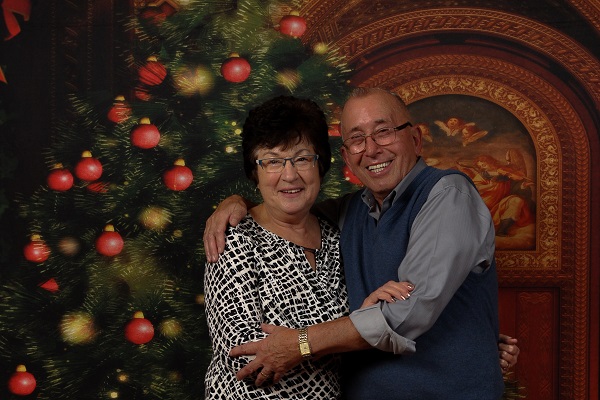
Pat and Danny
In due course, I returned home, eventually got married, and began to celebrate the holidays with a family of my own. Many memorable Christmases have since passed. I'll give a short review of one:
Pat and I had put our two girls to bed and were passing the evening by listening to Christmas music and having a bit of Christmas cheer. Around midnight, we decided it was time to put the toys under the tree and retire. For Lenore, our oldest, we had purchased a doll carriage. Presuming the manufacturer had assembled most of it, I had left it unopened. After hauling the box into the rec-room and opening it, I received a shock. There lying before me was at least a million pieces. Finally, at ten to five in the morning, it was assembled. I then dragged my weary bones off to bed.
After turning off the light and getting comfortable, we heard two excited voices : "Daddy, Mommy, can we get up and see what Santa brought?” Ah, the burden of fatherhood - half-dead, up and at it!
The moral of my story is: If on Christmas morning, you rise with the knowledge that you are loved and can return that love; and if you will not harp on life's negatives, but count your blessings and thank the Great Spirit for them - you are wealthy. My Christmases, sparse or plenty, are remembered with the same affection. Money is secondary; happiness with family and friends can be had without it.
Good Cheer!

Sarah Paul and nine of her 14 children,
From the Back to the Front
John, Sarah, Rhoda, Violet, Rosaleta,
Lawrence, Evelyn, Jane, Danny, Rebecca
Mom's Christmas Pudding
Dry Ingredients
3 Cups of Flour
½ Cup of Brown Sugar
3/4 Teaspoon of Salt
1 Teaspoon of Cinnamon
1 Teaspoon of Nutmeg
1 Teaspoon of Ginger
Spices can be increased or decreased to suit taste
Wet Ingredients
1 Cup of Molasses
1 Cup of Olive Oil or Shortening or Butter if preferred
1 Large Egg
1 Cup of Grape Juice
1 Teaspoon of Baking Soda in cup of Boiling Water to Dissolve
Fruits
1 Cup of Dates
1 Cup of Raisins
1 Cup of Currents
1 Cup of Mixed Fruit
1 Cup of Walnuts (Other Nuts Such as Pecans can be Substituted)
Fruits can increased or decreased to suit taste.
Mix dry ingredients in large bowl, then add fruit. Mix wet ingredients in separate bowl, then add to dry ingredients.
Bring water to boil, then steam pudding with burner set on three for one hour, then lower burner to two for two more hours. Leave steam vent on steamer open. If Lighter Pudding is Desired a Teaspoon of Baking Powder can be Added.
Interesting People and Events 30, January 2020
Mi'kmaw Elder and Historian, Daniel N. Paul, C.M., O.N.S.
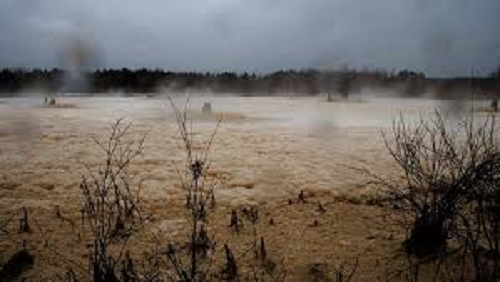
BoatHarbourPollution
Industrial Waste polluted Boat Harbour, Environmental Racism at its Worst
On January 31, 2019, the plug is scheduled to be pulled on the use of Boat Harbour as an industrial waste lagoon. Will it happen? The only man who can see that it does happen is Premier Stephen McNeil, a man, whom my experience in dealing with, has proven to be a man of his word, and his word on this matter is that it will happen on the date specified.
There were three Pictou Landing Band Chiefs who, in my estimation, carried the battle to see the Boat Harbour matter brought to the point where it is today, after 52 years of Band members being exposed to the toxic mess, a Boat Harbour Remediation Project.
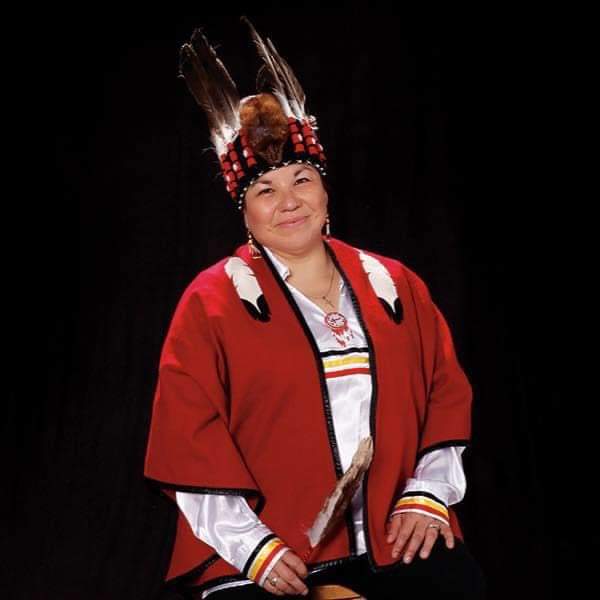
Chief Andrea Paul
Chief Andrea Paul, who has done an exceptionally professional job in lobbying for the Project now in the works. She will be remembered as the lady who managed to get the last mile done!
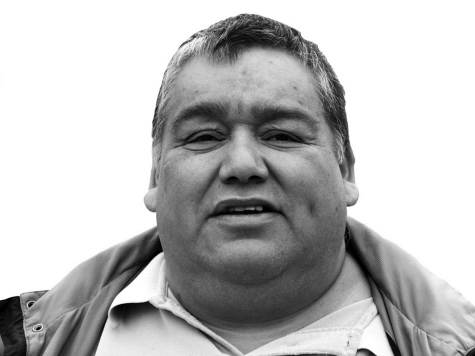
Chief Roddie Francis
Former Chief Roddie Francis, who had the proverbial bricks and stones thrown at him as he led the Band through most of the years putting the case together, and holding things together when they often appeared to be on the verge of flying apart. Hats off to Him!
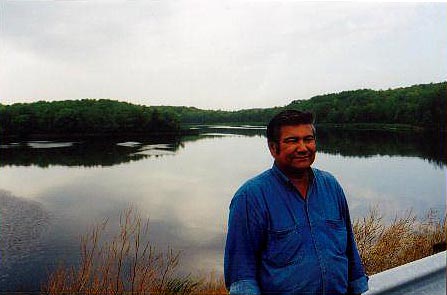
Chief Raymond Francis
But the Chief that wouldn't shut up about it, Chief Raymond Francis, and was pissed off to no end about what his family and friends were suffering related to the poisoning of the Harbour, in order to try to satisfy Caucasian greed is the person who deserves most of the credit. Greed, the following is a quote from a statement I remember that was made by one of the individual slated to benefit from the establishment of the Mill made “Stink, what stink, it's the smell of money.)
I wrote the following Newspaper column after my friend passed away in 2008, it gives a short overview of the Harbour mess and the deceit that made it so.
Chief Raymond Francis, 1931 - 2008
October 2, 1998 Halifax Herald
On the Boat Harbour trail of lies and deceit
Chief Raymond Francis was born August 28, 1931, (passed away January 21, 2008) on Pictou Landing Indian Reserve, to the late Roddie and Helen (Prosper) Francis, the third youngest of three boys and a girl. He attended the reserve's Indian day school and then went to the University of Life. He married his late beloved wife, Margaret Rose Nicholas, on May 6, 1958, they had four children. The reserve where Ray was born, raised, and raised his own family, is located on the shores of the Northumberland Strait.
Ray's Father and Grandfather harvested fish from the strait and Boat Harbour, and taught the boys the tricks of the trade. In 1950, using their fish harvesting knowledge, Ray and brother, Dennis, set up a commercial fishing operation with Boat Harbour as home base. Their main catches were lobsters and eels.
They earned a decent wage from the operation until the province, in the mid 1960s, started using the harbour as an industrial waste lagoon. The shocking way the province got permission from the Band to use the harbour as a lagoon for the Scott Paper Company pulp mill at Abercrombie Point is the basis of a sad story.
The lies and underhanded methods used by governments to convince the Pictou Landing Mi'kmaq to give up their riparian rights in Boat Harbour and unknowingly consent to its use as an industrial waste lagoon are far to complex to entirely relate here.
It suffices to say that the people were told that afterwards they would still be able to use the harbour for recreation, fishing, swimming, etc. When the industrial waste began flowing from the mill, the truth soon became evident to the Mi'kmaq: their beautiful harbour had been turned into a stinking cesspool.
Ray began his fight to have the situation corrected almost immediately. He ran for Chief of the Band in 1967 and was sworn into office on November 30 that year. From this point to 1981, he explored, with marginal success, many avenues to try to right the wrong perpetuated against the Band. He consulted lawyers, the Union of Nova Scotia Indians, the Indian Affairs department, the provincial government, etc.
In early 1981 he called my office for an appointment to discuss the matter. I was then employed by Indian Affairs as District Supt., Lands Revenues and Trusts for Nova Scotia. As he didn't plan to re-offer for Chief in 1983, this was a last-ditch effort by Ray to get the fight off the ground before he stepped down.
On the appointed day, Ray recited a quick overview of the Boat Harbour mess. I then gave him a preliminary opinion, confirmed after I had reviewed the Boat Harbour files, to the effect that the reason he had had little success to date in his fight for justice, was that he was going after the wrong party, the province.
I explained to him that the province, although heavily involved in the deceit, could not have used Boat Harbour without the approval of the federal department which carries the Crown's Constitutional responsibility to protect the rights of Indians and the integrity of their lands - Indian Affairs - which, in the case of Boat Harbour, it had failed to do in every manner.
Ray then asked if I would get involved in trying to resolve the problem. This is where I ran into a serious conflict of interest: Indian Affairs was interested in protecting the Crown's monetary interests and I was interested in finding justice for the Band.
My Mi'kmaq heritage, coupled with a strong desire to right a grievous wrong, demanded that I help the Band. Thus, without any feelings of regret, but taking a considerable risk with my family's economic well-being, I agreed to assist the Band in its fight with the department.
However, after the fight was over, I've jokingly told Ray that if I had known the trying times in store because of the problem he brought me that day, I would have got up and closed the door when I saw him coming.
It seems, upon reflection, the department was hell bent and determined to find a way to keep the Band distracted from the department itself. It proposed a partnership arrangement which would see it and the band explore ways for the Band to get redress from the province.
I informed the Band that this was a dead-end street but, in spite of my opinion, the Band joined the department' effort. But, after several months, when the Band discovered that the Department was being less than candid with them, it dumped the arrangement.
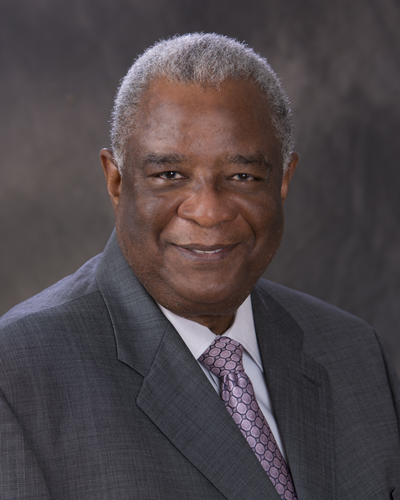
E. Anthony Ross
While this was going on, I had introduced the Band Council to legal council Tony Ross, who reviewed the files and concurred in my opinion that the Department of Indian Affairs was the culprit. This was followed by a ten year odyssey which saw the Band build a case so strong the department eventually threw in the towel and opted for a negotiated settlement.
The Band received 35 million, some land, and a promise from both levels of government that they would, early in the next century, clean up Boat Harbour. (This is where I dropped out of the case, I knew damn well that we needed the clean-up with dates to start and finish and that their verbal promise was just one more lie, which proved to be right on the button.)
The people of Pictou Landing Band owe a great deal to Chief Ray Francis. Without his persistence, the whole Boat Harbour issue would almost surely still be in limbo. Hats off to a persistent and dedicated hero!
Ironically, despite all his work, Ray and his brother Dennis, have had only limited success in trying to recover compensation for the loss of their business from the Boat Harbour Settlement Fund.
Another irony. For several years, nefarious rumours have been spread that I was paid a great deal of money for the work I did on the claim. The most ridiculous rumour claims I got $2 million.
For the countless hours of vacation time, nights and weekends that I gave up to help settle the case, I state categorically, with the exception of a token expense payment of $2,000, I have received not one nickel, let alone millions. (If anyone would like to challenge this please hire a Chartered Accountant, who can have free access to all my past financial records.)
Daniel N. Paul
Interesting People and Events 31 - February 2020
Mi'kmaw Elder and Historian, Daniel N. Paul, C.M., O.N.S.
The Knockwood siblings
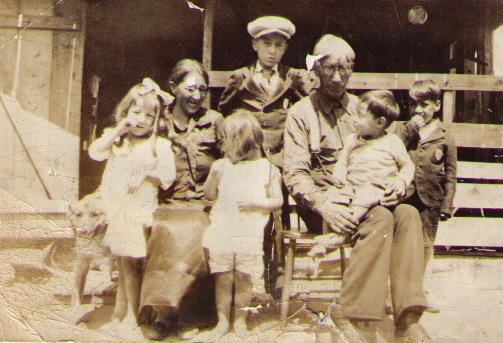
John and Tressie Knockwood and Children
Left to Right: Rose, Isabelle, Noel, Joe, and Henry>
Ninety years ago, 1929, Tressie and John Knockwood welcomed their first child into the World, Rose, her father nicknamed her Sunset Rose, she was the first of five siblings, two girls and three boys.
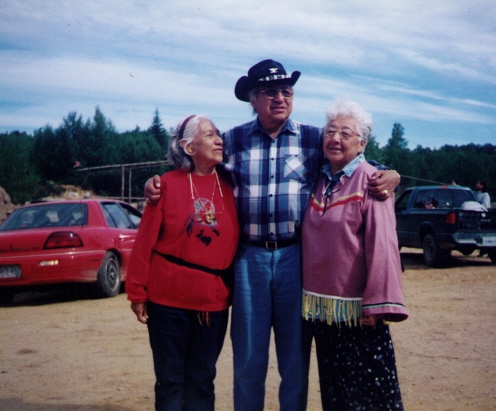
Isabelle, Noel And Rose
Three of the Siblings
Rose, Isabelle, and their late brothers Henry, Joseph and Noel attended the Shubenacadie Indian Residential School in their youth and did not, from their experience, have any fond memories to relate to anyone of their incarceration, just the opposite.
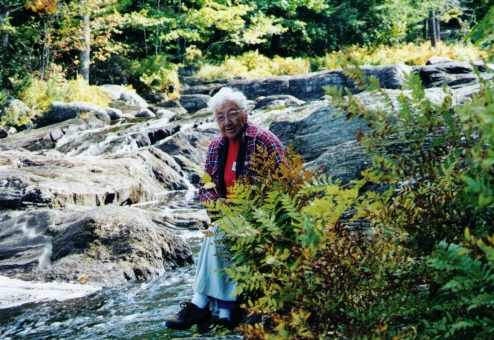
Rose Morris>
Rose Married Ben Morris and they had seven children. This didn't stop her, she decided in the late 1950s to upgrade her education and earned a BA from Dalhousie University in 1960. She is the author of two children's books, however, she is best known for her basket making skills.
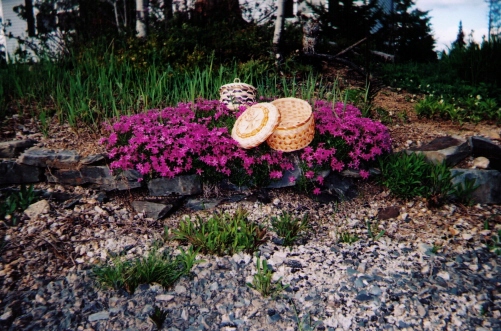
Rose Morris - Basket Work>
Today she is a young 90 and still goes for daily walks and socializes with her many friends.
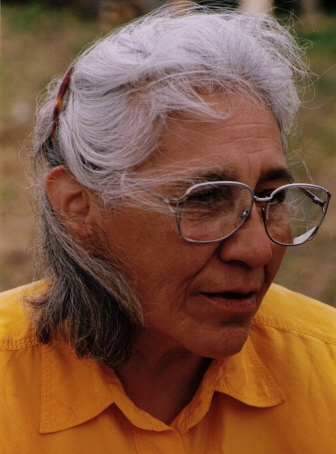
Isabelle Knockwood>
Isabelle, now 88, was first married to the late Joe Tony and they had several children, she is today the Grandmother and Great Grandmother of many.
She also in adulthood decided to improve her education and earned a BA from Saint Mary's University in 1992. She is a published author and a teacher of traditional skills and lore.
Her book Out of the Depths, relates the Experiences of Mi'kmaw Children at the Indian Residential School at Shubenacadie, Nova Scotia. It is a must read for those who wish to understand the mentality of a society determined to take the Indian out of the Indian.
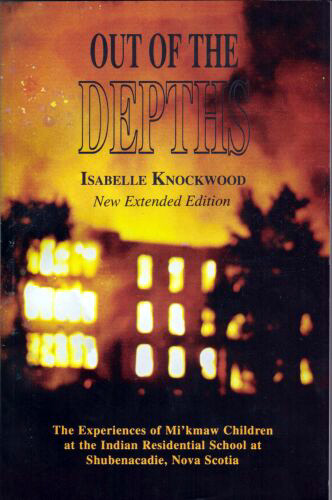
Out of theDepths>
Up until recently Isabelle was very active, however, due to several falls she is today mainly restricted to her home at Indian Brook.
Joe and Henry, lived their lives out of the limelight.
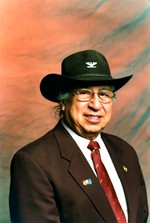
Noel Knockwood>
However, their brother Noel was a different story. On April 27, 2001, I had the following column published in the - Halifax Herald
Knockwood, role model for all
Noel Raymond Knockwood, born in a very modest home on July 13, 1932 at Shubenacadie Indian Reserve to John and Theresa (Simon) Knockwood, was the last of five children, two girls and three boys. He also had two half-brothers and a half-sister from John's first marriage, which ended when his wife died. Knockwood today lives in Cole Harbour with Iretia Cox, his companion of ten years. Through previous relationships, he is the father of nine children and the Grandfather of eleven.
Noel was born at a time when things were extremely tuff for the provinces's Mi'kmaq. Their exclusion caused by racism before the Great Depression had made getting a job then very hard; but after it started; getting one was virtually impossible. Thus, hunger and deprivation were not strangers. Because of this, and the fact that there wasn't a school on the reserve, many Mi'kmaq families placed their children in the Shubenacadie Indian Residential School. The experience was so traumatizing for many that it led Noel's sister Isabel to write a book entitled Out of the Depths (Roseway Publishing 1992) which describes the nightmare in detail.
Noel's residential school incarceration ended when he was transferred to a small on-reserve school that had opened in 1939. He, under the able tutelage of Elsie Basque, Nova Scotia's first licensed Mi'kmaq teacher, achieved grade eight. (In 1993, many of the surviving students of that era joined with Elsie at Indian Brook for a sentimental reunion and celebration. Taking great pride in the accomplishments of her former students, she describes it as "the most heart-warming experience of my life.")
In the early 1950s, Noel volunteered for military service. His stint included a year and a half of combat duty in Korea. For services rendered, he was awarded the United Nations Service Medal, Korean War Medal, and the Canadian Voluntary Service Medal - Korea.
After Korea Noel enjoyed some free time. Then in 1958, by enrolling at Success Business College in Truro, he began an education upgrade process that lasted off and on for over two decades. At various times, until he received his BA. from Saint Mary's University in May 1984, he attended institutions such as the Coady International Institute at St. F.X., from which he received a diploma in Community development.
In the midst of all this, by the 1970s Noel had acquired a serious personal problem that was threatening his future - a well-entrenched addiction to alcohol. Its cause can be largely attributed to the loss of self-esteem that victims of overt and systemic racism suffer. In the case of the Mi'kmaq, as was the case with a great many of Canada's First Nation Peoples, such feelings of inferiority were helped along tremendously by the fact that we were taught in youth that we were the descendants of heathen savages. Because of these unfounded stereotypes of savage ancestry, suffering degrading forms of racism was common for most from birth. It's an experience that haunts victims for life.
Noel was inspired to get the monkey off his back by what he learned about his roots while employed in 1972 by MACS (Micmac Association of Cultural Studies). The historical information the organization had on hand about the proud traditions of the Mi'kmaq Nation and its ancient spirituality awed him and instilled in him a sense of pride. The teachings of the Great Spirit were especially helpful in mastering his addiction. This year, he celebrates his 29th year of sobriety, a proud accomplishment.
In 1975, Noel was appointed to the Mi'kmaq Grand Council as a spiritual leader of the Mi'kmaq People. In this capacity, among other duties, he often leads multi-racial groups in prayers to the Great Spirit. One of his current projects is lobbying the provincial government to recognize traditional Mi'kmaq marriage ceremonies performed by spiritual leaders such as he under the Solemnization of Marriage Act.
Over the decades, Knockwood has been heavily involved in teaching activities - sharing his knowledge with students at Dalhousie and other universities, the Friendship Centre, federal and provincial Government Departments, etc. Today, he is Language and Culture Instructor at the Mi'kmaq Children's Centre in Halifax and is actively involved in running a small consultant business.
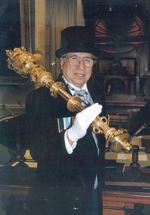
Noel: Sergeant-At-Arms
On March 27, 2000, Noel was appointed Sergeant-At-Arms to the Nova Scotia Legislature. He says of this appointment, "it takes care of the ceremonial, now for some substance." Knockwood wants to see the Nova Scotia government use affirmative action to end Mi'kmaq exclusion and place qualified individuals in top governmental management positions. This he would like to see done sooner, rather than later.
It's always inspiring to see an individual from a deprived Nation find the courage to overcome great impediments and succeed. By refusing to permit two of societies greatest curses, alcoholism and racism, to defeat him in his bid for excellence, Knockwood has proven he is such an individual. Hats off to a man whose courage and dedication have made him a role model for all people in this province.
Noel, my friend, may the Great Spirit continue to motivate and keep you safe for years to come!
Several years after I wrote the column Noel began to experience memory loss and was eventually diagnosed with Alzheimer's disease. Which he accepted without complaint. When I asked him how he reacted to the diagnoses he responded “Well Danny, I have it and there is nothing I can, or can anyone else do about it, there is no cure, so I've decided that I'll continue to enjoy my life as much as I can.” Which he did.
After he could no longer drive I often picked him up and took him to Tim Horton's or to Gold River to visit Rose. The following is a short story about how well he lived with his disease and accepted it, which is an inspiration to me and a mode that I have decided to imitate and, as he did, accept what Mother Nature passes out to me in my declining years.

Rose Morris
One morning I picked him up and we went to visit Rose in gold River. We had a great visit and a very good restaurant meal before heading home. Noel had a very good recall of long term memories but his short term was practically nil. The next morning at eight am the phone rang and it was Noel suggesting that we go to Gold River to visit Rose. When I told him that we had done so the day before his response was classic. “Did we have a good visit?” Yes. “Good we should do it again soon!”
As a matter of fact, if you didn't know he had Alzheimer's, his demeanor was so normal that you couldn't tell he had it. This was apparent the day I took him to Truro to attend the funeral of our friend Rocky Jones and for us to say a few words at it, Rocky had passed away July 29, 2013.
After the funeral services we went to the Truro Legion to attend a reception. Both of us had many friends from the African Nova Scotia community attending and were soon glad handing and chatting with many of them. Noel was having a great time and then a mutual friend came up to me and told me that he had just got Noel to agree to give a talk at a function he was planning. When I told him that it wasn't possible because of Noel's disease he was dumbstruck, that is how well Noel handle the disease, it wasn't apparent!
Noel passed away from a massive stroke on April 10, 2014, I miss him greatly!
The siblings had two half brothers and one half sister from their father's first marriage, Stephen, Benjamin, and Lucy. Stephen was the Chief of the Shubenacadie Band for several terms.
Mi'kmaw Saqmawiey (Eldering) Daniel N. Paul, C.M., O.N.S.
The Original Gang of Seven – April 2020
Tribute to Six Late Chiefs who created a fine respected organization
The Confederacy of Mainland Mi'kmaq.
The Confederacy of Mainland Mi'kmaq - Founding Chiefs and Executive Director
Top Row, Left to Right - Chief John Knockwood - Chief Charles Labrador
Chief Roddy Francis - Bottom Row, Left to Right - Chief Lawrence Paul
Chief Rita Smith - Chief Peter Perro - Executive Director Daniel N. Paul
But first, as I have for the other five Chiefs when they passed away, I want to pay a personalTribute to a trusted friend, Roddie Francis, former Chief of the Pictou Landing Mi'kmaw Community and District Chief of the Mainland, who passed away the weekend of March 14, 2020, and is now in the company of relatives and friends in the Land of Souls. He leaves behind his beloved wife Shirley, children, relatives and lots of friends.
I first got to know Roddie well in 1981, after he was elected Chief of the Band, succeeding his Uncle Raymond Francis. We hit it off from the beginning and worked quite closely for several years on the Boat Harbour Law Suit against Canada. I don't intend at this point to spend any time on explaining the details of the Suit other than to say he was the man who held it together.
Actually I knew Roddie's wife Shirley, who was the Band's financial clerk, in 1972, while helping her do the Band's bookkeeping. She has been a respected and well liked friend ever since.
I will miss Roddie friendship, I trusted him without reservation and had great respect for his integrity and resolution to do the right things in life!
If he is able to know what I'm saying he is probably thinking with a grin on his face “you sure it's not the lobsters I got for you every year that you'll be missing!”
Hats off to a fine gentleman and a valued friend, may he have peace and tranquility for eternity in the Land of Souls!
The other members of the Gang of Seven in 1985 were Chief John Knockwood, Sipekne'katik, Chief Lawrence Paul, Millbrook, Chief Rita Smith, Horton now Glooscap, Chief Charlie Labrador, Acadia and Chief Peter Pero, Afton now Paq'tnkek, and myself Daniel N. Paul, the only surviving member. Five of the Chiefs became the first board of Directors of the Organization, Chief Charlie Labrador retired and Acadia Band decided not to join. However, at present, the Band is now member.
From the beginning, via my phone discussions with John and Lawrence, I was aware that the rationale behind their push to create a Tribal Council was founded on their desire to have access to an organization that would have the capacity to research and promote the settlement of their land claims and other legal issues, plus have the capacity to provide administrative and financial advice, etc. to their Bands.
One of the main reasons I considered their request, although I thought I was nuts for doing so, is that I knew all the before mentioned Chiefs and we all liked, respected and trusted one another. That evening, I discussed the proposal with my wife, explained the negatives, and asked for her opinion. Her response was positive, “If it's something that you want to do then you should do it.” Based on her support, I decided to give it a try.
Although they had absolutely nothing to offer - no funding, no security, no pension, they had something I did want, an opportunity to establish something that I had been advocating for the establishment of for a decade or so; a first class First Nation governmental entity that would be accountable, operate with transparency, and use responsible and sound administrative and financial practices, and a high priority, I wanted no interference from them in building the Organization's operation requirements. They agreed to all my stipulations and with that we arranged a meeting with the Regional Director of Indian Affairs on December 6, 1985.
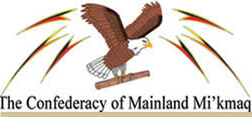
Confederacy of Mainland Mi'kmaq
Besides my wife's support, there were two other factors that played a big part in helping me come to a favourable decision. The first, of course, was the challenge that the opportunity to be the architect of the Confederacy of Mainland Mi'kmaq presented, the other was a project that I had been secretly working on for three years, which was in direct conflict with the best interests of my employer the Department of Indian Affairs, the Pictou Landing Band's Boat Harbour lawsuit. If it had become public knowledge that I was working on it with Tony Ross, the Band's legal counsel, God knows what the job consequences for me would have been. It was an uncertainty that had me nervously walking a tightrope since 1982. I don't know if DIAND would have fired me for it, it was a real possibility that they would have, leaving my family without income, not a pleasant prospect. By accepting the offer, I would be in a position to work on it openly.
At our meeting, Mr. Cooke was very supportive, committing seed money, and he agreed to second me to the new organization until the end of March 1986, at which time I would have to decide whether to remain a member of the Federal Public Service, or resign to become a full time employee with CMM. With this commitment of support from the highest Departmental official in the region, I acquired office space at the Micmac Friendship Center on Gottingen Street in Halifax and began the process of building the Organization.
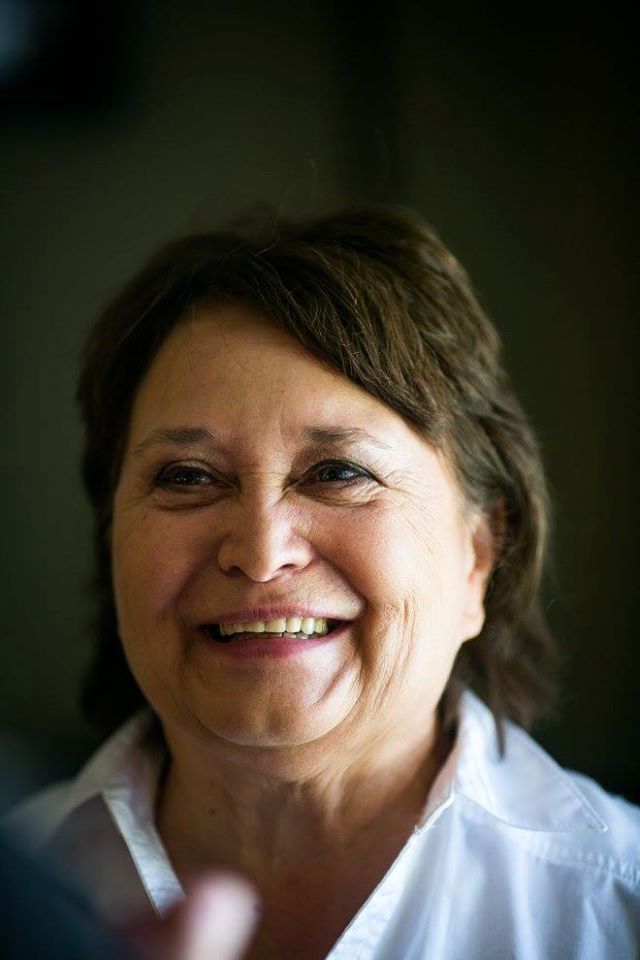
Barbara Dorey
With some of the seed work done we moved to Millbrook and I was very fortunate to acquire the services of Barb Dorey, who proved to be invaluable in assisting me with the task of setting up the Confederacy of Mainland Mi'kmaq. By the way, the name of the Organization was coined by Chief Peter Pero.
With secretarial/administrative assistant in place, I began in earnest writing a Constitution and by-laws for the organization. From the outset I intended to produce a document that would mandate that the Confederacy of Mainland Mi'kmaq utilize modern, responsible, and transparent administrative and financial practices in its day to day operations. I knew from experience that a professional operational foundation for the organization was a must if it was to be managed responsibly, and productively, for the benefit of the member bands. Having the documents available was also an urgent need for another reason - DIAND tribal council funding regulations required that a tribal council, with a constitution and by-laws, be registered as a non-profit organization under the Societies Act of the province where it was located. Not having any funds to acquire legal assistance to help with this chore, I had to do it myself. Which, in retrospect, I must have done a decent job - standing the test of time, CMM's Constitution is still essentially the same in 2020, as it was then.
With the task of writing the Constitution and by-laws completed, and approved by the Chiefs, I tackled the task of getting the Confederacy of Mainland Mi'kmaq registered as a non-profit organization. This deed was not as easy as it may sound because the consensus among the Chiefs and myself, related to the special status of Indians and lands reserved for Indians, was that it should be registered with the federal government. I couldn't persuade the feds to do so in a timely manner, thus, as Indian Affairs was threatening to withhold funds if we didn't meet the funding requirement to register our organization as a non-profit entity, I reluctantly registered it with the Nova Scotia Registry of Deeds and Documents. The organization was officially registered December 5, 1986, coincidently, the day I was born in 1938.
In addition, while the before-mentioned was being attended too, I was engaged in writing job descriptions for all the new (approximately 25 positions) administrative and operational positions that needed to be filled to operate the organization - research director, education director, engineering, support staff, etc., at the same time acquiring more office furniture and equipment to accommodate new employees as they came on stream. Interviewing applicants and hiring them was going on almost as fast I was writing job descriptions.
Also, in the midst of this dizzying activity, the most important and urgent task of all, one that was essential if we were to succeed, the acquisition of secure operational funding had to be attended too. Securing funds from some funding entities, such as land claim research funding was fairly easy, others, related to the bureaucratic obstruction I had anticipated in the beginning, was difficult. I will just say that many in D.I.A.N.D. were not supportive, probably related to the fact if the Organization was successful their jobs would be in jeopardy.
It would be remiss of me not to mention a few of the fine ladies and gentlemen that I managed to hire over the first few months, the late Kathy Knockwood, Education, Afton's Albert Julian, Housing, Donald Julian, Research, Tim Bernard, and many more fine dedicated and capable individuals!
True to their word the Chiefs gave me a free hand in establishing the Organization and supported me when I told them of things that needed to be done to assure its good management. Originally, when writing the Constitution, I forgot about Conflict of Interest, I brought it to their attention and they approved of an inclusion, then, at the next general meeting it was passed. It stated in a nut shell that no Chief or Councillor of the member bands could be an employee of the Organization. This was so because the first loyalty of a Chief or Councillor must be to his/her own Band's membership and it would be impossible for one of them, as an employee of the Organization, to have equal loyalty at the same time to the interests of the members of other Bands.
Another positive was their support when I wanted to start this newspaper, when I brought it up they told me to go for it. And 34 years later it's still on the go!
None of the before mentioned could have been accomplished without the full support of the Chiefs, who, dispalying true leadership, accepted the fact that they did not have the expertise to do what had to be done to set up the Organization and left it up to me to do it without interference.
Rita and the five men initially involved were people who I trusted and admired without reservation, they were people who had integrity and foresight. In the Land of Souls, where they rest in eternal tranquility, they probably get together and talk about old times. It would be great to hear and chat with them again, which I probably will in the hopefully distant future!
Mi'kmaw Saqmawiey (Eldering) Daniel N. Paul, C.M., O.N.S.
Interesting People and Events 32- May 2020
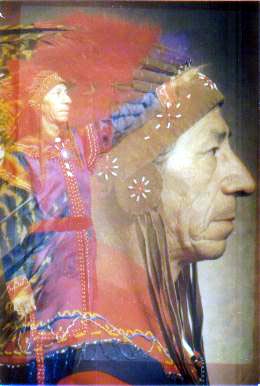
Chief Peter Pero
Over the past few years I've written many stories about some of my old friends and I thought I had written about my late friend Chief Peter Pero 1916 - 1989, and just discovered I haven't. I will now correct that omission and pay tribute to a friend that I admired and trusted.
I first met Peter back in the early 1950s when I was quite young. The way our acquaintance began was that I used to be his chauffeur from time to time during the summer months when I came home from the States for a vacation. Like many of our people Peter had a drinking problem which, to his credit, he eventually overcame, thus the chauffeur need at the time.
Peter originally came from Afton, which had many names over the years, it was also known as Bayfield and now is Paq'tnkek, but moved to Shubenacadie Indian Reserve in the early 1950s, now known as Indian Brook. He later returned to Paq'tnkek and was successful when he offered for Chief of the Band.
We ran into one another from time to time over the years after the 1950s, but got to renew our contact on a more regular basis after I was employed by the Department of Indian Affairs's Nova Scotia District Office in 1971. I would go to the Band Office quite often to help the Band Manager John Prosper with its bookkeeping. Peter would often take me to his home to have a delicious lunch with him and his wife Sofie.
It was during those lunches that Peter acquainted me with a pet project that he had been pursuing for years, Indian Reserve status for the land where the Band's church and cemetery were located, known as the Summerside Property. It was what would later get me deeply involved in the issue.

We Were Not the Savages - 2006 Edition
A quote from We Were Not the Savages:
“The Afton Band request: The story of the acquisition of the Summerside property for the Band is incredible: From time immemorial the Mi'kmaq have used the lands along the shore of the Northumberland Strait in Antigonish County for camping and fishing. In 1715, French missionaries established a mission for the Mi'kmaq at Summerside and in 1717 they built a church at the site. However, the land was soon to be alienated.
After the American War of Independence, during the late eighteenth and early nineteenth centuries, the colonial government issued land grants to United Empire Loyalists who had left the newly independent United States of America. Two of these land grants, in and around the Heatherton area of Antigonish County, affected the use of the lands at Summerside by the Mi'kmaq. A grant of one thousand acres had been made on February 15, 1818, to a Colonel Colin Campbell of the 72nd British Regiment, and a grant of five hundred acres had been made to the Honourable Henry H. Cogswell of Halifax. These two grants were located along the shore of the Summerside area and included lands traditionally occupied by members of the Afton Band.
During these years, the inclination of the White population was to shaft the Mi'kmaq; therefore, what happened next was a rarity. Three Justices of the Peace by the names of Cunningham, MacDonald and Henry wrote to Sir James Kempt, the Lieutenant-Governor of the colony, on behalf of the Mi'kmaq, recommending, because of the presence of the mission church, burial grounds and camping and fishing sites on land granted to Henry H. Cogswell, that 100-150 acres be set aside for the Mi'kmaq. They must have made a persuasive case, for during 1824 Cogswell set aside one hundred acres of his prime waterfront land for the Band.
From day one, Afton Band members faced opposition to their occupation of these lands. In 1838, although the chapel and burial grounds were located there, a certain John Sutton prevented the People from occupying their property. Somehow, probably with the intervention of the three Justices of the Peace, the issue was resolved favourably on behalf of the Band. On August 4, 1842, Cogswell sold four hundred acres of his lot to Sutton, excluding the one hundred acres he had originally set aside for the Band.
During the transition to Confederation, in an act of incompetence, Samuel Fairbanks, Indian Commissioner for the Colony of Nova Scotia, failed to transfer the hundred acres with the church and burial grounds to the federal government for administration. This omission caused the land to be illegally alienated in the early twentieth century, and today it still remains an outstanding land claim for the Afton Band.
Complicating the issue further, in 1916 the mission church was completely destroyed by fire. The following year, a John A. Chisholm informed the Afton Mi'kmaq that he would buy their property to permit them to rebuild their church on the adjacent vacant land. Largely uninformed as to how property laws were applied, the Afton Band members accepted his offer. They immediately began to occupy the land without objections from anyone. During 1919 the Band rebuilt Saint Anne's Mission Church on the property, again with no outside interference.
I can't help wonder what planet Indian Affairs was on during all this! On October 1, 1919, Chisholm purchased from the Band seventy acres of their lands from the Cogswell grant for $300, and on the 20th of the same month he purchased another five acres from the Band for $25. He had eighteen Band members, male and female, sign transfer deeds. This was illegal, because at the time only male members were permitted to vote and transfer land title and the transaction did not meet other requirements of the Indian Act.
In 1961, after forty-two years, the Afton Band Council, still using the property for religious purposes, a burial ground and camping and fishing, was advised by the Department that the Summerside property was not theirs but part of the estate of the very late Colin Campbell. The Band members were not pleased.
In 1967, eighty acres of the estate were put up for tax sale by the municipality. Excluded were the twenty acres on which the church and burial grounds were located; these had become church property by "uninterrupted possession" and as such not subject to taxation. (An observation: Although the Mi'kmaq had occupied the land from time immemorial, they weren't allowed to claim "uninterrupted possession.") The Band paid the taxes, preventing the sale from being concluded.”
In 1977, the Band tried to acquire the property by the Quieting Titles Act. The strange part of this application was that Mordechai Jones, the Supreme Court Justice hearing the case, based on the legal precedent that a Band Council cannot hold land in trust on behalf of its members, had prior to the trial advised the plaintiffs that he would not be able to find on behalf of the Band. In view of this advice, it would have been appropriate to withdraw the action and consider a new approach, but this was not done and the action proceeded to its preordained conclusion.
In dismissing the action on February 22, 1978, Justice Jones stated:
“It is unfortunate that the Band cannot have recourse to the Quieting Titles Act simply because the Band is not incorporated or empowered to hold land. The appropriate remedy appears to be a statute of the legislature vesting title in some person or body for the benefit of the Band. I suggested this course to counsel when this action was set down for trial and can only commend it again to all parties concerned, including the appropriate Crown authorities both federal and provincial.”
After the action was dismissed, the provincial Minister of Lands and Forests advised the Band and the Department of Indian Affairs that the best approach would be for the Band to acquire the property through a tax sale. In 1979, Indian Affairs appointed an Agent to acquire the Summerside property through this method. This didn't work out because it had been tried before and each time a farmer in the area intervened and either paid the taxes or, by his presence and threats, forced the Band to pay them.
In early 1984, I was at the time District Superintendent of Lands, Reserves and Trusts for DIAND's Nova District Office, frustrated with the non-productivity of this process, I decided to find a solution. My lands officer Donald Julien and I met with the Band's newly elected Council to brief them on the issue. After determining that the resolve of the new Council to acquire the Summerside property as a Reserve was as strong as their predecessors', I told them that somehow I would find a way to get it done. I asked Don to put together a historical sequence of events for the property in preparation for a meeting I planned to arrange with the province. With this information in hand a meeting was set up with the Honourable Edmund Morris, who, in addition to being Nova Scotia's Minister of Social Services, was the chairman of the province's Aboriginal Affairs Committee.
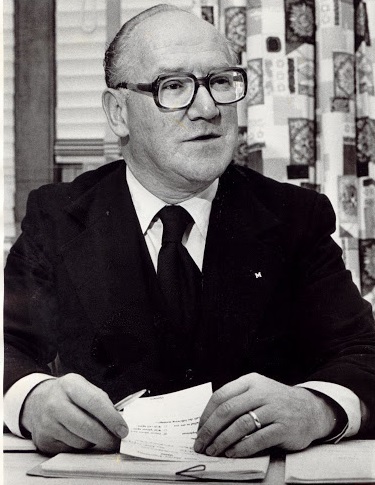
Edmund Morris
During the meeting we presented Mr. Morris with the history of the property and other information. The meeting ended with the Minister providing assurances that he would give the matter a thorough review and get back to me. After several months, another meeting was arranged, where Morris informed me that he would lend his full support to finding a way to overcome this historical injustice. He was true to his word throughout the negotiations.
We then turned the matter over to the Department of the Attorney General for Nova Scotia and to the federal Department of Justice for legal opinions. They got back to Morris and me with opinions that it would be difficult, if not impossible, to solve the problem.
In late 1985 another meeting was arranged between the parties where a solution to the problem was identified. At this meeting, Morris and I, neither of us members of the legal profession, concluded that, given the resources of both levels of government and their legislative powers, it was inconceivable that clearing the title for one hundred acres of land should pose an insurmountable problem. We thus explored several options and settled upon a simple solution. Lawyers were instructed to work out the terms for a federal-provincial agreement that would have the province expropriate the property and thus clear the title. In early 1986 the Band Council gave their full support for this proposed solution. Lawyers for both levels of government reviewed the proposal, found it workable and began to work out the details.
On November 12, 1986, I wrote a letter to Lands, Revenues and Trusts Regional Director Reg Graves of Indian Affairs, informing him of our solution and asking that it be processed. They did.
After five years of aggravation for me, and decades of consternation for the Band, an agreement was finally worked out between the two levels of government. On November 1, 1988, after expropriating the land, the province transferred it by order-in-council to the federal government. The federal government then spent another twenty-three months trying to determine whether the same farmer who had in the past blocked the clearance of title by tax sale, purely to attempt to grab the property for himself, had a legal right-of-way over the property. Anyone familiar with the Department's track record for settling similar problems will appreciate that its foot-dragging at the end of this project was par for the course.
Finally, on August 28, 1990, the following order-in-council was issued by the federal government's Privy Council:
WHEREAS Her Majesty in the right of the Province of Nova Scotia, by Nova Scotia Order in Council No. 88-1185 dated November 1, 1988, transferred the administration and control of the land described in the schedule hereto to Her Majesty in right of Canada.
THEREFORE HIS EXCELLENCY, the governor general in council, on the recommendation of the Minister of Indian Affairs and Northern Development, is pleased hereby to accept the transfer from Her Majesty in right of the Province of Nova Scotia of the administration and control of the land described in the schedule hereto and to set apart the said land for the use and benefit of the Afton Band of Indians as a reserve to be known as Summerside Indian Reserve No. 38
Sadly, before the transaction was finalized, Chief Peter Perro died in office on June 29, 1989, age of 73. After spending more than half of his lifetime in pursuit of this goal, he never saw it reached. Reserve status for the property is a tribute to Peter's tenacity. Coincidentally, his beloved wife Sofie died on the same day. Hats off to a man who believed in the justice of his pursuit, may him and his beloved Sofie rest in peace for eternity in the Land of souls!
To honour Peter for what he did by keeping the Summerside land matter front and center for the members of his community, and as an acknowledgment that without his effort the land, with sacred meaning for the Mi'kmaq and his community, may have been lost to the Band by the efforts of outside forces, the Band Council might consider renaming Summerside Indian Reserve No. 38 to Peter Perro Indian Reserve No. 38.
|





